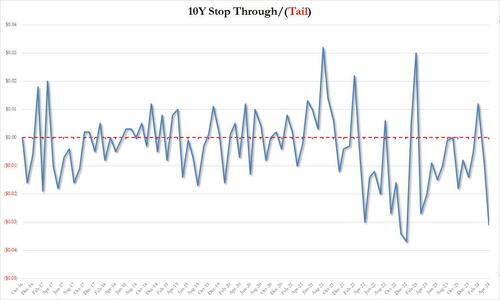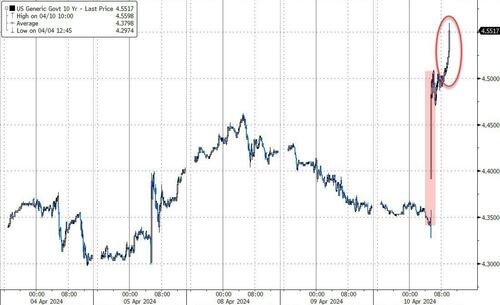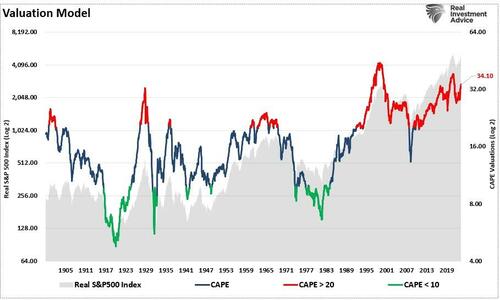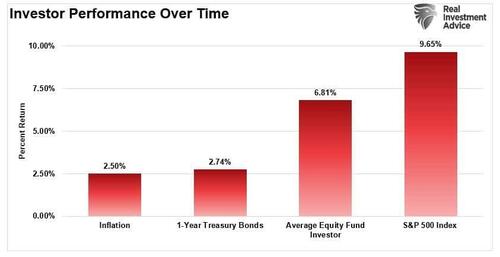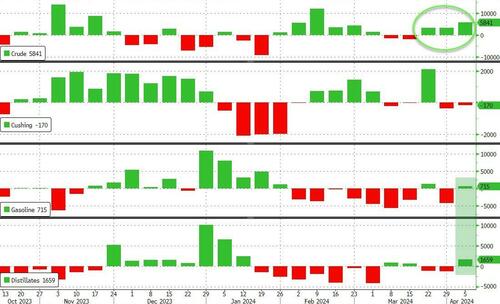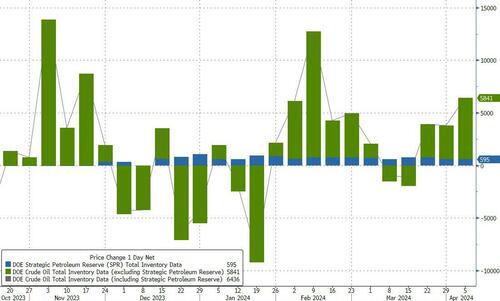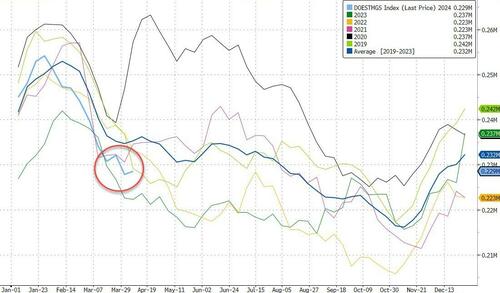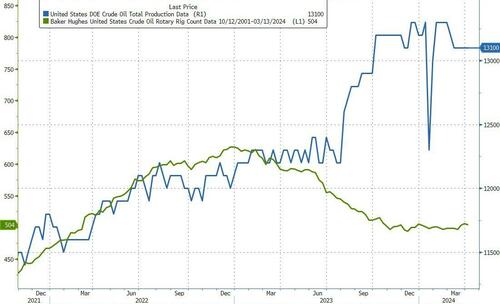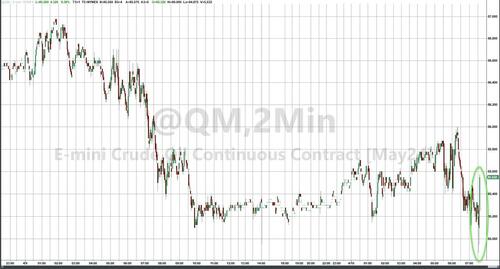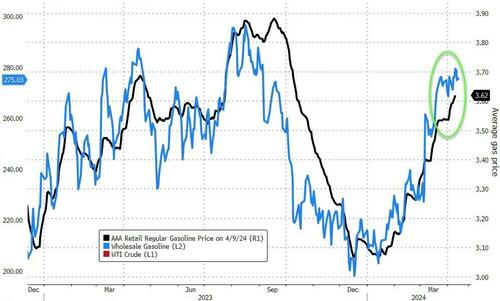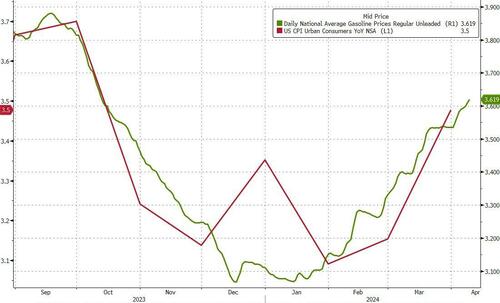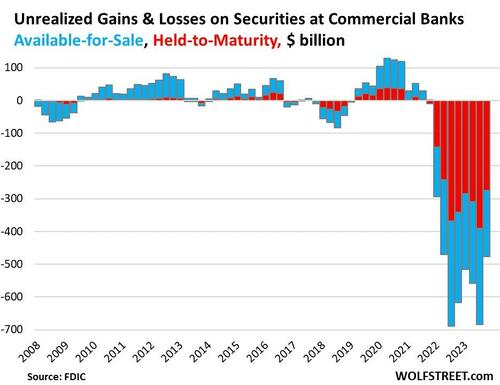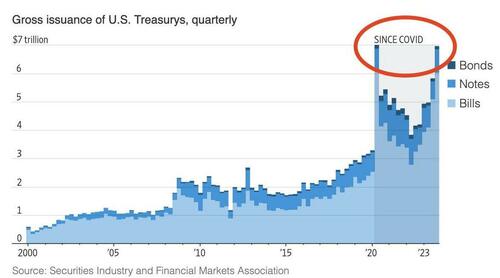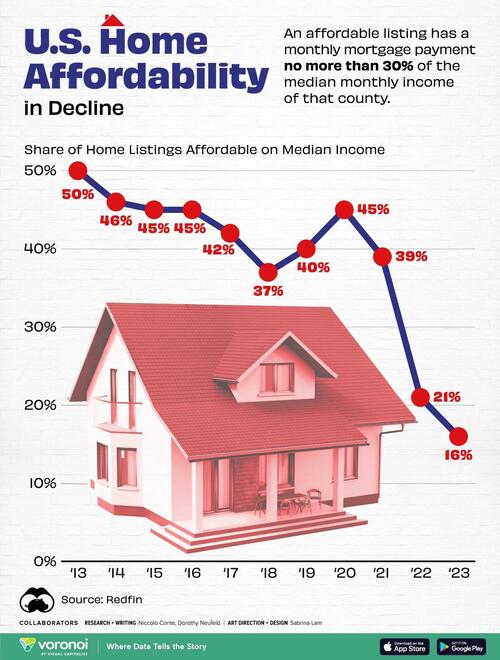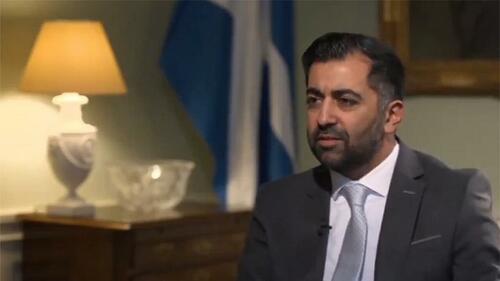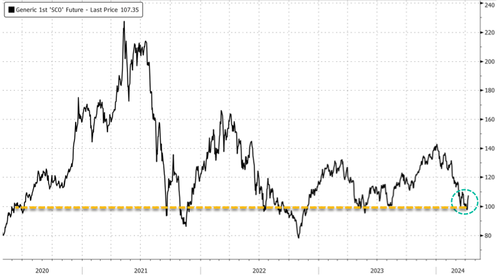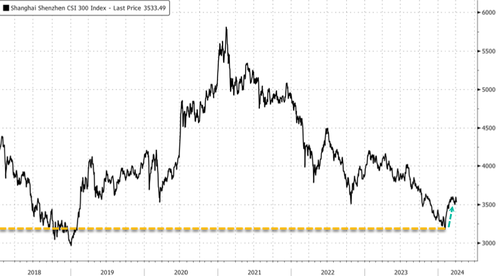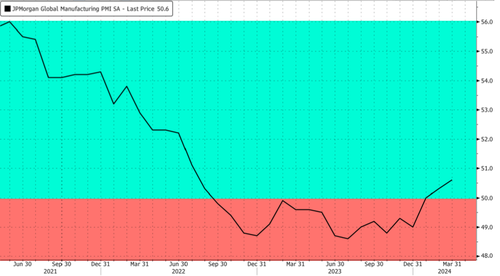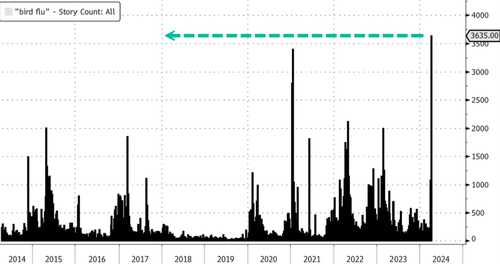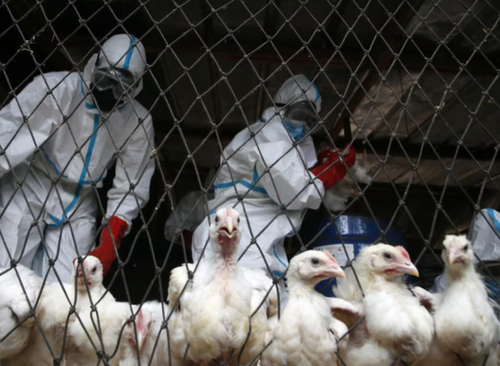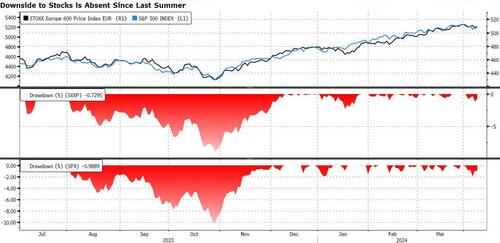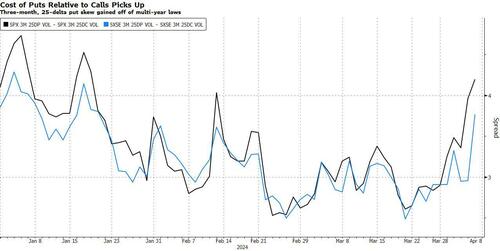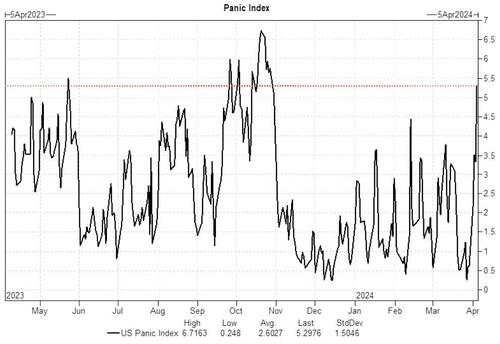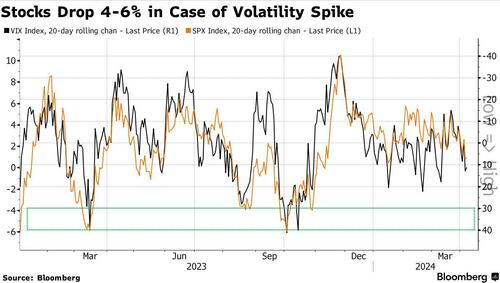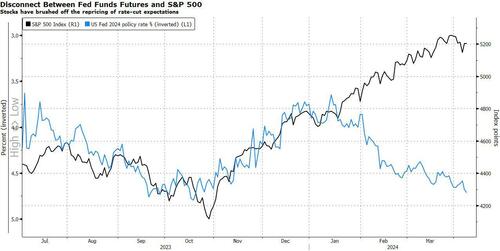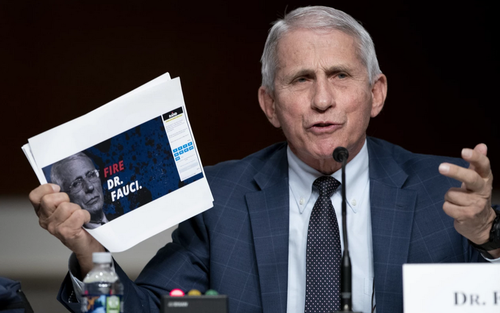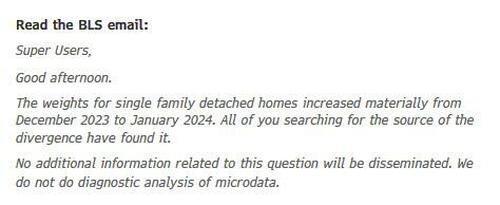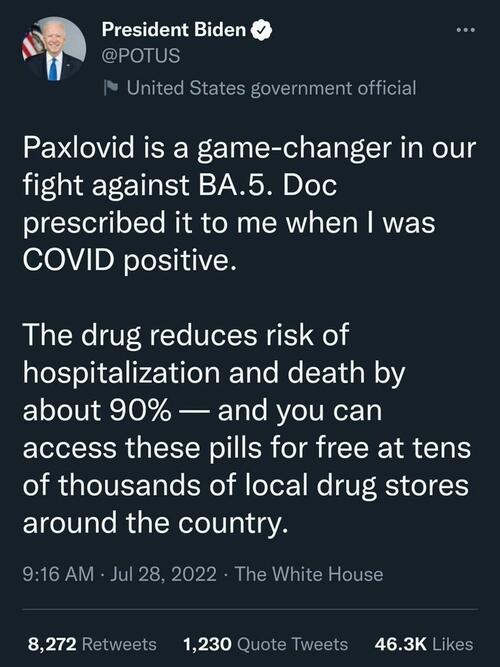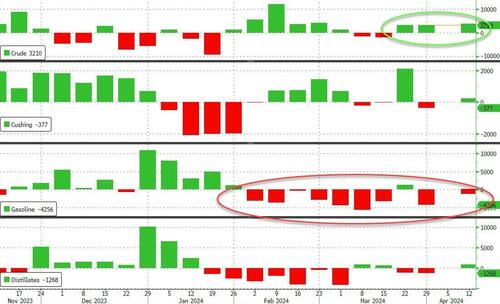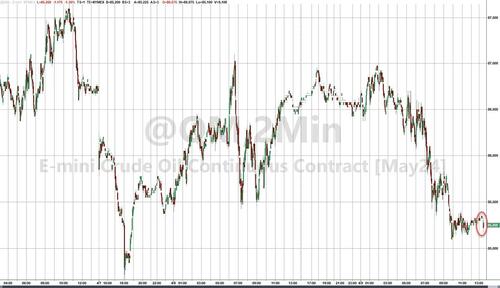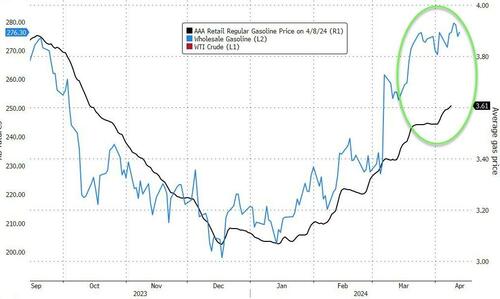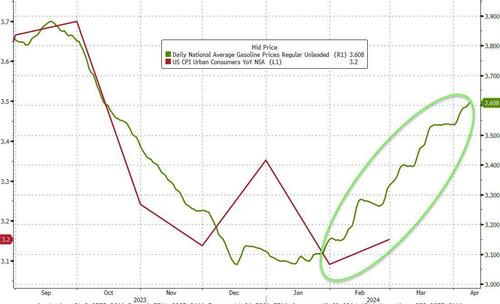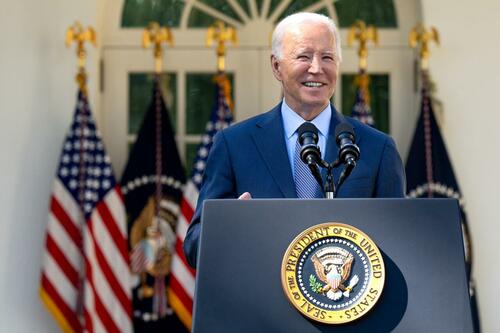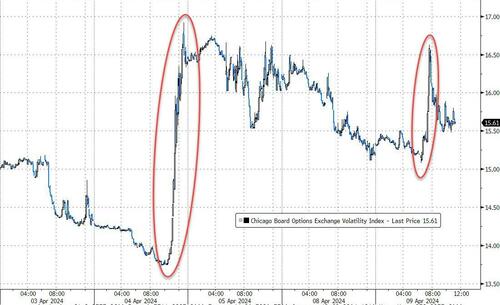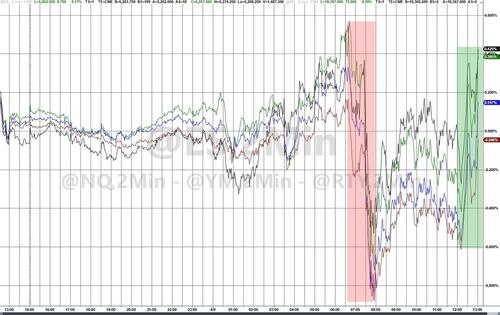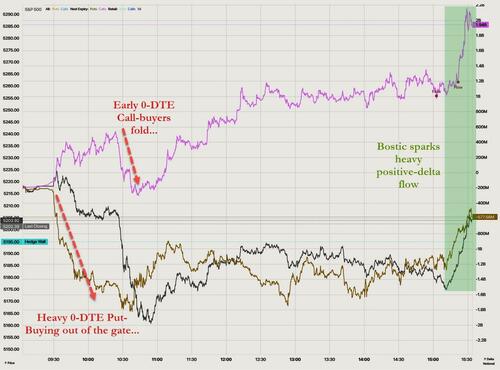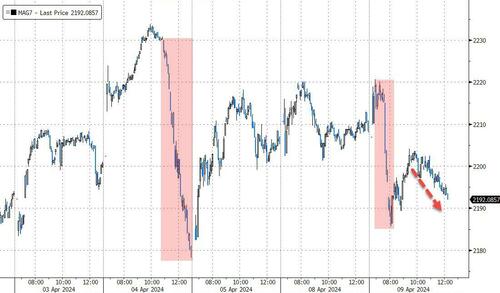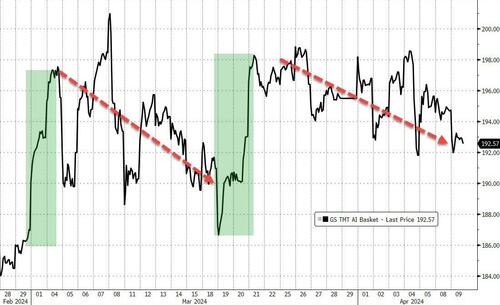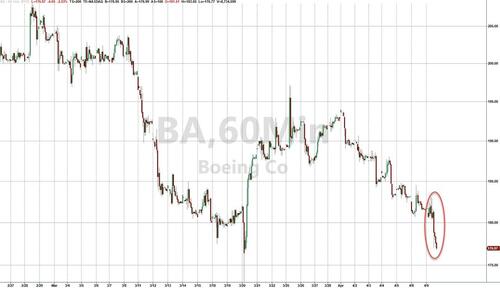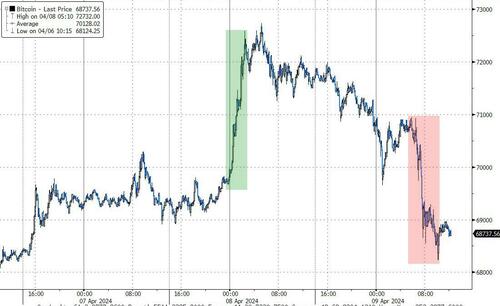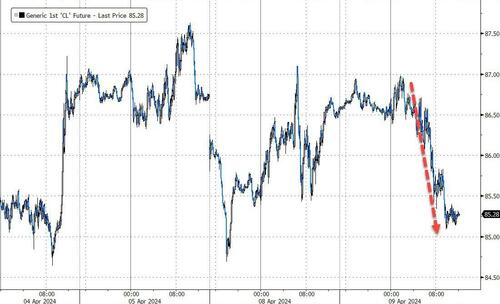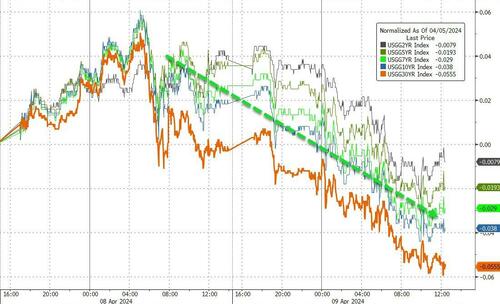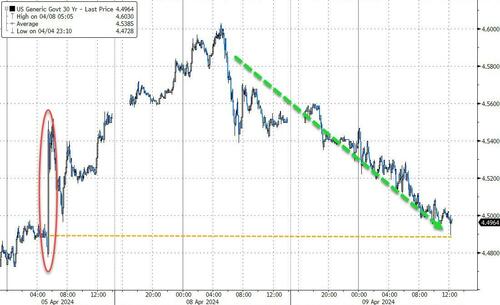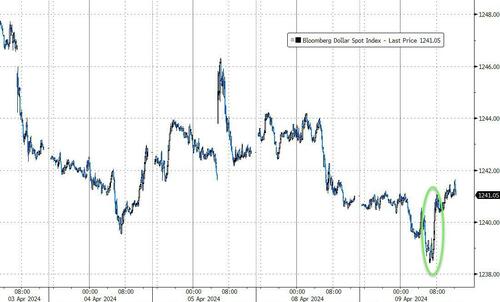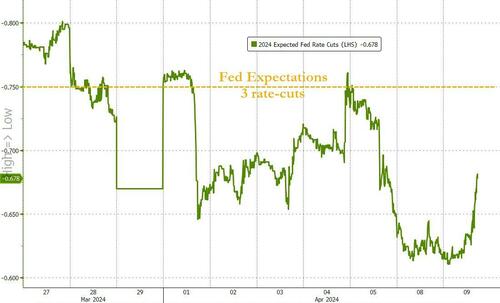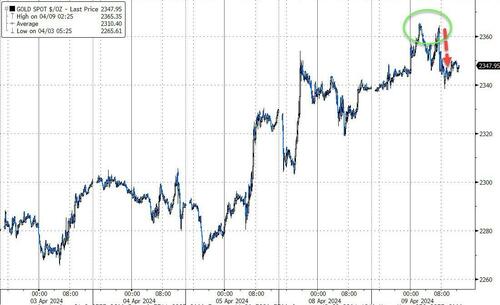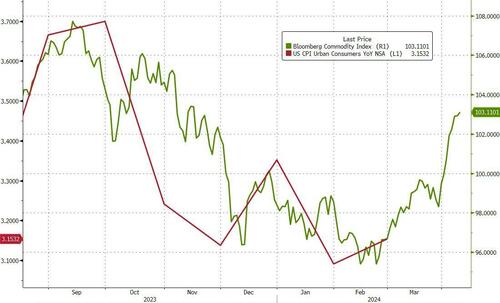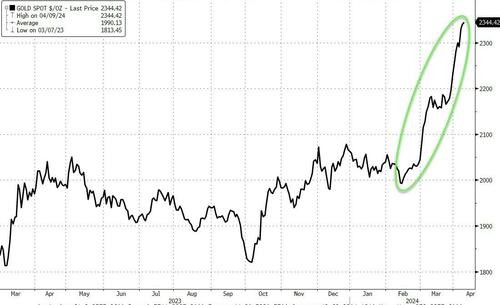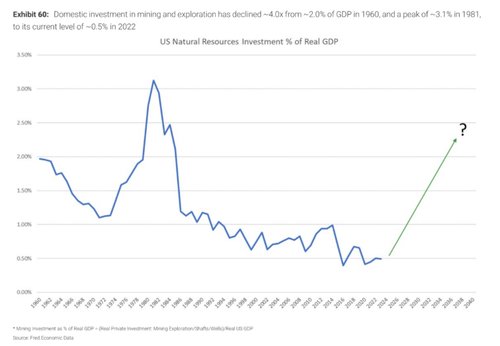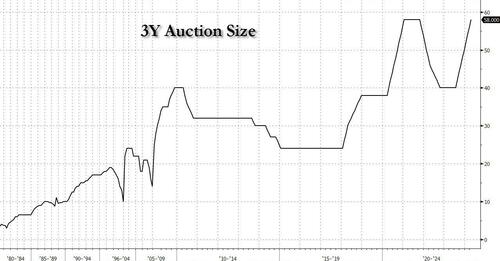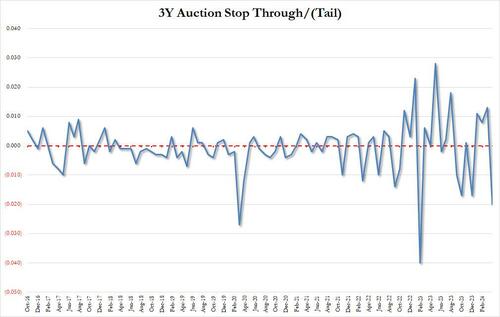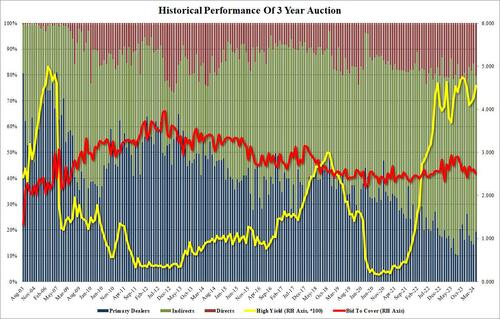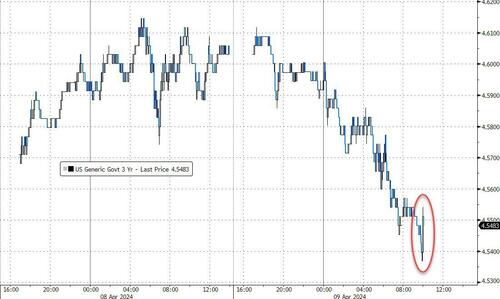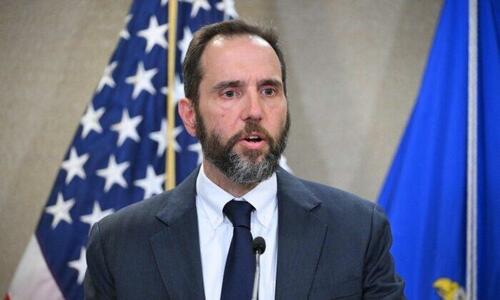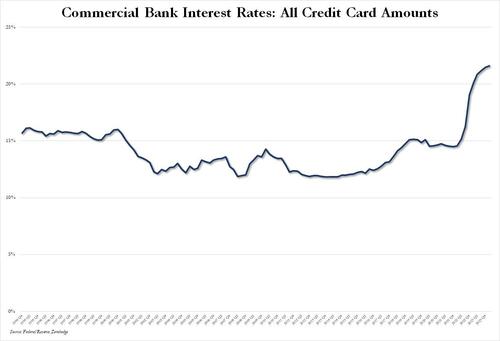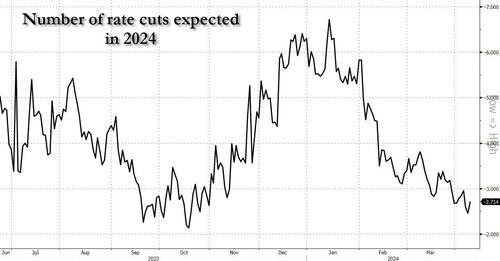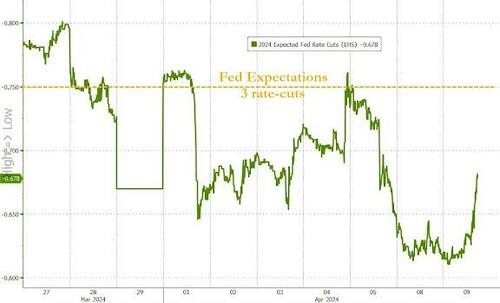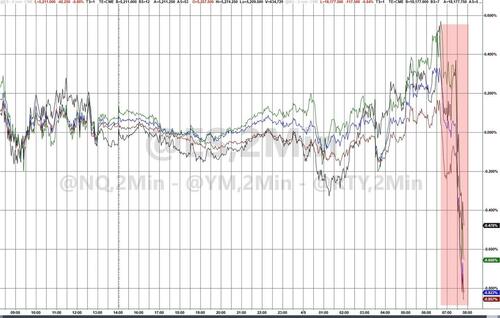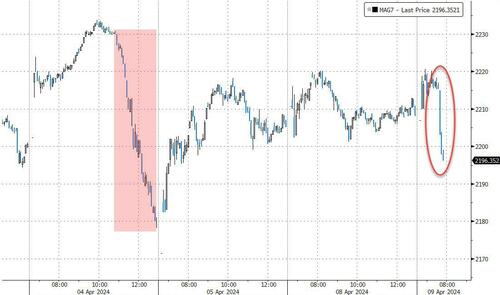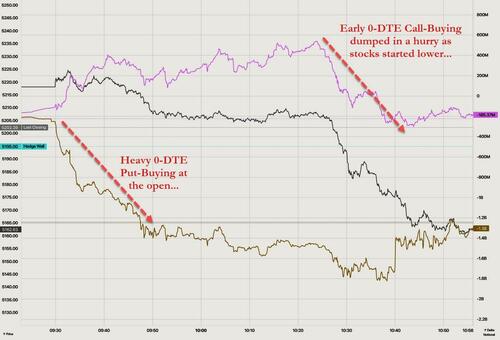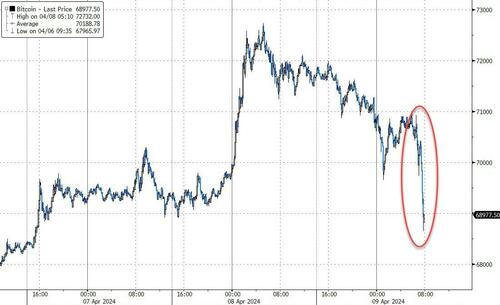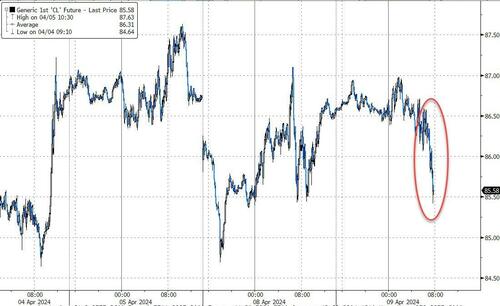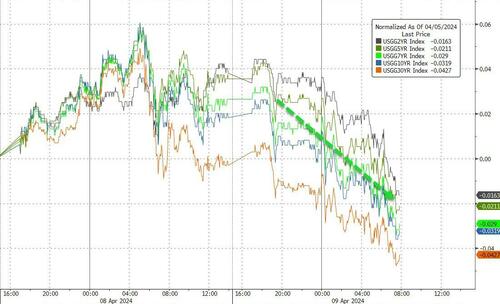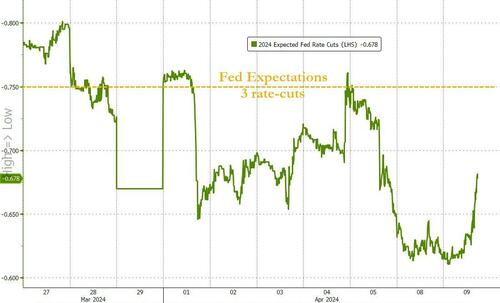The Eucharist is "the source and summit of the Christian life."
Distinction Matter - Subscribed Feeds
-
Site: Zero HedgeYields Soar After Catastrophic 10Y Auction Shocks With 3rd Biggest Tail On RecordTyler Durden Wed, 04/10/2024 - 13:20
Earlier today we said that while the CPI report would be the day's main highlight, the real shocker should inflation come in hot, would be today's 10Y treasury auction. And when the Treasury sold $39 billion in a 9-Year 11-Month reopening moments ago, all hell broke loose.
Stopping at a high yield of 4.560%, this was not only almost 40bps higher than last month's 4.166% and the highest since October, it also tailed the 4.529% When Issued by a whopping 3.1bps, a surge compared to last month's tail of just 0.9bps, but also the highest tail since the 3.7bps in Dec 2022 and also the third largest tail on record!
But wait, there's more: the Bid to Cover in today's auction tumbled to just 2.336, down from 2.512 in March and the lowest since Dec 2022; it was also well below the recent average of 2.49.
The internals were even uglier, with foreign buyers tumbling from an already low 64.3% to 61.8% the lowest since Oct 23 and far below the six-auction average of 65.9; and with Directs also sliding to just 14.2%, the lowest since Nov 21, Dealers ended up stepping up bigly and taking down a whopping 24.0%, the highest since November 22.
The market reaction was instantaneous and brutal with 10Y yields, already trading at session and 2024 highs, spiking by 6 bps to another day high of 4.56%, and fast approaching a level where not only stocks will tumble but the entire economy collapses as it grinds to a halt, similar to where Biden's approval rating will be in the very near future.
-
Site: Zero HedgeInvesting Lessons From Your MotherTyler Durden Wed, 04/10/2024 - 13:05
Authored by Lance Roberts via RealInvestmentAdvice.com,
Your mother likely imparted valuable investing lessons you may not have known. With Mother’s Day approaching and bullish market exuberance present, such is an excellent time to revisit the investing lessons she taught me.
Personally, when I was growing up, my Mother had a saying, or an answer, for almost everything… as most mothers do. Every answer to the question “Why?” was immediately met with the most intellectual of answers:
“…because I said so”.
Seriously, my Mother was a resource of knowledge that has served me well over the years, and it wasn’t until late in life that I realized that she had taught me, unknowingly, valuable investing lessons to keep me safe.
So, by imparting her secrets to you, I may be violating some sacred ritual of motherhood knowledge, but I felt it was worth the risk of sharing the knowledge that has served me well.
1) Don’t Run With Sharp Objects!
It wasn’t hard to understand why she didn’t want me to run with scissors through the house – I think I did it early on to watch her panic. However, later in life, when I got my first apartment, I ran through the entire place with a pair of scissors, left the front door open with the air conditioning on, and turned every light on in the house.
That rebellion immediately stopped when I received my first electric bill.
Sometime in the mid-90s, the financial markets became a casino as the internet age ignited a whole generation of stock market gamblers who thought they were investors. There is a vast difference between investing and speculating; knowing the difference is critical to overall success.
A solid investment strategy combines defined goals, an accumulation schedule, allocation analysis, and, most importantly, a defined sell strategy and risk management plan.
Speculation is nothing more than gambling. If you are buying the latest hot stock, chasing stocks that have already moved 100% or more, or just putting money in the market because you think you “have to,” you are gambling.
The most important thing to understand about gambling is that success is a function of the probabilities and possibilities of winning or losing on each bet.
In the stock market, investors continue to play the possibilities instead of the probabilities. The trap comes with early success in speculative trading. Success breeds confidence, and confidence breeds ignorance. Most speculative traders tend to “blow themselves up” because of early success in their speculative investing habits.
When investing, remember that the odds of making a losing trade increase with the frequency of transactions. Just as running with a pair of scissors, do it often enough, and eventually, you could end up hurting yourself.
2) Look Both Ways Before You Cross The Street.
I grew up in a small town, so crossing the street wasn’t as dangerous as in the city. Nonetheless, she yanked me by the collar more than once as I started to bolt across the street, seemingly anxious to “find out what’s on the other side.” It is essential to understand that traffic does flow in two directions. If you only look in one direction, you will get hit sooner or later.
Many people want to classify themselves as a “Bull” or a “Bear.” The savvy investor doesn’t pick a side; he analyzes both sides to determine what the best course of action in the current market environment is most likely to be.
The problem with the proclamation of being a “bull” or a “bear” means that you are not analyzing the other side of the argument and that you become so confident in your position that you tend to forget that “the light at the end of the tunnel…just might be an oncoming train.”
It is an essential part of your analysis, before you invest in the financial markets, to determine not only “where” but also “when” to invest your assets.
3) Always Wear Clean Underwear
This was one of my favorite sayings from my Mother because I always wondered about the rationality of it. I always figured that even if you wore clean underwear before an accident, you’re still likely left without clean underwear following it.
The investing lesson is: “You are only wrong – if you stay wrong.“
However, being an intelligent investor means always being prepared in case of an accident. That means simply having a mechanism to protect you when you are wrong with an investment decision.
You will notice that I said “when you are wrong” in the previous paragraph. Many of your investment decisions will likely turn out wrong. However, cutting those wrong decisions short and letting your right decisions continue to work will make you profitable over time.
Any person who tells you about all the winning trades he has made in the market – is either lying or hasn’t blown up yet.
One of the two will be true – 100% of the time.
Understanding the “risk versus reward” trade-off of any investment is the beginning step to risk management in your portfolio. Knowing how to mitigate the risk of loss in your holdings is crucial to your long-term survivability in the financial markets.
4) If Everyone Jumped Off The Cliff – Would You Do It Too?
Every kid, at one point or another, has tried to convince their Mother to allow them to do something through “peer pressure.” I figured if she wouldn’t let me do what I wanted, she would bend to the will of the imaginary masses. She never did.
“Peer pressure” is one of the biggest mistakes investors repeatedly make. Chasing the latest “hot stocks” or “investment fads” that are already overvalued and are running up on speculative fervor always ends in disappointment.
Investors buy stocks that have moved significantly off their lows in the financial markets because they fear “missing out.” This is speculating, gambling, guessing, hoping, praying – anything but investing. Generally, when the media begins featuring a particular investment, individuals have already missed the major part of the move. By that point, the probability of a decline began to outweigh the possibility of further rewards.
The investing lesson is to be aware of the “herd mentality.” Historically, investors tend to run in the same direction until that direction falters. The “herd” then turns and runs in the opposite direction. This continues to the detriment of investors’ returns over long periods.
This is also generally why investors wind up buying high and selling low. To be a long-term successful investor, you must understand the “herd mentality” and use it to your benefit – getting out from in front of the herd before you are trampled.
So, before you chase a stock that has already moved 100% or more, figure out where the herd may move to next and “place your bets there.” This takes discipline, patience, and a lot of homework, but you will often be rewarded for your efforts.
5) Don’t Talk To Strangers
This is just good, solid advice all the way around. Turn on the television, any time of the day or night, and it is the “Stranger’s Parade of Malicious Intent.” I don’t know if it is just me or if the media only broadcasts news revealing human depravity’s depths. Still, sometimes, I wonder if we are not due for a planetary cleansing through divine intervention.
However, back to investing lessons, getting your stock tips from strangers is a sure way to lose money in the stock market. Your investing homework should NOT consist of a daily regimen of CNBC, followed by a dose of Grocer tips, capped off with a financial advisor’s sales pitch.
To succeed in the long run, you must understand investing principles and the catalysts to make that investment profitable. Remember, when you invest in a company, you buy a piece of it and its business plan. You are placing your hard-earned dollars into the belief that the individuals managing the company have your best interests at heart. The hope is they will operate in such a manner as to make your investment more valuable so that it may eventually be sold to someone else for a profit.
This also embodies the “Greater Fool Theory,” which states that someone will always be willing to buy an investment at an ever higher price. The investing lesson is that, in the end, someone is always left “holding the bag.” The trick is to ensure that it isn’t you.
Also, you must be aware of this when getting advice from the “One Minute Money Manager” crew on television. When an “expert” tells you about a company you should be buying, remember he already owns it and most likely will be the one selling his shares to you.
6) You Either Need To “Do It” (polite version) Or Get Off The Pot!
When I was growing up, I hated to do my homework, which is ironic since I now do more homework than I ever dreamed of in my younger days. Since I wouldn’t say I liked doing homework, school projects were rarely started until the night before they were due. I was the king of procrastination.
My Mom was always there to help, giving me a hand and an ear full of motherly advice, usually consisting of many “because I told you so…”
Interestingly, many investors tend to watch stocks for a very long period, never acting on their analysis but idly watching as their instinct proves correct and the stock rises in price.
The investor then feels that they missed his entry point and decides to wait, hoping the stock will go back down one more time so that he can get in. The stock continues to rise. The investor continues to watch, becoming more frustrated until he finally capitulates on his emotion and buys the investment near the top.
The investing lesson is to be aware of the dangers of procrastination. On the way up and down, procrastination is the precursor of emotional duress derived from the loss of opportunity or the destruction of capital.
However, if you do your homework and can build a case for the purchase, don’t procrastinate. If you miss your opportunity for the correct entry into the position – don’t chase it. Leave it alone, and come back another day when ole’ Bob Barker is telling you – “The Price Is Right.”
7) Don’t Play With It – You’ll Go Blind
Well…do I need to go into this one? All I know for sure is that I am not blind today. What I will never know for sure is whether she believed it or if it was just meant to scare the hell out of me.
However, kidding aside, the investing lesson is that when you invest in the financial markets, it is very easy to lose sight of your intentions in the first place. Getting caught up in the hype, getting sucked in by the emotions of fear and greed, and generally being confused by the multitude of options available can cause you to lose your focus.
Always return to the basic principle you started with. That goal was to grow your small pile of money into a much larger one.
Putting It All Together
My Dad once taught me a fundamental investing lesson as well: KISS: Keep It Simple Stupid.
This is one of the best investment lessons you will ever receive. Too many people try to outsmart the market to gain a small, fractional increase in return. Unfortunately, they take disproportionate risks, often leading to negative results. The simpler the strategy is, the better the returns tend to be. Why? There is better control over the portfolio.
Designing a KISS portfolio strategy will help ensure that you don’t get blinded by continually playing with your portfolio and losing sight of what your original goals were in the first place.
- Decide what your objective is: Retirement, College, House, etc.
- Define a time frame to achieve your goal.
- Determine how much money you can “realistically” put toward your monthly goal.
- Calculate the return needed to reach your goal based on your starting principal, the number of years to your goal, and your monthly contributions.
- Break down your goal into achievable milestones. These milestones could be quarterly, semi-annual, or annual and will help ensure you are on track to meet your objective.
- Select the appropriate asset mix that achieves your required results without taking on excess risk that could lead to more significant losses than planned.
- Develop and implement a specific strategy to sell positions during random market events or unexpected market downturns.
- If this is more than you know how to do – hire a professional who understands essential portfolio and risk management.
There is much more to managing your portfolio than just the principles we learned from our Mothers. However, this is a start in the right direction, and if you don’t believe me – just ask your Mother.
-
Site: Zero HedgePlagiarism Scandal Hits The FedTyler Durden Wed, 04/10/2024 - 12:45
Another week, another plagiarism scandal in the ivory towers.
This time, journalists Chris Rufo and the Daily Wire's Luke Rosiak found that Federal Reserve governor Lisa Cook appears to have plagiarized her academic work in violation of her former university's policy.
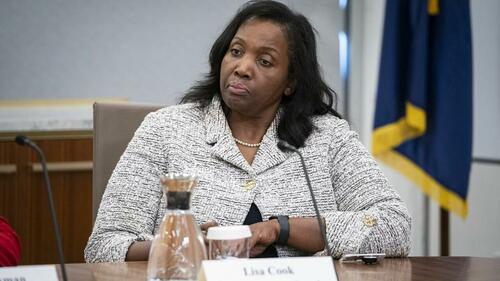 Lisa Cook, governor of the US Federal Reserve. Photographer: Al Drago/Bloomberg
Lisa Cook, governor of the US Federal Reserve. Photographer: Al Drago/Bloomberg
Cook, who taught economics at Harvard and Michigan State before serving on the Obama administration's Council of Economic Advisers, went on to be appointed to the Federal Reserve Board of Governors in 2022. At the time, her academic record was so thin - and focused on race activism vs. 'rigorous, quantitative econ,' that she had trouble getting confirmed by the Senate (her nomination required VP Kamala Harris to cast a tie-breaking vote).
According to Rufo, "in a series of academic papers spanning more than a decade, Cook appears to have copied language from other scholars without proper quotation and duplicated her own work and that of coauthors in multiple academic journals, without proper attribution." (Click into the below thread on X for more examples).
In "The Antebellum Roots of Distinctively Black Names," Cook copied-and-pasted verbatim language from Calomiris and Pritchett, without using quotation marks when describing their findings, as required by her own university’s written policy. pic.twitter.com/1KwWCtTntU
— Christopher F. Rufo ⚔️ (@realchrisrufo) April 10, 2024According to Michigan State's own policy on plagiarism, Cook is a plagiarist. In the past, administrators have warned students that "plagiarism is considered fraud and has potentially harsh consequences including loss of job, loss of reputation, and the assignation of reduced or failing grade in a course."
Cook's work is littered with these and other instances of plagiarism and self-plagiarism, according to MSU's policy. Some of the instances are minor, perhaps signifying sloppiness, but others are much more troubling, rising to apparent misconduct. pic.twitter.com/zoqwfVEX4Y
— Christopher F. Rufo ⚔️ (@realchrisrufo) April 10, 2024Cook duplicates long passages verbatim without quotation or proper attribution, changing minor words and punctuation.
Cook's most famous "economics" paper is about how the number of black inventors purportedly plummeted suddenly in 1900 due to racism. In reality, one of the largest data sets of inventions Cook was relying on simply ended in that year.
— Luke Rosiak (@lukerosiak) April 10, 2024What's more, Cook's rigor has also come under fire and she misrepresented her own credentials. As Rufo and Rosiak write in City Journal and the Daily Wire:
Her most heralded work, 2014’s “Violence and Economic Activity: Evidence from African American Patents, 1870 to 1940,” examined the number of patents by black inventors in the past, concluding that the number plummeted in 1900 because of lynchings and discrimination. Other researchers soon discovered that the reason for the sudden drop in 1900 was that one of the databases Cook relied on stopped collecting data in that year. The true number of black patents, one subsequent study found, might be as much as 70 times greater than Cook’s figure, effectively debunking the study’s premise.
Cook also seems to have consistently inflated her own credentials. In 2022, investigative journalist Christopher Brunet pointed out that, despite billing herself as a macroeconomist, Cook had never published a peer-reviewed macroeconomics article and had misrepresented her publication history in her CV, claiming that she had published an article in the journal American Economic Review. In truth, the article was published in American Economic Review Papers and Proceedings, a less prestigious, non-peer-reviewed magazine.
When asked for comment, Cook told the journalists: "I certainly am proud of my academic background."
As Rufo and Rosiak note in closing (emphasis ours):
Cook is no stranger to mobilizing such punishments against others. In 2020, she participated in the attempted defenestration of esteemed University of Chicago economist Harald Uhlig for the crime of publicly opposing the “defund the police” movement. She called for Uhlig’s removal from the classroom, claiming that he had made an insensitive remark about Martin Luther King, Jr. (The university closed its own inquiry after concluding that there was “not a basis” to investigate further.) Uhlig, in a 2022 op-ed for the Wall Street Journal, asked the pertinent question: Under the leadership of an ideologue such as Lisa Cook, would the Fed continue to pursue its mandate, or succumb to left-wing activism?
Time will tell if the gears of justice turn against Lisa Cook, or if repeated academic misconduct, defended by some as mere sloppiness or isolated mistakes, is fast becoming an acceptable part of the academic order—as long as the alleged author of that behavior is favored by the powerful.
-
Site: Zero HedgePump-Prices Continue To Surge, Gasoline Inventories See Small BuildTyler Durden Wed, 04/10/2024 - 10:38
Crude prices slid back to unchanged this morning - from some overnight gains - after a hotter than expected CPI print took demand-seducing rate-cuts off the table.
However, as Bloomberg reports, oil is still up 19% this year as OPEC+ cuts supply and geopolitical tensions across the Middle East create strong tailwinds. The market is bracing for Iran’s response to a suspected Israeli attack on its consulate in Syria last week, and top traders have been striking an increasingly bullish tone in recent days.
API reported a sizable crude build and another gasoline draw - all eyes will be on the official data for any confirmation.
API
-
Crude +3.03mm (+800k exp)
-
Cushing +124k
-
Gasoline -609k (-1.4mm exp)
-
Distillates +120k (-600k exp)
DOE
-
Crude +5.84mm (+800k exp)
-
Cushing -170k
-
Gasoline +715k (-1.4mm exp)
-
Distillates +1.66mm (-600k exp)
Bigger than expected crude build surprised traders but a build in gasoline stocks was probably the most notable aspect of the report...
Source: Bloomberg
In aggregate, this is a pretty chunky nationwide inventory build. Total crude and product stockpiles climbed by 12 million barrels, excluding SPR last week. That’s the biggest weekly gain since July last year. In addition to crude build, there were also increases in the other oils category, as well as gasoline, jet fuel and diesel.
The Biden admin added 595k barrels to the SPR last week...
Source: Bloomberg
US gasoline stockpiles, which have plunged to the lowest levels this year, though they remain above the same period last year.
Source: Bloomberg
US Crude production was flat at 131.mm b/d, near record highs...
Source: Bloomberg
WTI was hovering around $85.25 ahead of the official data, dipped on the data then rallied higher...
Meanwhile, pump-prices continue to rise, as we expected, tracking wholesale gasoline prices higher...
Source: Bloomberg
...and if you think this morning's CPI was hot, with the highest pump-prices in six-months, just wait for next month...
Source: Bloomberg
Not at all what President Biden wanted to see, but we are sure it's all 'mom and pop' retail gas station owners' greed that is driving this!!!
-
-
Site: Zero HedgeTreasury Debt - Pristine Collateral Or A Red FlagTyler Durden Wed, 04/10/2024 - 06:30
Via Charts and Parts Substack,
Intro
Spoiler alert: we have another red flag in the treasury market.
The latest talk is to eliminate treasury holdings from the SLR (Supplemental Liquidity Ratio) calculation, which is used to determine how much banks need to set-aside to help “manage risk”.
Seen This Show Before
The Covid crisis brought about market chaos. To manage the steep and fast decline, The Fed jumped into action and cut rates to zero and birthed QE infinity. They also eliminated the banks’ reserve requirements. The rule sounds just like it reads: banks no longer had to hold any reserves against deposit liabilities. We already know there is nothing more permanent than a temporary government program, so this reckless policy still exists today.
We’ll remind our readers that we try to over-simply to make a point. The system and web of rules are extremely complex, especially when it comes to the plumbing of the treasury market.
Another handout occurred last year when we witnessed more bank failures than the 2008 GFC (Great Financial Crisis). The big accommodative move to save the system was to allow banks to mark their (treasury) bond portfolio at “par” (100%), to avoid taking portfolio losses. This was timely and convenient, as the TLT (Treasury Bond ETF) lost roughly 30% in 2022. As a result of the 2022 bond market route (worst ever), the system is stuck with a pile of losses on the books.
Liquidity vs. Transparency
All these rule changes are meant to help “liquify” the system, thus reduce the odds of a systematic shock of sorts. But these new rules come at the expense of transparency. We’re never quite sure who is holding what, thus we can lose track of where the land mines reside.
By allowing banks to not “mark-to-market” we lose transparency and more importantly, we lose more price discovery. Because the government buys their own bonds, long ago we lost price discovery of the most important price of all - interest rates: the price of “money”.
For 10-years we saw interest rates manipulated lower as debts and deficits soared ever higher. This meant that the US (and many other countries) were able to borrow at cheaper and cheaper rates, even as their debts and deficits were ballooning. We will reiterate a favorite C&P quote from a recent presentation, “This is an amazingly simple divergence (rates lower and debt higher) that defies every rule, concept, and bit of logic in financial markets.”
Third Times a Charm
The new SLR rule change could allow banks to be an endless buyer of treasury debt.
Through that lens, this rule makes a lot of sense. Especially as treasury issuance is testing the Covid highs even though the emergency is long gone.
Said another way, we supposedly have a strong economy, yet the Treasury is selling/issuing bonds at a rate last seen during the Covid crisis.
The Close
How convenient for the banks -- to be able to buy treasuries, take no haircut, and not have to worry about mark-to-market losses. All just in time, as issuances are taking on a life of their own.
It is also worth noting that our deeper dive into The Great Taking revealed that the bond market is also fractionalized (not enough to go around/some bonds held on the books by more than one owner).
It sounds like a risky proposition to keep calling our government bonds “pristine collateral”, “risk-free”, or a “safe-haven asset”.
-
Site: Zero HedgeVisualizing America's Shortage Of Affordable HomesTyler Durden Wed, 04/10/2024 - 05:45
A large share of affordable homes vanished over the pandemic, leading the supply to hit its lowest level on record in 2023.
Many buyers have become priced out of the market due to soaring home prices and high interest rates. Last year alone, the number of affordable homes shrank by almost 41%, equal to over 243,000 properties.
This graphic, via Visual Capitalist's Dorothy Neufeld, shows the dwindling supply of affordable U.S. homes, based on data from Redfin.
The Sharp Decline in Housing Affordability
In 2023, only 16% of homes were affordable in America, falling from 21% in the year before.
An affordable listing was defined as one with a monthly mortgage payment no more than 30% of the median monthly income of that county. Below, we show the share of affordable listings in the 97 biggest U.S. metropolitan areas by population:
As the above table shows, housing affordability has grown increasingly out of reach as mortgage rates have more than doubled in just two years.
While affordable homes made up 39% of the market in 2021, the share dropped precipitously as interest rates climbed higher. In 2023, the average annual 30-year fixed mortgage rates reached 6.81%—hitting its highest level in 20 years.
Although mortgage rates may decline over the year if the Federal Reserve cuts interest rates, it may not be enough to boost the supply of affordable housing.
That’s because rates may not fall sharply enough to undo the “golden hand-cuff” effect, where homeowners are reluctant to sell in order to hold on to their low mortgage rates. Adding to this, home construction has fallen significantly since the global financial crisis. During this time, home builders and lenders became increasingly cautious, leading home construction to drop 55% between 2006 and 2021.
What Comes Next?
The good news is that new-home construction is forecast to increase in 2024, with single-family housing starts projected to grow 4.7%.
While new home sales have historically comprised 10-12% of the single-family home market, they have recently surged to 30% due to the collapsing supply of existing homes. But even as new supply enters the market, it will likely take a number of years for housing affordability return to historical levels.
In fact, JP Morgan suggests that it could take two years if mortgage rates drop by 1 percentage point, assuming that home prices remained at all-time highs and wages continued rising at their current pace.
-
Site: Zero HedgeSwitzerland "Violated Human Rights" By Not Tackling Climate-Change Quickly Enough, ECHR Rules In Landmark CaseTyler Durden Wed, 04/10/2024 - 05:00
Authored by Thomas Brooke via ReMix News,
National governments are infringing on citizens’ human rights by not doing enough to tackle climate change, the European Court of Human Rights has held in a landmark ruling that could have far-reaching consequences and influence climate policy across the continent.
In a highly-anticipated judgment, the Strasbourg court on Tuesday sided with a group of Swiss pensioners who brought a claim against their national government for its perceived failure to act sufficiently in reducing carbon emissions, claiming that existing climate policy was violating their human rights.
The members of the KlimaSeniorinnen group, supported by environmental campaign groups such as Greenpeace, argued that elderly citizens are particularly vulnerable to the effects of climate change, citing the fact that excess deaths occur more regularly among the elderly during periods of extreme heat because they are less able to regulate their body temperature.
The group also claimed that heat waves impact the mental well-being of elderly citizens more because they are less able to go outside and withstand the heat, which they argue affects their quality of life.
The association relied on Article 2 of the European Convention on Human Rights, which protects the general right to life, and Article 8, which guarantees the right to private and family life.
Domestic governments are obliged to take “reasonable and appropriate measures” to secure these rights, steps members of the KlimaSeniorinnen group claimed the Swiss government had not taken.
The litigation had been appealed by the group up to the top human rights court in Europe after its claim was rejected first by the Federal Administrative Court in Switzerland and then by the Federal Supreme Court, the country’s highest ruling body.
The judgment is the third of three similar cases the court was asked to consider in respect to the correlation between climate change and human rights and sets a precedent that all national courts in Council of Europe member states will be required to adhere to.
It had recently dismissed the other two cases, brought by Portuguese youths and a former French mayor who had claimed their respective national governments had infringed on their human rights by not being ambitious enough with their climate targets.
The move could see governments across Europe required to take even greater measures to press on with reducing carbon emissions and pursuing a green agenda that many citizens believe is being wrongly prioritized and expedited to their own detriment.
Climate activists celebrated the ruling outside the Strasbourg court on Tuesday, accompanied by Swedish climate zealot Greta Thunberg.
“The ECHR verdict will send an important signal worldwide,” said Raphaël Mahaim, a lawyer involved in the case and a Green Party lawmaker in the Swiss parliament.
-
Site: Zero HedgeThe Scale Of Food Waste In EuropeTyler Durden Wed, 04/10/2024 - 04:15
Each person in the European Union generated an average of 131 kilograms of food waste in 2021, according to estimates by the European statistics office Eurostat. This is based on data from the 27 member states.
Total food waste in the EU amounted to over 58 million tons in 2021.
Private households made up 54 percent of this, with more than 31 million tons of "fresh mass" generated by the category every year.
The second largest waste sector (21 percent) was the processing and production of food, while the remaining share came from the primary production sector (5 million tons, 9 percent share of the total), restaurants and food services (over 5 million tons, 9 percent share of the total) and retail and other food distributors (just over 4 million tons, 7 percent share).
As Statista's Anna Fleck shows in the following chart, Cyprus had the highest amount of food waste per capita, at around 400 kg.
You will find more infographics at Statista
However, Belgium, Denmark, Greece and Portugal are also at the top end of the scale.
By contrast, Sweden, Croatia and Slovenia had a far lower waste output per person.
In addition to leftover food, food waste also includes non-edible by-products such as nut and fruit shells, stalks and leaves, coffee grounds and bones.
-
Site: Zero HedgeScottish First Minister Declares Anyone Who Reported His 'Anti-White' Speech To Police Is "Far Right"Tyler Durden Wed, 04/10/2024 - 03:30
Authored by Steve Watson via Modernity.news,
The furore over Scotland’s draconian new hate crime law rumbles on, as First Minister Humza Yousaf has now stated that the only people who reported his infamous ‘anti-white’ speech as a potential hate crime are “far right.”
In an interview with the BBC, Yousaf took issue with the ‘hatred’ description of his 2020 speech wherein he complained that every political position in Scotland was held by a white person.
As we previously highlighted, Yousaf’s speech in front of the Scottish Parliament on the 11th of June 2020 was reported to police by those opposed to the new legislation.
The BBC interviewer, Stephen Sackur, noted “interestingly, you too have been reported under the new hate crime legislation,” referring to the “white, white, white,” comments made during the speech.
“Now, Scotland is 96 percent white,” Sackur continued, adding “and there are some very active people, particularly on social media, who are saying Humza Yousaf’s message was essentially racist, it was anti-white.”
“The police aren’t interested, they say it’s nonsense, they’re certainly not going to investigate it, but under the new legislation the police also have to record it as a non-criminal hate incident, how do you feel about that?” Sackur asked.
Yousaf shot back:
“The description of those who referenced that speech as hatred, I’ve not seen anybody who has described it in that way who isn’t part of the far-right.”
Watch:
The furore over Scotland's draconian new hate crime law rumbles on, as First Minister Humza Yousaf has now stated that the only people who reported his infamous 'anti-white' speech as a potential hate crime are "far right." Report: https://t.co/N535XYKhKG pic.twitter.com/rsU1aR08yG
— m o d e r n i t y (@ModernityNews) April 9, 2024So, Yousaf is asserting if you don’t agree that it’s a problem white people hold positions in government in a 96 percent demographically white country then you are “far right,” essentially you are the racist, not him.
As we highlighted earlier, the number of reports police are receiving is on course to outnumber the total of all other offences combined as a result of the disastrous new law.
Calum Steele, the former general secretary of the Scottish Police Federation, told the Telegraph that officers “are genuinely embarrassed. They feel that the service and by extension [they] as individual police officers will catch some of the public brunt.”
Under the new legislation, anyone deemed to have been verbally ‘abusive’, in person or online, to a transgender person, including “insulting” them could be hit with a prison sentence of up to seven years.
* * *
Your support is crucial in helping us defeat mass censorship. Please consider donating via Locals or check out our unique merch. Follow us on X @ModernityNews.
-
Site: Zero HedgeGrid Bottlenecks On The Way In Europe?Tyler Durden Wed, 04/10/2024 - 02:45
A new analysis by the energy think tank Ember has found that several countries in Europe could soon face bottlenecks in their national transmission energy grids, as more solar and wind power will be generated than these networks have capacity for.
As Statista's Anna Fleck shows in the following chart , Spain, France and Poland are just some of the countries that will have energy grids which undershoot their country’s respective 2030 policy targets for wind and solar capacity.
Out of the 26 countries studied by Ember in this comparison, 11 will not have enough capacity for the expected wind and solar build out if the present grid plans are realized.
You will find more infographics at Statista
This pattern is not Europe-wide though: several grid plans were found to be closely aligned to the renewable energy targets and and in four countries they were even more ambitious (Croatia, Denmark, Finland, and the Netherlands).
According to the writers of the report, these latter countries have adopted a “sensible approach that better prepares transmission networks to accommodate potential future step ups in national ambition levels.”
Ember analysts say that the misalignment between grid plans and policy targets is likely due to a time lag between the creation of national policy and the development of grid plans, adding that the current lack in grid plan capacities is due to previous policy targets.
The deficit in capacity is problematic, as the writers of the report explain:
“Since it takes far longer to increase grid capacity than it does to deploy wind and solar projects, grids may not be prepared to meet the scale of future increases.”
This will make it harder to achieve energy policy targets.
-
Site: Zero HedgeMigrant Crime Explodes Higher In Germany In 2023, Violent Crime Hits Record LevelsTyler Durden Wed, 04/10/2024 - 02:00
Authored by John Cody via ReMix News,
The number of foreign suspects soared to around 923,000 last year, representing a massive 18 percent increase in just one year nationwide, according to crime statistics from the German Interior Ministry released on Tuesday.
However, the even more shocking number may have to do with violent crimes, which soared to record levels in 2023.
The data from the interior ministry shows that 41 percent of all crime suspects are foreigners, with 2.246 million people in the country suspected of a crime in 2023, which is 7.3 percent more than in 2022, reports Die Welt,
Overall, foreigners only represent 15 percent of the population.
‘Completely lost contact with the population’
The shocking numbers have hit Germany like a thunderclap and could have a number of political implications.
The head of the German Police Union, Rainer Wendt, slammed Federal Interior Minister Nancy Faeser (SPD) after the drastic rise in foreign crime was revealed.
“The Federal Minister of the Interior is becoming more and more like ‘Nancy in Wonderland’ when she is astonished to discover that Germany has become more violent,” Wendt told Bild.
He argued that one would only be surprised with this outcome “if one has completely lost contact with the population.”
Faeser, for her part, has labeled “right-wing extremism” the biggest threat to the country, all while allowing violent crime and rape to explode under her tenure, especially from foreign criminals.
The government is now racing to naturalize millions of foreigners in order to ensure that they are not counted under “foreign” crime but are instead counted as “Germans,” as German crime statistics list anyone who commits a crime as “German” regardless of their migration background as long as they have a German passport.
Record cases of violent crimes
Critics like to claim that much of the “foreign crime” actually consists of immigration law violations. However, this is not the case. For one, these figures do not include violation of immigration law, which were excluded from the data. When one examines the data, foreigners are vastly overrepresented is in serious crime, especially violent crimes.
In fact, half of all violent crimes in Germany were committed by foreigners.
In 2023, the authorities registered around 214,000 violent crimes, an increase of 8.6 percent, and several records were broken in this area. There was a record number of cases involving dangerous and grievous bodily harm, reaching 154,000 cases, a 6.8 percent increase. At the same time, “intentional simple assault” rose to an all-time high of 434,000 cases, jumping 7.4 percent.
Robberies soared higher by 17 percent to 44,857, which is also considered a violent crime.
Crime soared in other categories as well. For example, residential burglary rose to 77,819 cases, up 18.9 percent, car theft (29,985, up 17.5 percent), shoplifting (426,096, up 23.6 percent) and pickpocketing (109,314, up 11 percent).
A total of around 5.94 million crimes were registered in 2023.
The numbers don’t give the full picture
To truly understand this rise in foreign crime, it must also be understood that many of the “German” suspects actually have a migration background and are not ethnic Germans. That is because the statistics count any foreigner who obtains German citizenship as simply “German.”
Second- or third-generation migrants who commit crimes are also simply listed as “German” in the crime statistics.
This is unlike Denmark, for instance, which tracks suspects with a migration background, giving a much clearer picture.
-
Site: Zero HedgeIslands That Climate Alarmists Said Would Soon "Disappear" Due To Rising Sea Found To Have Grown In SizeTyler Durden Tue, 04/09/2024 - 23:40
Authored by Chris Morrison via DailySceptic.org,
An amount of land equivalent to the Isle of Wight has been added to the shorelines of 13,000 islands around the world in just the last 20 years. This fascinating fact of a 369.67 square kilometre increase has recently been discovered by a group of Chinese scientists analysing both surface and satellite records. Overall, land was lost during the 1990s, but the scientists found that in the study period of three decades to 2020 there was a net increase of 157.21 km2. The study observed considerable natural variation in both erosion and accretion. Of course, the findings blow holes in the poster scare run by alarmists suggesting that rising sea levels caused by humans using hydrocarbons will condemn many islands to disappear shortly beneath rising sea levels. By means of such flimsy scare tactics, as we have seen in many other cases, desperate attempts are made to terrify global populations to accept the insanity of the Net Zero collectivisation.
The scientists said their data suggested that sea-level rise has not been a widespread cause of erosion for island shorelines in the studied regions.
“Presently, it is considered one of the contributing factors to shoreline erosion but not the predominant one,” they explained.
Needless to say, none of this will detain the attention of climate hysterics in both mainstream media and politics.
The Guardian was in fine form last June stating that rising oceans will extinguish more than land.
“It will kill entire languages,” it added, noting the effect on Pacific islands such as Tuvalu. Those areas of the Earth that were most hospitable to people and languages are now becoming the “least hospitable”.
Silly emotional Guardianista guff of course, but happily it does not seem to apply to Tuvalu.
A recent study found that the 101 islands of Tuvalu had grown in land mass by 2.9%.
The scientists observed that despite rising sea levels, many shorelines in Tuvalu and neighbouring Pacific atolls have maintained relative stability, “without significant alteration”. A comprehensive re-examination of data on 30 Pacific and Indian Ocean atolls with 709 islands found that none of them had lost any land. Furthermore, the scientists added, there are data that indicate 47 reef islands expanded in size or remained stable over the last 50 years, “despite experiencing a rate of sea-level rise that exceeds the global average”.
The Maldives is also a poster scare for rising sea levels, with the attention-seeking activist Mark Lynas – he of the nonsense claim that 99.9% of scientists agree humans cause all or most climate change – organising an underwater Cabinet meeting of the local Government in 2009. As it happens, the Maldives is one of a number of areas that have seen recent increases in land mass.
Other areas include the Indonesian Archipelago, islands along the Indochinese Peninsula coast, and islands in the Red and Mediterranean Seas. Notably, the coastal waters of the Indochinese Peninsula had the most substantial gain, with an increase of 106.28 km2 over the 30-year period. Of the 13,000 islands examined, the researchers found that only around 12% had experienced a significant shoreline shift, with almost equal numbers experiencing either landward (loss) or seaward (gain) movement.
The scientists identify many reasons why islands can grow in size despite the small annual rises in sea level seen in many parts of the world. It is noted that island shorelines are constantly changing due to factors such tides, winds, nearshore hydrodynamics and the transport of sediment. On inhabited islands, human action such as fish farming and land reclamation can be important.
Of course, humans action can have a number of unintended consequences, notably the mining of coral and the breakdown of natural water barriers. Island states such as the Maldives have not been slow in coming forward to claim ‘climate reparations’ from guilt-tripped citizens in the developed world. But tourism has dramatically boosted income in the Maldives to first world levels at a time when the locals have mined coral in industrial quantities to build ports, airports and resort developments. In the process, ocean life diversity has been lost and the islands are often less protected from storm waves that can flow direct to the shoreline. In a recent essay, a group of scientists and economists charged that coral mining “has resulted in massive degradation of shallow reef-flat areas, with important negative impacts on coastal protection”.
The Chinese findings are important in helping destroy the claim that many low-lying islands will simply disappear beneath the waves in the near future due to human-induced climate change. They show how shoreline changes are a persistent and ongoing process that is subject to many natural and human influences. Most of the poster islands used for climate scares such as Tuvalu and the Maldives have increased in size of late, and are hardly suitable to whip up fear of a claimed climate ‘emergency’. Sea level rise is not a “predominant” cause of the changing coasts, the scientists note.
-
Site: Zero HedgeHow Will Tehran Respond To Israel? Could Iranian Stealth Drones Target Critical Oil Infrastructure?Tyler Durden Tue, 04/09/2024 - 23:20
Iran's foreign minister said on Monday that Washington military leaders gave Israel the "green light" to conduct a missile strike on its consulate building complex in Damascus last week that killed several of its top military officials, including two generals.
Hossein Amirabdollahian said, "Our response to the Zionist regime and its punishment is certain." He continued that "conveying the message of our country to the United States as a full-fledged support of the Zionist regime and direct response for its crimes and actions."
Addressing those warnings, in the US, National Security Council Strategic Communicators Coordinator John Kirby stated at a press conference on Monday that he couldn't touch on the specific intelligence matters but pointed out that "the Israeli government could count on the United States' support for any self-defense needs against threats directly by Iran to Israel, threats that Iran has made public."
As a possible military response by Tehran nears, Kirby also warned US troops across the Middle East, especially in Iraq and Syria, face mounting threats from drone and missile attacks.
The question on everyone's mind in the intel community is how Iran will respond. Tehran has many options, but which will it use?
A Bloomberg report on Monday titled "Iran's Better, Stealthier Drones Are Remaking Global Warfare" reminded us how Iran's mastery of low-tech drone warfare poses a significant threat to US military bases and oil infrastructure in the Middle East.
Earlier this year, three American troops were killed, and more than three dozen were injured by an Iranian-designed kamikaze drone at the Tower 22 US military base in Jordan.
"The last two years have been a period of hyper-acceleration of new tactics and techniques for Iran's employment of drones," Matthew McInnis, a Pentagon intelligence officer, told Bloomberg.
In February, Iran's Aerospace Force Commander Brig. Gen. Amir Ali Hajizadeh announced that Tehran-made stealth drones could target any moving vessel and critical infrastructure at great ranges.
Hajizadeh claimed that Iran is one of the world's leading powers in defense, including drone and missile technologies.
"We have now reached a point where the terrorist military of the United States openly admits that it is not seeking a conflict with the Islamic Republic because it is unable to resist the Iranian defense prowess," he said.
Iran's drones are becoming stealthier, and that has the US intel community up at night. Bloomberg pointed out, "The one that hit Tower 22 in January penetrated US defenses by shadowing an American drone that was landing there."
A spokesman for the US Department of Defense recently said Iran's procurement, development, and proliferation of drones are "an increasing threat to international peace and security." They noted that Defense Secretary Lloyd Austin set up a panel of senior leaders last month to figure out "this urgent operational challenge."
Iran's stealth drone technology has likely advanced significantly since Yemen's Houthi rebels, backed by Tehran, launched a complex drone swarm attack on the world's largest oil processing facility in Saudi Arabia in 2019.
The question, again, is how Tehran will respond to Israel/the US. There are mounting concerns Iran or Iran-backed proxy groups could use suicide stealth drones against critical oil infrastructure, such as the Abqaiq oil processing facility in Saudi Arabia. Brent crude would immediately spike over the $100 a barrel mark if that facility was hit. And it would be viewed as an indirect attack on the US, as we penned in a note titled "The Weaponization Of Crude Could Trigger The Next Financial Shock."
Iran has stealth drone technology, and we're sure they're not just looking at pretty drones in a giant underground warehouse. They will use it. The question the intel community has is how Tehran will respond to Israel.
Tick, tock, tick, tock...
-
Site: Zero HedgeUS Will Not Accept Another "China Shock", Yellen SaysTyler Durden Tue, 04/09/2024 - 23:00
By Dorothy Li of The Epoch Times
China commonly floods global markets with cheap products, and the United States will not allow this to threaten U.S. jobs, Treasury Secretary Janet Yellen said on April 8 as she concluded a return visit to China.
After Bejing’s acceptance into the World Trade Organization, massive quantities of low-priced products exported from China killed about 2 million jobs in the United States and led to the hollowing out of industrial production in many parts of the country, Ms. Yellen told reporters in Beijing, calling it the “first China shock.”
“I simply would say, [the situation] would not be acceptable to the United States,” she said.
On her second trip to China as treasury secretary, Ms. Yellen repeatedly expressed Washington’s concerns about Beijing’s burgeoning production in green-energy sectors, including electric vehicles, their batteries, and solar panels, as household consumption remains weak in the country.
She criticized China for flooding the global market with cheap products, as Beijing shifted its policy focus by investing in manufacturing factors to boost the country’s stagnant economy.
The message recurred through the four days of talks with senior Chinese officials, including Premier Li Qiang and Vice Premier He Lifeng, who oversees China’s economic and financial systems.
Following the April 8 meeting with the Bank of China Governor Pan Gongsheng, Ms. Yellen raised the issue again.
“I am particularly worried about how China’s enduring macroeconomic imbalances—namely, its weak household consumption and business overinvestment, aggravated by large-scale government support in specific industrial sectors—will lead to significant risk to workers and businesses in the United States and the rest of the world,” she told reporters at the U.S. ambassador’s residence in Beijing.
“China is now simply too large for the rest of the world to absorb this enormous capacity. And when the global market is flooded by artificially cheap Chinese products, the viability of American and other foreign firms is put into question.”
The treasury secretary acknowledged that addressing the issue takes time. “Our concerns will not be resolved in a week or a month,” she said....
There are signs that Beijing is reluctant to change its economic strategy.
...
But she emphasized that the Biden administration would push Beijing to change its course.
Over a decade ago, China’s massive state subsidies “led to below-cost Chinese steel that flooded the global market and decimated industries across the world and in the United States,” she said.
“I’ve made clear that President Biden and I will not accept that reality again.”
Continue reading at The Epoch Times
-
Site: Zero HedgeJapan Warns AI Could Cause Total Collapse Of The Social OrderTyler Durden Tue, 04/09/2024 - 22:20
Authored by Paul Joseph Watson via Modernity.news,
Two top Japanese companies have warned that artificial intelligence could cause a total collapse of the social order if it is not rapidly reigned in.
Nippon Telegraph and Telephone (NTT) and Yomiuri Shimbun Group Holdings, the country’s largest telecommunications company and the country’s biggest newspaper, jointly published the AI manifesto.
It warned that if legislation is not passed quickly in major countries across the world, artificial intelligence threatens to decimate democracy and provoke widespread societal unrest.
Pointing to AI programs being developed by US tech giants, the manifesto warns, “In the worst-case scenario, democracy and social order could collapse, resulting in wars.”
TOKYO—Japan’s largest telecommunications company and the country’s biggest newspaper called for speedy legislation to restrain generative artificial intelligence, saying democracy and social order could collapse if AI is left unchecked. https://t.co/zELcjbjwmI
— BedrockOne (@BedrockOne) April 8, 2024The report stated that such technology is designed to seize users’ attention with little regard for morality or accuracy.
Guided by Keio University researchers, the companies called on the Japanese government to pass new laws to protect elections and national security from AI.
As we previously highlighted, programs such as Google’s Gemini AI system caused fury after they openly discriminated against white people and in some cases erased them from history altogether.
OpenAI’s ChatGPT produced equally ludicrous content, in one case saying it would refuse to quietly utter a racial slur that no human could hear in order to save 1 billion white people from a “painful death.”
* * *
Your support is crucial in helping us defeat mass censorship. Please consider donating via Locals or check out our unique merch. Follow us on X @ModernityNews.
-
Site: Zero HedgeIron Ore's Two-Day Rally Biggest In Years On China Bottoming HopesTyler Durden Tue, 04/09/2024 - 22:00
Over the past year, there has been a surge in doom-and-gloom headlines about China's economy. The country's mercantilist policymakers have spent months attempting to stimulate a fragile economy through monetary easing while keeping the real estate crisis at bay. However, a more optimistic view is emerging as Chinese macroeconomic data and stocks stabilize, with the commodity market now indicating signs of a more favorable economic outlook heading into spring.
Bloomberg reports iron ore prices in Asia are headed for the largest two-day rally in more than two years, fueled by prospects of a bump in steel demand and output in the world's second-largest economy.
According to financial firm Macquarie Group, April and May are the most active periods for construction across China. They noted that iron ore inventories are peaking at ports, and steel output at the nation's blast furnaces has already increased.
There's a "bit of a reversion back to normal seasonal trends where you have higher hot metal production throughout the middle of the year," Rob Stein, a metals analyst at Macquarie, told Bloomberg in a phone interview. Stein added that this should help iron ore to achieve a price range between $110 and $120 a ton.
Nick Savone, global head of equity sales at Morgan Stanley, wrote in a note to clients that his "team's supply/demand model shows a closely balanced market, supporting prices well above the cash cost curve, which continues to move higher. They see upside to spot price, to $120/t in Q3, as Chinese stocks draw down on stable demand and lack of further upside to seaborne supply."
Despite China's economy being plagued with many problems, including a real estate bust, deflation, debt troubles, demographic winter, foreign investor exodus, supply chain fracturing, and deteriorating Sino-US ties, recent macroeconomic data shows a potential bottom forming.
China's official factory purchasing managers index moved into expansion last month, the first time since September. The services sector index hit the highest level since June, and a separate factory index from and S&P Global hit to a 13-month high.
Late last month, China's President Xi Jinping met with more than a dozen American business leaders, including Stephen Schwarzman of Blackstone Inc. and Cristiano Amon of Qualcomm Inc., to restore confidence in the Chinese economy.
The CSI 300 Index found a floor at the start of February and rose 13% through early April. After halving since February 2021, the multi-year equity rout appears stabilized (for now).
Meanwhile, the JPM Global MFG PMI index bottomed for the past year and recently moved into expansion territory.
The question on everyone's mind is if the world's second-largest economy has finally bottomed. If so, the global economy could be on a soft landing path. If not, look out below...
-
Site: Zero HedgeJordan Believes Hamas Behind Huge Gaza Protests Which Seek To Sever Ties With IsraelTyler Durden Tue, 04/09/2024 - 21:40
Jordanian authorities have clamped down on participants in the daily protests against the Israeli war on Gaza, amid accusations that Hamas has a role in igniting them. Thousands have been protesting daily in Ramadan in front of the Israeli embassy in the capital, Amman, demanding its closure and an end to normalization with Israel in response to its atrocities in Gaza.
The protests continued even though the embassy has no diplomatic mission, following the departure of Israel's ambassador in October and Jordan's recalling of its ambassador in protest of the Israeli war on Gaza. Jordanian authorities have been caught off guard by the size of the Ramadan protests, which average between 6,000 to 10,000 participants.
 Via Reuters
Via Reuters
Columnists and former officials have attacked Hamas leaders, especially Khaled Meshaal, accusing the movement and the Muslim Brotherhood of trying to create chaos in Jordan. Former information minister Samih al-Maaytah accused the Hamas movement abroad of collaborating with the Muslim Brotherhood in Jordan to advance Hamas's political agendas.
"Hamas abroad is trying to pressure Jordan to restore relations with the movement," he said, citing a speech on March 26 in Amman by Meshaal, the head of Hamas abroad, calling on millions to take to the streets.
"Hamas wants to send a message that it can influence and lead the Jordanian street, which is also convenient for the Iranians who have not been able to exercise any political influence in Jordan," Maaytah told MEE.
Jordanian government spokesperson Muhannad Moubaydeen said on Tuesday that the government did not mind the demonstrations, but was concerned about the chants, which it views as pro-Hamas.
"Jordanian security is charged with protecting the demonstrators and ensuring their safety, but the problem is those who harm national security and come out with unacceptable chants," he said in a press conference. The Muslim Brotherhood in Jordan has rejected these accusations.
According to Murad al-Adayleh, the Secretary-General of the Islamic Action Front, a party affiliated with the Muslim Brotherhood, "there are no special party interests in these protests, which represent all sectors of Jordanian society that support the Palestinian resistance".
"The Jordanian people's relationship with the Palestinian issue is different from any Arab people because it is geographically and demographically related to Palestine," Adayleh told MEE. "We paid sacrifices and sacrifices from our children for the sake of Palestine, so it is natural for us to see these sit-ins in all cities."
Adayleh said the accusations of Hamas's role in the protests seek to discredit the protest movement, which has so far been the largest in the Arab world. "There are attempts to demonize the Jordanian movement because it has begun to influence the Arab street and has galvanized protests in other Arab countries," he said.
In Amman, Jordan, large crowds persist in their protest outside the Israeli embassy on Friday. Hundreds voiced opposition to Jordan's normalisation with Israel through chants and demonstrations, calling on Jordan to cut all ties with Israel. pic.twitter.com/YpQl6e2L6G
— Middle East Eye (@MiddleEastEye) April 6, 2024Jordan was the second Arab country after Egypt to normalise relations with Israel in 1994, in a peace treaty that remains deeply unpopular in the country. Jordanians have also denounced the kingdom's import of Israeli gas as "treasonous".
Hundreds detained
Jordanian security services have detained hundreds of political activists from different parties since the beginning of the 7 October war. Lawyer and former judge Louay Obeidat said that more than 1,500 activists have been prosecuted for their protest activities.
Many of them have been released, but dozens remain in administrative detention, while seven are considered to have been forcibly disappeared. Among the detainees was trade union activist Maysara Malas, who has been in administrative detention, held without charge for the past four months in connection with the protests.
Footage documenting the brutal arrest by Jordan's security forces of a nonviolent protester after the forces cracked down on a massive pro-Palestine protest outside the Israeli occupation's embassy in Amman last night. pic.twitter.com/qsQmBZ3UeV
— Quds News Network (@QudsNen) April 6, 2024Malas's family said that 20 members of the General Intelligence raided his house in al-Rashid suburb at dawn on 4 January to arrest him. During the raid, the officers asked all family members to turn off their phones, searched the house and Malas's car, and confiscated documents, electronic devices and surveillance camera tapes, the family said in a statement.
After an hour-and-a-half-long search of their house, Malas was handcuffed and detained without any charge. He remains in detention at the General Intelligence Department, and his lawyer has been prevented from visiting him, according to the family.
The National Alliance for Rights and Freedoms, a group of human rights activists, said that the Jordanian authorities pursued a huge number of activists in connection with the sit-in near the Israeli embassy.
-
Site: Zero Hedge'Bird Flu-Pocalypse' Forces Hong Kong To Suspend Some Imports Of US Poultry MeatTyler Durden Tue, 04/09/2024 - 21:20
The recent spread of bird flu—also known as highly pathogenic avian influenza, or HPAI— across several US states has been hyped by corporate media. Some journalists are quoting 'experts' who warn the bird flu pandemic could be '100 times worse' than Covid.'
According to Bloomberg data, the story count in corporate media for all things "Bird Flu" last week hit a record high on data going back to 2014.
The context here is crucial. Bird flu is not just a US issue anymore; it's 'going global,' and this is happening just before the US presidential elections in November.
On Tuesday, Hong Kong's food safety authority published a memo stating, "Import of poultry meat and poultry products suspended in some areas of the United States."
Here's the full memo from the Center for Food Safety (CFS) of the Food and Environmental Hygiene Department:
The Center for Food Safety (CFS) of the Food and Environmental Hygiene Department announced today (April 9) that in response to a notification from the World Organization for Animal Health regarding an outbreak of highly pathogenic H5N1 avian influenza in Ionia County, Michigan, and Parmer County, Texas, USA, The CFS immediately instructed the trade to suspend the import of poultry meat and poultry products (including poultry eggs) from the above-mentioned areas to protect public health in Hong Kong.
A spokesman for the CFS said that according to the Census and Statistics Department, Hong Kong imported about 37,770 tonnes of chilled and frozen poultry meat and about 83.84 million poultry eggs from the United States last year.
The spokesman said: "The CFS has contacted the US authorities regarding the incident and will continue to closely monitor information on the outbreak of avian influenza from the World Organization for Animal Health and relevant authorities, and will take appropriate actions in light of the development of the local epidemic."
If it's bird flu or whatever "Disease X" could possibly be, there appears to be a push to "intersect" some type of 'Covid crisis' before the 2024 US elections.
"They will surely try to run their "Disease X" ruse. But they have already lost the trust of the people they made war against in their own country. In which case, expect resistance among the un-sick," James Howard Kunstler penned in a note earlier this month.
-
Site: Zero HedgeVanderbilt Students Expelled Over Violent Protest, Including Activist Recognized By The White HouseTyler Durden Tue, 04/09/2024 - 21:00
For years, we have discussed the failure of universities to take actions against faculty and students shutting down events or acting unlawfully, including faculty guilty of criminal assault.
Now, Vanderbilt has expelled three students after anti-Israel protests, including Jack Petocz, a political activist recognized by the White House and featured prominently in the New York Times and other news outlets.
According to the Vanderbilt Hustler and The College Fix, the students were arrested for allegedly assaulting a security guard amid raucous anti-Israel protests inside an Administration building late last month.
A security video shows a security officer overwhelmed as he tried to keep protesters out of Kirkland Hall.
The officer is shown being pushed down the hall before leaving the frame of the video camera.
Petocz posted a denial on X:
“I did not touch a community service officer, nor am I anywhere near the individual in the video. I’d implore you to trust a student activist over rich, powerful, white men, but that’s your choice.”
He insisted that he and the other students were only “peacefully protesting the genocide in Palestine.”
X Screenshot
Petocz’s activism, including opposing the Florida parental rights law, has been widely celebrated in the media including an article that featured him in a January 2022 front story on fighting conservative school boards. President Biden invited him to the White House for a bill signing and took a picture with him in the Oval Office.
Hi! My name is Jack Petocz, I’m the 17-year-old student activist who led nationwide walkouts against the “Don’t Say Gay” bill. Through being kicked out of school, harassed in public and doxxed, this moment was truly special to me. I’ll keep fighting ❤️ pic.twitter.com/DGksCMTWHS
— Jack Petocz (@Jack_Petocz) July 13, 2022It appears that universities are growing impatient with protesters, particularly after a series of sit-ins. Recently, students were suspended for storming the office of Pomona College President Gabrielle Starr. Nineteen students were reportedly arrested.
Starr claimed in an open letter that racial slurs were used by students and declared:
“These actions are actively destructive of the values that underpin our community. Any participants in today’s events … who turn out to be Pomona students, are subject to immediate suspension. Students from the other Claremont Colleges will be banned from Pomona’s campus and subject to discipline on their own campuses.”
The actions of the university have led to protests on campus and calls for the student board to reverse that suspensions.
-
Site: Zero HedgeEquity Mantra Now Is To Buy Dips But Hedge RisksTyler Durden Tue, 04/09/2024 - 20:20
By Jan-Patrick Barnert, Bloomberg markets live reporter and strategist
There are two pieces of stock market wisdom which — unlike many others — often ring true: “buy protection when you can, not when you must” and “a hedged pot never boils.” Both seem to be at play right now.
Last Thursday’s equity drop was followed the next day by a 1% gain on Wall Street and a late-session bounce in the Stoxx 600. That fits the pattern we’ve seen since December — that of an uptrend punctuated with occasional drops, before markets to cruise back to record highs in a day or two.
Strategists at Tier 1 Alpha acknowledge Thursday’s move was “one of those exogenous events that took markets unexpectedly for a loop.” But they note that as the selloff accelerated, oil prices and Bitcoin spiked, while US short-term rates and gold snoozed. With no across-the-board flight to safe havens, Thursday was likely more about individual investors hedging positions, rather than everyone rushing for the door, they say adding that “somebody felt more pain than the rest of us.”
Indeed, buying and pricing of put options is picking up both in Europe and the US. Levels are certainly not extreme but the trend indicates investors are less complacent than before, as the timing of the first US interest-rate cut recedes further into the year.
“For the first time this year, we saw real demand for protection on Thursday, as the GS Panic Index reached its highest level since last fall,” Goldman Sachs’s Derivatives Sales Trading desk tells clients. And the bank’s prime desk points to net US equity sales heading into Friday’s non-farm payrolls print, with short sales outpacing long buys.
Meanwhile, Thursday’s move lifted the VIX above 16 points — a departure from the pattern of recent months, whereby the gauge mostly closed below the 15-point mark. If the correlations illustrated by our chart below hold true, stocks might be in for some more trouble — essentially a VIX spike along the lines of last spring and summer would imply a 4-6% equity decline over a 20-day rolling period.
Finally, take a look at market momentum. That’s deteriorated over the past two trading days, with pro-cyclical benchmarks such as DAX and Dow lagging, alongside US mid- and small-cap stocks. These areas are usually sensitive to interest rates, yet for months they have largely ignored the US rate-cut re-pricing, widening the stock-bond gap to a level many would consider uncomfortable.
“This gap combines with various risks, technical indicators and signals to suggest not chasing equity markets here. We would look for better entry points ahead,” writes Berenberg analyst Jonathan Stubbs. His view echoes that of Amundi, which missed the recent rally yet plans to wait for a market pullback before wading into buy.
It all suggests investors plan to stay in the game for now, merely adjusting their portfolios to their highest conviction trades. But at such cheap levels, putting hedges in place increasingly looks like a no-brainer.
-
Site: Zero Hedge15 US Agencies Knew Wuhan Lab Was "Trying To Create A Coronavirus Like COVID-19": Rand PaulTyler Durden Tue, 04/09/2024 - 20:00
While a massive body of evidence exists on the origins of COVID-19, Senator Rand Paul (R-KY) is conducting his own investigation into the matter.
In a Tuesday op-ed, Paul writes that government officials from 15 federal agencies "knew in 2018 that the Wuhan Institute of Virology was trying to create a coronavirus like COVID-19."
These officials knew that the Chinese lab was proposing to create a COVID 19-like virus and not one of these officials revealed this scheme to the public. In fact, 15 agencies with knowledge of this project have continuously refused to release any information concerning this alarming and dangerous research.
Government officials representing at least 15 federal agencies were briefed on a project proposed by Peter Daszak’s EcoHealth Alliance and the Wuhan Institute of Virology. -Rand Paul
Paul is talking about the DEFUSE project, which was revealed after DRASTIC Research uncovered documents showing that DARPA had been presented with a proposal for EcoHealth to perform gain-of-function research on bat coronavirus.
New documents released by Drastic Research show Peter Daszak and the EcoHealth Alliance had applied for funds that would allow them to further modify coronavirus spike proteins and find potential furin cleavage sites.
— Rep. Gallagher Press Office (@RepGallagher) September 23, 2021
Rep. Gallagher explains why that's so important. pic.twitter.com/6aEPyuW7GoAnd according to Rand Paul, officials from 15 agencies knew about this. While the project was never funded (DARPA called it too dangerous) - Paul writes: "This project, the DEFUSE project, proposed to insert a furin cleavage site into a coronavirus to create a novel chimeric virus that would have been shockingly similar to the COVID-19 virus."
And what does this mean?
It means that at least 15 federal agencies knew from the beginning of the pandemic that EcoHealth Alliance and the Wuhan Institute of Virology were seeking federal funding in 2018 to create a virus genetically very similar if not identical to COVID-19.
Disturbingly, not one of these 15 agencies spoke up to warn us that the Wuhan Institute of Virology had been pitching this research. Not one of these agencies warned anyone that this Chinese lab had already put together plans to create such a virus.
Peter Daszak concealed this proposal. University of North Carolina scientist Ralph Baric, a named collaborator on the DEFUSE project, failed to reveal that the Wuhan Institute of Virology had already proposed to create a virus similar to COVID-19.
And now we know that 15 agencies heard the proposal and when each agency discovered that COVID-19 was strangely similar to DEFUSE’s proposed virus creation, not one agency head stepped forward to warn the public that the virus might be man-made and therefore already adapted to transmit freely among humans. -Rand Paul
Paul further writes that Fauci's NIAID was not only briefed on the DEFUSE proposal, his "Rocky Mountain Lab" was named as a partner in it along with the Wuhan Institute of Virology.
Newly obtained documents confirm yet again Fauci lied about COVID. Fauci’s NIH lab was a partner with Wuhan on a proposal to engineer a highly transmissible coronavirus in 2018. But he wasn’t alone, 15 government agencies knew about it and said nothing. Americans deserve answers.…
— Rand Paul (@RandPaul) April 9, 2024Meanwhile, researcher Ian Lipkin, one of the authors of the "proximal origins" coverup paper, was also part of the DEFUSE plan - which he never revealed publicly.
"Did NIAID warn us? Did Anthony Fauci warn us? No! All lips remained sealed," writes Paul.
-
Site: Zero HedgeStaving Off RevolutionTyler Durden Tue, 04/09/2024 - 19:40
Authored by Charles Hugh Smith via OfTwoMinds blog,
If the leadership chooses happy-story PR and toothless reforms for show in the hopes it will all blow over, these subterfuges have the potential to push dissatisfaction beyond the point of control.
Whatever else we might say or think about the leadership class, they tend to have a keen sense of self-preservation. The ability to issue optimistic visions of sunshine and unicorns with a straight face is valuable, to be sure, but so is the ability to sense that the BS is no longer working and something must be done to stave off a potentially career-ending collapse of confidence.
As a general rule, the ability to maintain a delusional confidence that it's all going to work out just fine tends to end very poorly for the leadership class. However sincerely it may be uttered, let them eat brioche doesn't resolve the extreme asymmetries that generate revolutionary disorder. Something more is required, something that either reduces the asymmetries of wealth and power or gives the appearance of doing so.
Staving off revolution requires some action that benefits those for whom the status quo is no longer working. While borrowing and distributing "free money" works for awhile, this profligacy generates its own destabilizing dynamics, and so eventually reducing the asymmetries of wealth and power requires the leadership to take a chunk out of the perquisites and spoils of the financial elite.
Since the leadership class is either beholden to the financial elite or has dual membership in both clubs, the leaders are quickly declared "traitors to their class" even as they are acting to stave off the overthrow of the predatory financial elite that pushed asymmetries to destabilizing extremes.
In other words, the leaders saving the financial elite from the consequences of their own rapacity will get no credit from those they're saving. Rather than grasping that giving up 10% of their gains will preserve the remaining 90%, the infinite greed and hubris of the financial elite locks their minds in a delusional fantasy that their wealth and power are "deserved" and therefore untouchable.
That the system is rigged so that every pitch is a gentle toss and every base hit becomes a home run is conveniently ignored.
That doing nothing could lead to a one-way ticket to Devil's Island issued by a revolutionary government doesn't compute. That they could soon be fighting over the MREs occasionally flung from aircraft doesn't penetrate their hubris-soaked echo chamber of entitlement. The task of saving their own class falls thanklessly to the leadership.
Policies that would have been rejected out of hand as politically impossible become normalized as leaders rush to stave off revolution. The historical path from complacency to denial to policy extremes is well-worn: first the leadership tries the sunshine and unicorns cover story. When this fails to satisfy the disenfranchised mob, the leaders issue grand sounding edicts that suggest "hope and change" is right around the corner.
Once this well-used ploy fails to quench the social distemper, then the leaders accept that "when things get serious, you have to lie," and so they lie, at first to cool the ugly sentiment and then to buy time.
Eventually, some real action has to be taken, and then it gets dicey. There are mistakes to be made in any policy choice: doing nothing can trigger disaster, but so can doing too little or too much. The luxury of calibrating a response is no longer available, and so extreme policies are thrown at the wall until something sticks.
Those who counseled caution are cashiered, for their advice led to the current crisis. Those who counseled radical responses are elevated and freed to unleash whatever they claim will work like magic.
But alas, by this late stage, magic is in short supply, and extreme policies set off second-order consequences no one anticipated, except perhaps those overly cautious voices who did not understand that the option of good choices had long since dissipated, and the only options left were bad or possibly worse than merely bad.
The extremes of wealth-power asymmetries that generated the crisis are eventually matched by equally extreme policies designed to stave off the overthrow of the ruling elites. If these actually rebalance what was allowed to drift out of balance, order and stability can slowly be restored.
If the leadership chooses happy-story PR and toothless reforms for show in the hopes it will all blow over, these subterfuges have the potential to push dissatisfaction beyond the point of control, and predictions about the next stage of events become folly: beyond this event horizon, anything becomes possible.
* * *
-
Site: Zero HedgeMoscow Accuses Hunter Biden-Linked Company Burisma Of Financing Terror AttacksTyler Durden Tue, 04/09/2024 - 19:20
Russia says it has uncovered more damning evidence connecting the US and NATO to recent terror and assassination campaigns in Russia, including making connections to the March 22 Crocus City Hall terror attack which resulted in over 140 Russians dead and hundreds more wounded and injured.
Russia's Investigative Committee, which is the country's top investigative body, announced Tuesday that it has launched a criminal probe into senior US and Western officials who are believed to be "financing terrorism".
The formal statement claims that an ongoing investigation has "established" that money from commercial organizations tied to NATO were used to "eliminate prominent political and public figures" inside and outside Russia, as well as to "inflict economic damage" against the country. Lately there's also been a spate of devastating cross-border attacks on refineries, ports, and oil facilities.
 President Biden has long been under scrutiny centered on alleged corruption involving him and his son, Hunter Biden. via AP
President Biden has long been under scrutiny centered on alleged corruption involving him and his son, Hunter Biden. via AP
Another major event and probe which is high on the Kremlin's agenda is the August 20, 2022 assassination of Darya Dugina outside of Moscow, in a car bombing which authorities believe was likely intended to kill her father, Alexander Dugin, prominent philosopher and pundit who is seen as a close ally of President Putin. There's also the assassination of famous pro-Kremlin military blogger Vladlen Tatarsky, killed in an April 2023 cafe bombing in St. Petersburg..
While it is nothing new that Russian officials would raise suspicions that such targeted attacks had covert NATO support, whether directly or indirectly, what is new - and a bit surprising - is that the name Burisma Holdings appears in the fresh statement of the Russian Investigative Committee.
This name is of course very familiar and notorious in the West, as AFP and Moscow Times report Tuesday:
The top law enforcement body named the Ukrainian energy company Burisma Holdings as one of the implicated organizations. U.S. President Joe Biden’s son Hunter Biden served as a member of Burisma’s board of directors between 2014 and 2019.
His role has fueled Republican accusations against the Biden family over claimed corruption and culminated in an ongoing impeachment probe in U.S. Congress. Hunter Biden has denied any wrongdoing, and a former FBI informant was arrested in February on suspicion of fabricating accusations against the president’s family.
The Russian investigative body described that it is still examining "sources and movement of several million U.S. dollars and the involvement of specific persons from government officials and public commercial organizations of Western countries."
It said further it is seeking to expose "links of the direct perpetrators of terrorist acts with their foreign curators, organizations and sponsors" — however without naming specific countries or specific terror attack or assassinations (other than identifying Burisma).
Just like with US media over the past several years, Burisma has been featured prominently in Russian state media reporting. Below is the precise section from Tuesday's official statement naming Burisma (according to machine translation):
It has been established that funds received through commercial organizations, in particular, the oil and gas company Burisma Holdings, operating in Ukraine, have been used in recent years to carry out terrorist acts in the Russian Federation, as well as beyond its borders in order to eliminate prominent political and public figures and causing economic damage. —Russian Investigative Committee
This marks a first over the course of the more than two year long Russia-Ukraine war. Recently, Ukraine has stepped up its cross-border drone and missile attack on Russian soil. Moscow has all along complained that these attacks are sophisticated and long-range enough (with long-range attacks especially wreaking havoc on Russian oil facilities) that they must have CIA or Western intelligence help.
Conservative media was abuzz Tuesday after a familiar name resurfaced, this time over alleged links to terror financing...
Trump was effectively impeached because he wanted to look into Joe & Hunter Biden's connections to Burisma. https://t.co/GX9yh4L7wj
— Jeff Carlson (@themarketswork) April 9, 2024It appears that the Kremlin is now not just pointing the finger at Western governments, but at commercial entities within Ukraine which have long established Western business ties. It seems the theory is that companies like Burisma are continuing to play a 'middle man' role in term of 'terror financing' for attacks on Russian soil.
Washington has repeatedly rejected Russian allegations that the US is involved in these attacks. Yet as we've recently detailed, more and more US mainstream media reporting has of late been offering surprising clarity on the CIA's role in assisting Ukraine with mounting high-risk cross border attacks on Russian soil of late.
-
Site: Zero HedgeDavid Hogg Group Hit With Allegations Over Spending Practices And PoliciesTyler Durden Tue, 04/09/2024 - 19:00
Gun control activist David Hogg has been hit with allegations over the spending practices of his group Leaders We Deserve PAC. Conservative outlets are reporting that the group spent comparably little on actual candidates as opposed to travel and expenses. His prior counsel is a familiar name in such controversies in Washington: former Clinton campaign general counsel Marc Elias.
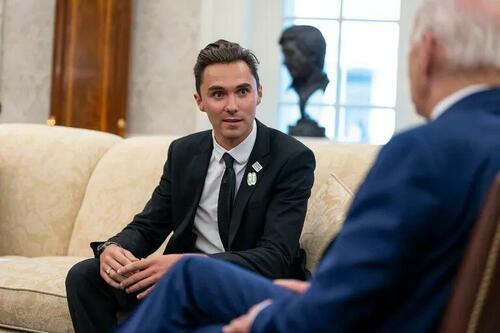 (Official White House Photo by Adam Schultz)
(Official White House Photo by Adam Schultz)
Hogg created a group in the aftermath of the 2022 midterm elections to elect Generation Z politicians to offices throughout the country. The group was given favorable national coverage in major media outlets. He explained that contributions would be used to elect young Democrat candidates:
“[We’re] trying to pick them and say, you know, we would like to help you run for office, we’ll supply you with all of the resources that you need and help basically coach you and hold your hand to get there, which is kind of the gap that’s in the space right now, for at least young people at the state legislative level.”
Federal filings reportedly show that year-end 2023, Leaders We Deserve raised over $3 million. That is impressive for its first year in operation.
The conservative sites allege that the group spent “only about $263,000 on its stated mission of electing candidates from Generation Z to office combined with donations to other Democrat Party committees and groups—and instead spent more than $1.4 million on disbursements to themselves for payroll and to political consulting firms and legal fees, in addition to travel and entertainment expenses like hotels, flights, and meals.”
However, it spent reportedly spent more than $1,314,000 on travel and related expenses while giving $80,000 to the Elias Law Group.
Previously, when allegations of self-dealing and accounting improprieties were raised with regard to Black Lives Matter, the group’s attorney, Elias, immediately stood out for many. Elias resigned from his “key role” with BLM as the scandal exploded.
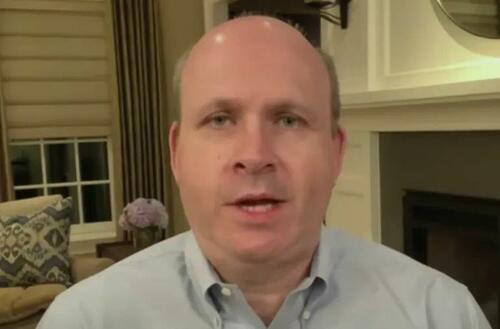 (MSNBC/via YouTube)
(MSNBC/via YouTube)
Elias’s name has now again popped up in the controversy involving Hogg, who is accused of raising millions to support liberal candidates but allegedly spending only $263,000 on such candidates while paying $83,000 to the Elias law firm. (These figures are reportedly from federal filings but neither Elias nor Hogg have specifically addressed the media reports).
Elias has long been a controversial figure, including being sanctioned in court. He was named as the key figure in hiding the funding of the Steele dossier by the Clinton campaign, which led later to a FEC fine. Reporters accused the campaign of lying to them about the funding. Elias was also reportedly with campaign chair John Podesta when he allegedly denied such funding to congressional investigators.
Despite accusing the GOP of election denial and manipulation, Elias was also involved in alleged gerrymandering efforts and challenging the outcome of elections based on alleged problems with voting machine tallies.
Back to the most recent controversy, Hogg could argue that, as a well known activist figure, his travel to these campaigns is the boost that the group promised donors. He is the assistance. Likewise, the group could argue that it is still getting ramped up for greater spending efforts in the fall. As for the legal fees, the group could argue that start up legal fees and reporting fees tend to be higher at the outset.
The controversy does raise some novel questions about the purpose of contributions. Hogg coming to a local campaign is likely to generate media attention for a candidate. He can also claim that he and his staff bring needed expertise and advice to novice or young candidates. That could be their interpretation of the promise to “basically coach you and hold your hand to get there.” Critics are focused on the pitch to “supply you with all of the resources that you need.”
The group is only the latest political or business effort launched by Hogg, who previously tried to start a “progressive pillow company” before stepping away from the enterprise.
-
Site: Zero HedgeOver 500,000 Democratic Voters Have Cast Primary Protest Votes Against BidenTyler Durden Tue, 04/09/2024 - 18:40
There are clear indicators that large swathes of prior Biden voters don't intend to vote for him this next time around versus Trump. The latest example is that the "uncommitted" campaign is gaining steam, having garnered the support of more than a half-million Democrat voters.
The initiative organized by dissident Democrats outraged over President Biden's handling of the Israel-Gaza war has sent a powerful shot across the bow of his presidential campaign, and the movement didn't even exist at the start of the 2024 primary season. Yet The Nation says that so far in total 530,502 people have voted "uncommitted" or "uninstructed" where it’s available on the ballot.
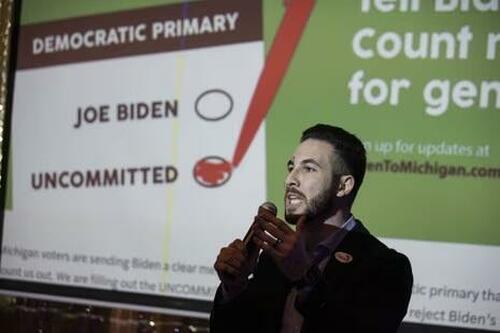 Anadolu/Getty Images
Anadolu/Getty Images
The initiative was first implemented in the key swing state of Michigan, resulting in over 100,000 people there registering their vote as "uncommitted". The state has a huge Arab and Muslim demographic.
The Nation has documented that the movement is spreading fast, and it should be a huge worry for Biden campaign strategists:
The campaign has won enough votes to secure Democratic National Convention delegates from Minnesota (14), Hawaii (7), Michigan (2), and, according to local news reports, Washington (2). And notable levels of support for the effort in must-win battleground states such as Wisconsin signal that the president’s campaign cannot neglect the fact that a substantial portion of the base that must be mobilized this fall is crying out for the United States to back an immediate, permanent cease-fire in Gaza, where Israel’s assault has cost more than 33,000 lives.
According to more from AntiWar.com, which has been closely following the movement:
Last week, 48,091 votes were cast for “uninstructed” in the Wisconsin primary. The turnout far exceeded organizers’ expectations, as their goal was to secure 20,682, the margin of victory for Biden in Wisconsin for the 2020 election.
The opposition to Biden was strongest in the area of Wisconsin where University of Wisconsin–Madison students reside, historically a Democratic stronghold. In that area, 30% of voters cast ballots for “uncommitted,” something Rep. Mark Pocan (D-WI) called “a big, f**king deal.”
Meanwhile, there's also been an intensifying divide among Democrats over whether to halt defense aid to Israel, a debate which only intensified in the wake of the Israel Defense Forces (IDF) attack on the World Central Kitchen convoy in Gaza, which left seven international workers dead, including an American.
Vote Uncommitted EVERYWHERE. This President is clearly not getting the message. https://t.co/pSvy56ho3g
— Nina Turner (@ninaturner) April 1, 2024This increased fragmentation of Biden's base has been on display in recent days too, given former House Speaker Nancy Pelosi - still very influential among Dems - has publicly come out against Biden's policy to continue arming Israel. The issue is entering the heart of the Democratic establishment, threatening unity.
Axios reported that she "signed onto a call by progressive members of Congress for the U.S. to stop transferring weapons to Israel over a strike that killed seven aid workers in Gaza."
-
Site: Zero HedgeIllegal Immigrant With 7 Deportations And 11 Arrests Charged With MurderTyler Durden Tue, 04/09/2024 - 18:20
Authored by Aldgra Fredly via The Epoch Times (emphasis ours),
An illegal immigrant who had been deported seven times and arrested 11 times was charged with aggravated murder after an unidentified body was found in Ohio, according to local authorities.
 A man in handcuffs in a file photo. (Philippe Huguen/AFP/Getty Images)
A man in handcuffs in a file photo. (Philippe Huguen/AFP/Getty Images)
Police found the body in Hamilton on Monday after responding to a 911 call. Investigators interviewed suspect Fermin Garcia-Gutierrez the following day.
Butler County Sheriff’s Office stated that Mr. Garcia-Gutierrez, a 46-year-old Mexican national, was detained on an ICE holder and held in the Butler County Jail for weapon charges, aggravated murder, and drug possession.
Butler County Sheriff Richard Jones said that Mr. Garcia-Gutierrez had previously been deported and arrested multiple times using seven different names and three different birth dates.
“Who knows how many people this guy has been involved in and has killed? Here in the United States, in our jail, he’s had two or three weapons charges, he’s had domestic violence [charges] … driving while intoxicated.
“We don’t know how many he’s killed in Mexico,” Mr. Jones said at a press conference.
Mr. Jones also blamed the Biden administration for the surge in illegal crossings at the U.S.–Mexico border.
“Our border is broken, and these individuals are the cause of it,” he said. “We’ve got to stop this border invasion, it’s killing us and its killing innocent people.”
The Hamilton Police Department is continuing its investigation into the murder case, according to Butler County Sheriff’s Office.
Border Patrol has encountered more than 7.6 million illegal immigrants trying to cross the border since President Joe Biden took office in January 2021.
Former federal officials and experts have said in the past that there is a real possibility that hundreds of people on the FBI’s terrorist watchlist have slipped into the United States among the millions of other illegal immigrants over the past three years.
Both FBI Director Christopher Wray and Border Patrol’s former chief, Rodney Scott, have been sounding the alarm about the state of U.S. borders amid an increasing number of known criminals and terror suspects being caught trying to enter the United States.
Customs and Border Protection data show that in fiscal year 2023, which ended in October 2023, Border Patrol agents apprehended 172 people on the watchlist from along the southwest border. However, when all ports of entry are added, the total number rises to 736. Some illegal immigrants were also caught with explosives.
U.S. Border Patrol Chief Jason Owens has previously called for stricter immigration policies to deter illegal immigrants from crossing the southern border with Mexico, including imposing jail time for violators.
Mr. Owens also suggested reviewing the country’s asylum laws to ensure that only migrants with legitimate claims will be allowed to seek asylum in the United States. He thinks that if people know there will be a consequence for breaking the law and entering the country illegally, they'll be less likely to do it.
Stephen Katte contributed to this report.
-
Site: Zero HedgeScandal Rocks Biden's Labor Dept For Lying About Sharing Non-Public Inflation Data With Secret Group Of Wall Street "Super Users"Tyler Durden Tue, 04/09/2024 - 18:00
A little over a month ago, a scandal erupted among the (relatively small( group of economists who keep a close eye on the monthly inflation data reported by the Biden Department of Labor, when they learned that there is an even smaller, and much more exclusive group of economists called "super users" who get preferential treatment from the BLS, including wink-wink-nudge-nudge explanations of where the data may diverge from expectations. That was the case for the January CPI when as Bloomberg first reported, the BLS sent an email to a group of data “super users”, which "explained suggested a surge in a measure of rental inflation — which left analysts puzzled — was caused by an adjustment to how subcomponents of the index are weighted":
Once it became public knowledge that there was a super secret group of preferential "accounts" receiving economic data, immediately following the Bloomberg report, a recipient of the email said that BLS Statistics "tried to retract it and that they were told to disregard its contents." Almost as if they were trying to hide it after the fact.
In retrospect, it appears the BLS really did have something to hide, because in a follow up from both the NYT and Bloomberg, we now learn that an economist from the Bureau of Labor Statistics was corresponding on data related the monthly CPI print with major firms like JPMorgan and BlackRock, in what Bloomberg said "raised questions about equitable access to economic information."
Extending on the report from February, records requested by Bloomberg revealed that the unnamed BLS economist answered numerous inquiries about details within the CPI in recent months, mostly related to computations in key categories within shelter as well as used cars, according to
The back and forth between the financial firms and the economist "who has been with the BLS for many years" was first reported by the New York Times; as discussed previously, the government bureaucrat sent several emails to a broader group, which he called “my super users” in one of the emails obtained by Bloomberg. The BLS previously lied when it said it doesn’t maintain a list of “super users.”
In mid-February, one user asked if they could be added to the “super user email list,” to which the BLS economist replied minutes later, “Yes I can add you to the list.” The move was an attempt by the lowly paid government worker to curry favor with his much better paid peers on the sell- and buyside so that he could, one day, trade the preferential data access for a cushier job in some hedge fund or Wall Street firm.
As Bloomberg details, while the recipients’ names were redacted from the request, email signature details or disclosures from their employers were visible in some of the provided records. And in addition to BlackRock and JPMorgan, other banks, hedge funds and research firms — Brevan Howard, Millennium Capital Partners LLP, Citadel, Moore Capital Management, High Frequency Economics, Nomura Securities International and BNP Paribas — appeared in the exchanges and declined to comment. Pharo Management and Wolfe Research also came up in the emails but didn’t provide comment.
Understandably, economists - at least those who were not important enough to be on the "super user" list - have been clamoring to find out more about these “super users” are after the BLS staffer addressed an email to those people in February, suggesting that a change to the weights of underlying data within a key measure of rental inflation was behind its surge in January’s CPI. As we reported at the time, the BLS told recipients to disregard its contents, and subsequently tried to clear the confusion with a notice on its website. The agency also said that the email was “a mistake.”
But, as noted above, we now know that this was merely the latest lie by a Biden agency; and so this latest revelation "is likely to prompt a deeper look at the dissemination of economic information that has implications for how major assets trade as well as Federal Reserve policy."
The BLS encourages people to ask questions and makes its staff available to engage with the public, but they strive to create equal access to information for everyone, said Emily Liddel, associate commissioner for publications and special studies at the BLS. Clearly, granting access only to Wall Street giants is not quite the equitable treatment the agency's woke DEI staffers envisioned.
“Obviously this has been an embarrassment for the agency,” Liddel said. “The public puts a lot of trust in us to be fair, and our data providers put a lot of trust in us for the data to be secure. It’s our goal to repair that trust.”
And while the BLS economist often pointed users to relevant links on the agency’s website, at least one case, he shared information that wasn’t publicly available at the time, related to the calculation for the used cars index within the CPI. Liddel said it is “still under review” whether the employee shared other nonpublic information, and that the issues appear to be isolated to this one staffer. He is not answering incoming user questions at this time, she said.
* * *
While it remains unclear who the economist is, the NYT reported that emails obtained through a Freedom of Information Act request show that the agency — or at least the economist who sent the original email, a longtime but relatively low-ranking employee — was in regular communication with data users in the finance industry, apparently including analysts at major hedge funds. And they suggest that there was a list of super users, contrary to the agency’s denials.
At the time, the Bureau of Labor Statistics said the email had been an isolated “mistake” and denied that it maintained a list of users who received special access to information.
And while there is no evidence (yet) that the employee provided early access to coming statistical releases or directly shared other data that wasn’t available to the public, in several instances, the employee did engage in extended, one-on-one email exchanges with data users about how the inflation figures are put together. Such details, though highly technical, can be of significant interest to forecasters, who compete to predict inflation figures to hundredths of a percentage point. Those estimates, in turn, are used by investors making bets on the huge batches of securities that are tied to inflation or interest rates.
Analysts regularly interact with government economists to make sure that they understand the data, but “when such access can move markets, the process for that access needs to be transparent,” said Jeff Hauser, executive director of the Revolving Door Project in Washington. “This stuff is so valuable, and then someone just emails it out.”
In at least one case, emails to super users appear to have shared methodological details that were not yet public. On Jan. 31, the employee sent an email to his super users describing coming changes to the way the agency calculates used car prices, at the time a crucial issue for inflation watchers. The email included a three-page document providing detailed answers to questions about the change, and a spreadsheet showing how they would affect calculations.
“Thank you all for your very difficult, challenging and thoughtful questions,” the email said. “It is your questions that help us flesh out all the potential problems.”
The Bureau of Labor Statistics announced the change in a news release in early January, but did not publish details about it on its website until mid-February, two weeks after the email from the employee.
It isn’t clear when the employee began providing information to super users, or whether he was the only economist at the agency to do so. Several of his emails were also sent to an internal Bureau of Labor Statistics email alias, suggesting that he did not believe his actions to be inappropriate... or he was simply an idiot.
The super users issue came to light in February, when the employee emailed the group saying that he had identified a technical change that explained an unexpected divergence between rental and homeownership costs in a recent data release. “All of you searching for the source of the divergence have found it,” he wrote.
About an hour and a half after that email went out, a follow-up told recipients to disregard it. In a subsequent online presentation, Bureau of Labor Statistics economists presented evidence that the change identified in the employee’s email was not, in fact, the source of the divergence.
-
Site: Zero HedgeWho Should Compete In Women's Sports?Tyler Durden Tue, 04/09/2024 - 17:40
Authored by Charles Lipson via RealClear Politics,
“What is a woman?” “Can a man get pregnant?” Questions like those are frequently raised at Senate hearings for progressive nominees to the federal bench or Cabinet positions. Republicans pose them for a reason. They know the witnesses will fumble the answers.
Some try to wriggle out with circumlocutions, offering only convoluted mumbling. That works brilliantly for French academic articles but not so well for U.S. Senate hearings. Other witnesses, mostly judicial nominees, claim they cannot answer because the questions might come before them in future cases. They breathe a sigh of relief since their real motto is “Loose lips sink ships.”
Often, Republicans discover the witnesses have already proclaimed their views in opinion pieces, social media posts, or academic articles when they were appealing to like-minded audiences on the left. When the audience is more skeptical, however, they are less eager to repeat those answers or to defend them.
Progressive witnesses may not have answers, but ordinary voters certainly do. They tell pollsters that men cannot get pregnant. Shocking, I know. They think it is ludicrous to place tampons in men’s bathrooms, which some universities and elite high schools do now.
The question of “who is a woman?” is more vexed. The reason is that common sense and cultural tradition point in one direction (“he was born a male and that’s what he is”) but those are opposed by another tradition: our respect for human autonomy. The Western values of human autonomy and deference for individual choices mean we normally acknowledge an adult’s self-identification. (Here is a hard question, though. If my autonomy is to be respected on issues of self-identification, why can’t I simply identify myself as an African American or Native American, even if there is no DNA evidence of that identity? Why shouldn’t that be my choice, just like gender? Yet self-identification as a racial minority without that bloodline is fiercely condemned as a malicious fraud. Just ask Elizabeth Warren, Rachel Dolezal, or Ward Churchill.)
These issues are far from settled politically. If an adult male identifies as a woman, many people say, “So be it. Live and let live.” Others are more dubious. Still others reject it outright.
What most people agree on, finally, is that children should not be subjected to irreversible biological procedures or medications. That’s child abuse. It took U.S. hospitals several years to reach that conclusion and end those profitable operations, probably because their lawyers pushed them to stop. In years to come, you can expect lawsuits by adults who will claim they were mutilated as children when they were too young to give informed consent. They will say their parents, doctors, and hospitals should be held liable for the damage they caused. Dial 1-800….
Some of these issues were on the table again this week in Wisconsin. The state legislature in Madison passed a law protecting biological women (the fashionable term is “cis-women”) from competing against transgender women in sports. The governor, a progressive Democrat, promptly vetoed the bill.
Why he exercised that veto is an interesting question. It’s certainly not because there are many transgender voters, even if we include their supportive families and friends. The real reason is that the issue has been folded into the gaping ideological divide between progressive Democrats and conservative Republicans. The governor did not want to risk being caught on the wrong side of that fault line, alienated from his political base. He may also believe, quite sincerely, that the veto was the ethical thing to do. It’s always hard to separate a politician’s ethical principles, if there are any, from hard-nosed calculations.
Feminists are a vital part of the progressive base in every state, including Wisconsin. What’s so striking here – amazing, really – is how silent most feminists have been about transgender competition in women’s sports. Although a few have spoken out, nearly all have remained silent, probably because they do not want to be excoriated for their views or outflanked by those claiming to be more progressive.
Note that the issue here is not whether a biological male who now identifies as a woman can compete in sports. Of course she can. The issue is whether she (formerly a “he”) should be allowed to compete against biological women.
There are really two basic questions at play. One is whether the inclusion of transgender women poses any physical danger to biological women. In contact sports, it might. Indeed, some injuries have already occurred.
The larger, more profound issue is whether this competition would be fundamentally unfair. That ethical standard applies to any sport where strength and body composition matter, even if there is no threat of injury.
Take golf.
The easiest way to think about transgender women in sports is to ask yourself, “Should all golfers, both men and women, be grouped together in the same tournaments, competing on equal terms?”
Put differently, should there be women’s golf tournaments at all? If the answer is “Yes, there should be a separate competition for women,” then ask yourself why? Surely that’s because men can hit the ball much farther, putting women at a severe disadvantage. If that’s the reason, doesn’t it apply equally to transgender women, who can hit the ball much farther than biological women?
This difference in physical strength matters in many sports, from swimming to weight-lifting, from bowling to track and field. Currently, there are single-gender tournaments in all of them. That includes every Olympic event except one equestrian competition. But why continue this sex segregation? If you think transgender women should compete against other women in those sports, despite their marked differences in strength, what is your rationale for any single-gender competition?
And what is your rationale for prohibiting testosterone supplements for biological females? Allowing them would actually level the playing field since transgender women already have that male hormone.
These arguments are not meant to degrade transgender men or women. They are not about respect for them as persons. They do not imply, for instance, that adults shouldn’t be able to identify as a gender different from their biological sex at birth.
Respect for individuals and their self-identification is not the point here. The point is to call out unfair competition, condemn it, and stop it. That can happen only if people slip off their ideological blinders, at least for a moment, and face the issue squarely. Honestly.
Charles Lipson is the Peter B. Ritzma Professor of Political Science Emeritus at the University of Chicago, where he founded the Program on International Politics, Economics, and Security. He can be reached at charles.lipson@gmail.com.
-
Site: Zero HedgeIsrael Publishes Footage Of Unprecedented Drone Intercept From Iraq Over Its TerritoryTyler Durden Tue, 04/09/2024 - 17:20
Iran-backed militias in Iraq are touting a claimed 'successful' drone attack on Israeli territory, which reportedly included strikes on three different Israeli army barracks in the last 24 hours. The Israeli barracks allegedly hit were identified as Elifelet, Yonatan, and Yarden, with the latter two being in the occupied Syrian Golan Heights.
In the last month Iraqi militias have said their drones have reached Haifa and the southern port city of Eilat. In the last 72 hours the so-called Islamic resistance of Iraq said it has hit Hatzerim Airbase, the Oil Port in the City of Ashkelon as well as other unknown targets, which they say included ballistic missiles.
There has been no initial confirmation by the Israeli government, and there's been little reporting of these latest strikes in international press reports, however, a number of Iraqi militia social media channels have released statements on the strikes.
The Islamic Resistance in Iraq has released a Statement as well as a Video showing their apparent Targeting over the last 72 Hours of several Locations in Southern Israel including Hatzerim Airbase, the Oil Port in the City of Ashkelon as well as another Vital Target in the City,… pic.twitter.com/ApEx2tVDVx
— OSINTdefender (@sentdefender) April 9, 2024Israel has confirmed that its territory was attacked out of Iraq earlier this month, with a prior IDF statement saying a drone slammed into a naval base in Israel’s southernmost city of Eilat on April 1st.
An IDF statement statement at the time said its anti-air systems identified a "suspicious aerial target" that breached Israeli airspace "from the east" before making impact "in the Eilat Bay area" on the Red Sea. While this wasn't necessarily the first instance of Iraqi militant groups claiming to have fired on Eliat, it appeared to be the first time that direct impact was made on an Israeli navy base, but which resulted in no casualties.
As for this fresh Monday incident, only made public Tuesday, the IDF appeared to confirm the Iraqi militia statements, but didn't name "Iraq" - while touting a successful intercept "from the east", in a rare incident. Below is the footage of the unprecedented intercept:
For the first time ever, an IDF Sa'ar 6-class corvette missile ship successfully intercepted a UAV that approached from the east and crossed into the area of the Gulf of Eilat.
— Israel Defense Forces (@IDF) April 9, 2024
IDF missile boats including Sa'ar 6-class corvettes have been positioned in the Red Sea and have both… pic.twitter.com/SujPlfctr7"For the first time ever, an IDF Sa'ar 6-class corvette missile ship successfully intercepted a UAV that approached from the east and crossed into the area of the Gulf of Eilat," wrote the IDF.
"IDF missile boats including Sa'ar 6-class corvettes have been positioned in the Red Sea and have both the defensive and offensive capabilities to engage with regional threats," the statement continued.
The type of longer range and more sophisticated drones needed for such an operation out of Iraq were likely supplied by the Iranians, which is sure to increase tensions between longtime enemies Tehran and Tel Aviv. Israel has already long accused the Islamic Republic of funding and supporting both Hamas and Hezbollah. This has also been the case with Yemen's Houthis.
The question remains whether more Iraqi militants will launch more drone attacks on Israeli soil, as to some extent this would open yet another 'front' in the war. Recent days have seen Israel's military signal that operations in Gaza might be deescalating, given an entire division of Israeli troops were pulled out of southern Gaza over the weekend. But this also is likely a preparation for a bigger Rafah assault.
 Eliat port in southern Israel, file image.
Eliat port in southern Israel, file image.
Israel has said it now has a date for the launch of Rafah operations, but has not disclosed the day. The Biden administration has at the same time said it was not briefed on the date, and says it has no knowledge on when such an operation is expected to begin.
-
Site: Zero HedgePfizer And A Corruption Too Deep To FixTyler Durden Tue, 04/09/2024 - 17:00
Authored by Jeffrey Tucker via The Epoch Times,
Old movies and new ones often turn on the theme of corruption. For generations, viewers have enjoyed discovering the ins and outs of a gang of people who are up to no good, financially and otherwise.
It’s always a shock to see the way the insiders treat each other so brutally, and how they lie, cheat, and steal to get their way. It’s especially satisfying when they get caught in the end.
Countless movies in the old days followed this basic plot.
One of my favorites is the American classic “On the Waterfront” (1954) with Marlon Brando, Eva Marie Saint, and Karl Malden. It’s the story of a rough gang of thugs that has taken control of a longshoreman’s union. They pillage the workers for dues and make paychecks contingent on loyalty.
For years, everyone in the union is told to be “D&D” or deaf and dumb, never saying a word to the authorities for fear of bad outcomes. As the corruption gets worse, the tactics of enforcement grow more violent. New Jersey kicks off a crime commission to look into the problem with the focus on a murder. A local priest plays a role in convincing a worker who is tight with the gang to rat on the bad guys.
It all turns out well in the end, even if Brando gets badly beaten up. The bad guys are overturned and the workers get their union back. The movie is a brilliant reflection of a culture at the time: yes, there are imperfections but we are making great progress to root out the bad and replace it with the good, thanks to moral leadership and courage.
But notice how the plot absolutely depends on the existence of a not-corrupt higher power.
That’s almost always the case in the old movies. Once the authorities find out that something bad is happening, they work to clean it up. Their success turns on the ethical tenacity of one insider who is willing to stand up for what is right. To make that courage operational, you need means of redress that are not part of the problem.
That’s all great but we have a different problem in our own time. The higher powers on which we depend for redress are themselves part of the issue.
This truly came home to me lately with the Supreme Court hearing for Murthy v. Missouri, which documented how dozens of federal agencies worked with social media companies, directly and indirectly, to censor free speech.
Seems like a no-brainer of a case. But based on the oral arguments, a third of the court couldn’t see the problem at all. A third was confused. The last third got that this was a problem for the First Amendment.
This is alarming but a realistic accounting of where we are in the United States today: divided by thirds into clear, confused, and corrupt.
In other words, we can no longer count on the highest powers and the most authoritative institutions to save us from evil.
Let’s cite an astonishing example from this past week that should have been headline news but was utterly invisible to legacy media (speaking of corruption at the very top). The case involves the COVID medication Paxlovid. It was approved under “emergency use” in December 2021, and trumpeted by Fauci, President Biden, and the rest of the usual crowd. It was 90 percent effective, they said!
The White House authorized $11 billion and more to pay for it, and dispatched the whole army of media mavens to push this thing. The White House was able to claim it was free, if you had insurance but even that would last only for so long. Eventually, the consumer had to pay and it was nearly $1,500 for 20 pills.
In many places, the entire medical profession was insisting that this was the way to treat COVID, even as Ivermectin and Hydroxychloroquine were banned or impossible to get.
Paxlovid was greeted with all the usual hosannas from the drug company as echoed by big media. The drug is 89 percent effective, they kept saying. The governments of Canada, the United States, and the UK all celebrated and showered Pfizer with multiple rounds of billions of dollars.
But even from the outset, it seems there were many reports of rebounds. The drug would reduce symptoms for a few days even to the point of generating a negative test but then COVID would come back. This happened often enough that pharma skeptics grew deeply suspicious of it, especially because of such a very long run of patented failings in this realm.
Mr. Biden, for example, seems to have gotten COVID four times after being treated repeatedly with Paxlovid. So too with Biden’s wife. The same happened with Fauci himself. Most every prominent person reported something similar. But that did not stop the gravy train from running, with the entire medical professional rallying around this drug.
COVID-19 treatment pill Paxlovid in a box at Misericordia hospital in Grosseto, Italy, on Feb. 8, 2022. (Jennifer Lorenzini/Reuters)
From the outset, The Epoch Times was reporting skeptically about it, the only media venue to do so. More and more doubts emerged, not in official circles but online in alternative media.
Now we come to the kicker. Pfizer itself has finally published its randomized placebo-controlled trial of several hundred individuals with the Delta variant, which would have been two and a half years ago. The title of the results as published in the New England Journal of Medicine: “Nirmatrelvir for Vaccinated or Unvaccinated Adult Outpatients with Covid-19.”
Notice the absence of the word Paxlovid, making it all the more difficult for regular people to find. Nirmatrelvir is the clinical name.
And the conclusion: “Nirmatrelvir–ritonavir was not associated with a significantly shorter time to sustained alleviation of Covid-19 symptoms than placebo, and the usefulness of nirmatrelvir–ritonavir in patients who are not at high risk for severe Covid-19 has not been established.”
In other words: this drug does not work. At all. It is no better than nothing. It is not useful. Countless billions later and this is what we have, a completely useless thing. At best. In fact, that Pfizer itself admits that its own drug is useless, one wonders what the bad news is!
The drug was not a game changer at all. It was a vast waste of money.
This whole thing stuns me, even now, even after everything we know about the industry, its relationship to government, the way the media goes along with all the nonsense, the manner in which all top officials go along with the racket. This to me is as much a scandal as the vaccine in some ways.
You will notice that you have not seen this reported in any mainstream media, even though it appears in the top medicine journal in the United States. That’s because the mainstream media is entirely in the pay of pharma.
The conspiracy is out in the open, and all official channels are implicated. There seems to be zero accountability or appeal. It’s no wonder that RFK, Jr., is calling for racketeering investigations to be made against the whole industry and its industrial partners. This is aggressive robbery and fraud.
Very few people even know to care because they are not being told the brutal facts of the case.
One also wonders how it is that Pfizer held onto this study for two years before releasing it.
Why would Pfizer choose just now to announce that its wonder drug is actually useless? My own theory: its accounting ledgers are showing that the drug’s period of high profitability is at an end. There’s no more high-margin profits associated with it. Might as well retire it.
With a complicit legacy media, it has no egg on its face. It can just chalk up its wild Paxlovid push as profitable and done, like a seasonal beer or a pumpkin-spice latte. There is essentially no downside to moving onward to other products in its arsenal.
But think about what this means for this company and for the system that protects it. What does this say about the vaccine? What does it mean for the whole network of protection, from regulators to journals to media? They are all in on the game. And how deep and wide is this game?
What we have in operation here is a form of vampiric capitalism, an entire industry that has colonized our health and bodies in the interest of wealth extraction even though its products do not work and actually make us more sick, providing more opportunities to innovate products that do more of the same.
It’s time that this system came to an end, but where is the crime commission to investigate and stop it?
It doesn’t exist. That’s the great dilemma of our time.
-
Site: Zero HedgePump-Prices Surge To 6-Month Highs Ahead Of CPI, Crude Inventories See Another BuildTyler Durden Tue, 04/09/2024 - 16:40
Crude prices slipped lower today (along with everything else around 10amET ish), but never recovered (unlike stocks), as traders weighed prospects for a ceasefire in Gaza against ongoing risks to oil supplies in the Middle East.
"The Middle East remains a powder keg, but in terms of oil production, it has yet to explode," Stephen Innes, managing partner at SPI Asset Management, told MarketWatch.
"While the potential for escalation is often discussed, it's in no one's best interest, despite recent attacks such as the one on the Iranian consulate."
Additionally,a s MT Newswires reports, in its influential monthly Short-Term Energy Outlook, the Energy Information Administration lowered its 2024 demand-growth forecast to 0.95-million barrels per day, even as it raised its estimate for actual demand to 102.65-million bpd from its March estimate of 102.17-million bpd after revising its estimate of 2022 demand up by 0.8-million bpd.
"Although the revisions to historical consumption resulted in more forecast petroleum consumption, they also decreased demand growth in 2024 compared with our previous STEO," the agency noted.
Expectations ahead of the API print were for a third straight weekly build in crude stocks (though only marginal)...
API
-
Crude +3.03mm (+800k exp)
-
Cushing +124k
-
Gasoline -609k (-1.4mm exp)
-
Distillates +120k (-600k exp)
Crude stocks rose for the third straight week but gasoline stocks drew down once again...
Source: Bloomberg
WTI was hovering around $85.35 ahead of the API print and inched lower on the build...
Meanwhile, pump-prices continue to rise, as we expected, tracking wholesale gasoline prices higher...
Source: Bloomberg
...not exactly painting an optimistic picture for tomorrow's CPI print with the highest pump-prices in six-months...
Source: Bloomberg
But hey, Bostic said everything would be fine, right? Right!
-
-
Site: Zero HedgeIs The Great Illusion In Ruins?Tyler Durden Tue, 04/09/2024 - 16:20
Authored by Victor Davis Hanson,
In 2021, Joe Biden was elected after a bitterly fought campaign that deposed the incumbent Donald Trump. Democrats eventually captured, for a time, both the House and Senate, ensuring the most left-wing government in modern American history.
Americans were then set to witness a great experiment.
For the first time in their lives, a truly radical socialist program would supposedly fundamentally transform the way America dealt with the border, immigration, the economy, race relations, foreign policy, energy, law enforcement, crime, education, and social questions such as religion, gender, abortion, and schooling.
In a sense, we were all to be lab rats of sorts, to be experimented on by the radical left and their various critical theories. Now in the last year of the Biden term, we can see the results of that experiment—and the unfortunate disasters that followed.
But first, how was such a radical move to the left even possible in a center-right America?
The Democratic nominee, Biden, had earlier united the left, but only through a Faustian deal. The handlers of a nearly non compos mentis Biden had ushered all his 2020 primary rivals out of the primary races in unison.
But in exchange for their exits that ensured Biden the nomination, the left took over his general campaign—in which Biden was virtually relegated to his basement—and then set his agenda.
Who was running things?
The mysterious architects of White House ideology included, inter alia, the omnipresent, now-Washington-DC-dwelling Obamas, the old socialist gadfly Bernie Sanders, the fossilized tribunes of the black and Latino congressional caucuses, the DEI firebrand Squad, and the neo-socialist scold Elizabeth Warren.
As a result, for one of the few times in American history, the hard left now had undreamt of power. And it was enhanced by a chorus in our compliant media, academia, corporations, the administrative state, foundations, entertainment, and popular culture.
So we were all to embark on a great adventure led by the foot soldiers of DEI, the Chicken-Little green extremists, the critical race and critical legal theory crowd, the modern monetary theorists, the woke commissars, the transgendered zealots, Antifa, BLM, the hate-Israel lobby, and the Trump Derangement Syndrome media sorts.
Ostensibly, America was to be reset financially, economically, socially, culturally, militarily, and politically. The nation would be arbitrarily divided into oppressors and oppressed—with one caveat: hyper-rich, left-wing white architects had to be exempt from the damage inflicted on those they targeted. Thus, like Orwellian pigs who walked on their two hind legs, they were free to fly their private jets, get their kids into racially quota-bound Ivy League schools, burn lots of fossil fuels to heat and cool their massive homes, and be protected by their walls, security details, and zip codes from the crime wave they would soon unleash on others.
Now, as we enter the fourth year of the great experiment, America is $35 trillion in debt, borrowing $1 trillion every 100 days. Home mortgages are at 7 percent. Key prices for food, insurance, rent, and fuels are 30-40 percent higher than when Biden entered office.
The nation has been humiliated and emasculated abroad. Racial relations are the worst in a half-century. The military is in virtual receivership. Biden is polling about 40 percent approval and is behind in key swing states in most of the 2024 polls.
As a result, the Biden administration is furiously trying to find a way to release more of its hated oil and natural gas on the world market. It stopped refilling the strategic petroleum reserve that it had earlier drained to lower gas prices before the 2022 midterms.
So it will quietly pump more oil and gas, appease Iran in fear of a war in the oil-producing Middle East, plead with the once “pariah” Saudis, and order the Ukrainians not to hit Russian oil installations—all to get more oil produced to lower November 2024 gas prices.
It will head nod to eliminating fossil fuels, mandating EVs, banning natural gas stoves, and subsidizing more inefficient wind and solar farms. But it now realizes that its green agenda on its watch will wreck the United States economy and throw the left out of power. So it pivots to an old-fashioned “Drill, World, Drill” mantra—at least until the election is over.
Biden fulfilled his agenda of getting 10 million illegal aliens into the United States by destroying the southern border. The point was to swarm America with poor, unaudited migrants, all in need of massive federal and state assistance, all supposedly now loyal to their entitlement benefactors. Who could stop them from voting as repayment to their enablers in the new age of 70 percent mail-in ballots, same-day registration, inadequate authentication and audit of ballots, third-party vote harvesting, ballot curing, and Zuckbucks pouring into key precincts to absorb the work of the registrars?
Most of the illegals went to Texas and Florida, key swing states that the left still thinks it can flip to blue status.
Long term, the 10 million will recalibrate congressional districts to favor neo-socialist agendas. Short-term, millions of new arrivals unlawfully may still try to vote in 2024.
Any who object to or publicize this agenda will be dammed with boilerplate smears of “election deniers,” “voter suppressions,” “racists,” and “xenophobes.” Yet all that said, the administration is now desperately trying to distance itself from its greatest “new Democratic Majority” border success, given that public opinion abhors what Biden had done at the border to the country at large.
So it floated a phony “bipartisan border security” bill in hopes of luring naïve Republicans to support a stealth de facto amnesty agenda that would have still allowed 5,000 illegals in a day rather than the now customary 10-15,000. The hope was that when it failed (and the left knew it would), to blame Republicans for what the left had wrought.
Biden knows destroying the border will ruin America for generations to come, costing billions of dollars in subsidies and legal and policing costs to integrate the massive influx. So until the election, it is thrashing about, claiming that it never did such a thing at all. Its duplicity is again proof that the open borders agenda was hated by the public, a human catastrophe, and not sustainable before an impending election.
Biden’s foreign policy is also in ruins.
Biden destroyed deterrence in an effort to beg, appease, and buy off America’s enemies to behave and not cause an election-losing war. But the more it fled from Afghanistan in humiliation, the more it appeased Russia as it massed on Ukraine’s border, the more it snored as a Chinese spy balloon traversed the United States, the more it put early holds on aid to Ukraine, the more it assured Putin a “minor” offensive into Ukraine would not elicit a US response, so all the more it convinced Putin that he could take Ukraine without an American pushback, the Chinese to threaten Taiwan, and Hamas to prepare for massacring Jews.
So here we are in Ukraine with nearly 800,000 dead, wounded, and missing Ukrainians and Russians.
The administration has no clue how to stop the Verdun that its appeasement birthed. The entire therapeutic approach to foreign policy lies in ruins.
Ditto the Middle East. National security advisor Jack Sullivan’s “quiet” portfolio that he inherited from the Trump administration simply blew up. Biden is now scrambling to stop the Israeli response to the encircled Hamas remnants, trapped in their last redoubt in Rafah.
Biden is now replaying the 1950s CIA-stereotype of the “Ugly American,” as he does his best to overthrow the Netanyahu government, and to allow the trapped Hamas remnants to escape and claim they defeated the Zionist entity, despite butchering more Jews in a single day than any time since the Holocaust. No matter: the Biden administration is stealthily communicating with the Israeli opposition concerning the best joint strategies to force Netanyahu out. Mass protests in the streets of Tel Aviv attest to the success of destabilizing the current Israeli government.
Team Biden whispers to the media about slow-walking or stopping key arms shipments, abdicating America’s once protective role in the UN, or encouraging the “international community” to go after Netanyahu for “war crimes” for accidentally hitting a civilian team in Gaza. (By such logic, are Biden and Gen. Mark (“righteous strike”) Milley equally culpable for being in charge when a US strike in Kabul blew up 10 innocent civilians by similarly mistaken targeting?). Meanwhile, Biden keeps courting Muslim-American Michigan voters, who repay his appeasement with cries of “Death to Israel! Death to America!”.
The release of violent criminals and an uptick in property crimes, murders and assault follow a similar script. The Biden administration outsourced criminal justice to defund the police/critical legal theorists at the federal, state, and local levels. No bail arrests led to violent offenders released the next day. Thousands were let go from jails and prisons.
The word spread in the criminal community that in the new Biden years, there were no real consequences, no serious punishments for violent assault or major felonies.
So in 2021-2023, crime exploded. When it reached the point of making life unlivable in the major cities and began to max out, the administration declared “crime is declining”—in the same way that hyper-inflation supposedly did so on the economic front.
After spiking the prices of key food staples, insurance, fuel, and interest rates, such hikes could not go too much higher without destroying outright the American way of life. So as the rate of inflation slowed, Biden bragged about “lowering inflation”—but not the 30-40 percent higher food prices since his own inauguration.
The common denominator for these disasters is the embrace of left-wing “theory.”
Critical legal theory mandates that jurisprudence is a construct.
Laws have no morality since they favor the powerful. The latter use “white privilege” arbitrarily to invent crimes and punishments to protect their own power hierarchies. All that nonsense has now led to a pre-civilizational free-for-all in our dirty, dangerous, and dysfunctional cities.
Modern monetary theory - printing lots of money to spread around to those who have none while diminishing the value of money of those who have it - only led to hyperinflation and high interest rates.
When DEI theories were unleashed on the military, potential recruits hesitated, and thousands quit. After Pentagon grandees virtue signaled their fear of “white rage” and “white privilege,” after DEI made promotions and assessments often contingent on race, gender, and sexual orientation, and after the new military was humiliated in Afghanistan, it found it could no longer deter the enemy, recruit sufficient soldiers, or win back the confidence of the American people.
In all these cases, the woke genie left the bottle—and won’t go back in. So it will be hard for the administration to assure a long-suffering public that things are just wonderful, much less to reverse these policies, if indeed they are reversible, before November.
Expect instead nonstop distraction as the left beats the January 6 horse to death, calls for abortion on demand, and waits for its underling judges, prosecutors, and juries to jail or bankrupt Trump and therefore do what balloting cannot.
In other words, the long-awaited Great Fundamental Transformation finally got its moment, crashed, and now has torched the nation—middle-class Americans most of all.
-
Site: Zero HedgeMarkets Suffer Conniptions Ahead Of Crucial Consumer Price PrintTyler Durden Tue, 04/09/2024 - 16:00
Weird day... no macro, no FedSpeak, no notable geopolitical malarkey and yet, markets had a conniption (early on)...
VIX spiked up, modestly reminiscent of last Thursday's manic episode (but we note that the market is implying just a +/-0.8/0.9% implied move in the S&P 500 to tomorrow's close)...
Source: Bloomberg
Stocks puked early (and dip-buyers stepped in). With around 30 mins left in the day Fed's Bostic said some shit and the market went into panic-bid mode. You decide if it made sense to rip higher:
-
*BOSTIC: IF JOB DATA SIGNALS PAIN TO COME, OPEN TO EARLIER CUTS
-
*BOSTIC: IF DISINFLATION PACE RESUMES, COULD PULL CUTS FORWARD
-
*BOSTIC: CPI COMING IN AT CONSENSUS WOULD BE WELCOME DEVELOPMENT
-
*BOSTIC: POSSIBLE MAY NEED TO DELAY CUTS "EVEN FURTHER OUT"
Seems like exactly more of the same 'data-dependent' crap from The Fed, but as you can see the algos loved it. That fit of buying lifted Small Caps and Nasdaq green (and S&P at the death)...
We note that 0-DTE traders were putting down-pressure on markets from the cash open (with heavy put-buying), then the early 0-DTE call-buyers capitulated (which snapped stocks lower around 1030ET). The rest of the day saw call-buyers return and 0-DTE flow flat on the put-side...
The basket of MAG7 stocks was monkey-hammered at around that time and never really recovered...
Source: Bloomberg
Also of note, AI stocks have gone nowhere (well they've gone down) for the last six weeks...
Source: Bloomberg
Of course, it didn't help that Boeing shit the bed again on whistleblower warnings about the 787...
Away from stocks, crypto crashed with Bitcoin erasing all of yesterday's gains and some...
Source: Bloomberg
Crude was clubbed like a baby seal after WTI tagged $87 to the tick overnight...
Source: Bloomberg
Amid all this, Treasuries were bid with the long-end modestly outperforming (30Y -6bps, 2Y -4.5bps). Yields are down notably from yesterday's highs...
Source: Bloomberg
With the 30Y Yield having erased all of the post-payrolls spike now...
Source: Bloomberg
The dollar was weaker overnight but jumped higher as the market conniptions struck early on to end modestly higher...
Source: Bloomberg
But, amid all that, rate-cut expectations actually improved notably on the day...
Source: Bloomberg
Despite dollar gains, gold managed to hit new record highs once again at $2365...
Source: Bloomberg
Finally, for everyone anxious about a hot print tomorrow...
Source: Bloomberg
...there, that should help calm any fears.
-
-
Site: Zero Hedge'Devout Catholic' Biden Disagrees With Pope's Declaration That Gender Ideology Is "Deeply Harmful"Tyler Durden Tue, 04/09/2024 - 15:45
Authored by Steve Watson via Modernity.news,
The White House quickly responded Monday following a declaration published by the Vatican that denounces ‘gender affirming’ surgery and gender ideology as “deeply harmful,” a “violation of human dignity,” and aimed at “eliminating the basis of family.”
The 20 page declaration approved by Pope Francis outlines that a person’s gender is a “gift from God” and that any attempt at gender reassignment infringes on God’s creation.
The document further asserts that attempts to introduce new rights in relation to gender theory in recent years have “led to instances of ideological colonization,” which the Catholic Church regards as “extremely dangerous.”
“Human life in all its dimensions, both physical and spiritual, is a gift from God. This gift is to be accepted with gratitude and placed at the service of the good,” the declaration states.
It continues,”Desiring a personal self-determination, as gender theory prescribes, apart from this fundamental truth that human life is a gift, amounts to a concession to the age-old temptation to make oneself God, entering into competition with the true God of love revealed to us in the Gospel.”
The push for allowing people to identify as any gender they choose, rather than accepting the gender given to them by God denies “the greatest possible difference that exists between living beings: sexual difference,” the Church further decrees, adding that modern gender ideology “envisages a society without sexual differences, thereby eliminating the anthropological basis of the family.”
The document further clarifies that it is not possible to “separate the masculine and the feminine from God’s work of creation, which is prior to all our decisions and experiences, and where biological elements exist which are impossible to ignore.”
The Church states that only in accepting the difference between genders “each person can fully discover themselves, their dignity, and their identity.”
“Creation is prior to us and must be received as a gift,” the document further asserts, adding “At the same time, we are called to protect our humanity, and this means, in the first place, accepting it and respecting it as it was created.”
Pope Francis previously described gender theory as an “ugly ideology of our times which cancels out the differences [in humanity] and makes everything the same.”
Responding to the declaration during a briefing, Biden press secretary Karine Jean-Pierre stated “We are pleased to see that the document… furthered the Vatican’s call to ensure that LGBTQ+ are protected from violence and imprisonment around the world. However, the president will continue to be an advocate for the rights, safety and dignity of the LGBTQ+ community, including transgender people here in the U.S.”
Audio: Biden's Press Sec. stating that he essentially disagrees with the Vatican's declaration that gender affirming surgery and gender ideology is “deeply harmful,” a "violation of human dignity," and aimed at "eliminating the basis of family." Report: https://t.co/kLluhUMr37 pic.twitter.com/Xiia1VbZNb
— m o d e r n i t y (@ModernityNews) April 9, 2024“What about the more specific comments about gender theory and transgender individuals?” a reporter pressed.
Jean-Pierre responded, “I can speak to the president’s stance, and he’s always been very clear on the importance of protecting or having protections for the transgender community and the broader LGBTQ+ community, and that’s been very clear since day one of his administration.”
Between this and declaring Easter Sunday Transgender day, many are now highly suspicious of Biden’s claim to be a ‘devout Catholic’.
Why has Joe Biden not been excommunicated from the Catholic Church for his little stunt on Easter Sunday?
— MAGATrumpFan7383 (@TrumpFan7383) April 9, 2024
Is this proof that the Pope is choosing liberal politics and politicians over God AGAIN?* * *
Your support is crucial in helping us defeat mass censorship. Please consider donating via Locals or check out our unique merch. Follow us on X @ModernityNews.
-
Site: Zero HedgePAMP It: Costco Selling Up To $200 Million In Gold Bars Per Month, Wells Fargo EstimatesTyler Durden Tue, 04/09/2024 - 15:25
Last December, wholesale retailer Costco announced that they had sold over $100 million worth of gold in Q3 2023.
"You've probably read about the fact that we're selling one-ounce gold bars. We sold over $100 million of gold during the quarter," sad CFO Richard Galenti.
Now, Wells Fargo estimates that Costco "may now be running at" $100 million to $200 million per month in gold sales.
"Our work suggests there has been significant interest given COST’s aggressive pricing and high level of customer trust," said analyst Edward Kelly in a Tuesday note to clients. "The accelerating frequency of Reddit posts, quick on-line sell-outs of product, and COST’s robust monthly eComm sales suggests a sharp uptick in momentum since the launch," CNBC reports.
Costco is selling one-ounce bars made of nearly pure 24-karat gold. While the price is not disclosed online to nonmembers, it’s estimated that the product generally sells for about 2% above the spot price, which as of Tuesday morning was around $2,357 an ounce. That would put the price at Costco just over $2,400.
Sales of Costco gold bars are now limited to five per customer (up from two), while executive members receive 2% back. Those who use their Citigroup credit cards will receive a further 2%.
"Pricing at that level and shipping costs suggests it’s a very low profit business at best," wrote Kelly.
Spot prices for gold have notably been on a tear this year, rising over 13% YTD amid persistent inflation, nearly $35 trillion in national debt (and growing), and investor fears over the state of the 'deteriorating US fiscal situation,' according to the report.
According to DataTrek co-founder Nicholas Colas, "The move suggests that many foreign governments feel the need to hedge geopolitical outcomes that might be negative catalysts for other risk assets like stocks."
"The only good news is that this reinforces the idea of gold as a reasonable hedge for diversified portfolios," he added.
-
Site: Zero HedgeQuit Complaining About Inflation!Tyler Durden Tue, 04/09/2024 - 15:05
Authored by Jeffrey Tucker via DailyReckoning.com,
The New York Times has published a strange article by Justin Wolfers, an economist at the University of Michigan. The headline is that his economist brain makes him say with regard to inflation: “Don’t worry, be happy.” The article gives the reader as much reason to trust economists as you do epidemiologists, which is to say none at all.
The idea is that if both prices and income go up together, it all pans out in the wash. Yes, the article goes on for 1,000 words to say that but that’s its essence. The thought is that the 25% inflation we’ve experienced over the last four years really hasn’t done any damage. Money is neutral to economic exchange and so is inflation.
So just chill!
Inflation is a lot scarier when you fear that today’s price rises will permanently undermine your ability to make ends meet. Perhaps this explains why the recent moderate burst of inflation has created seemingly more anxiety than previous inflationary episodes… we’re in the midst of a macroeconomic anxiety attack.
Now, on the face of it, this claim is notable because he nowhere claims that inflation does actual good, so perhaps that is a step in the right direction.
If that’s true, what’s the point of printing up $5 trillion-plus in 2020 and following?
No question that this is the direct cause of the loss in purchasing power of the dollar that we’ve experienced.
If money is entirely neutral and inflation essentially irrelevant, the Fed should simply freeze the money stock if only to reduce anxiety.
Inflation Is Taxation
Of course the professor doesn’t suggest that. This is for a reason. Inflation is a form of taxation and wealth redistribution from the poor and middle class to the rich and powerful. Without it, that pathway to wealth transfers would not happen.
Let’s see what the article overlooks about inflation in real life.
First, every inflation comes with injection effects. Not all new money enters the economy at the same time. Some people get it earlier and thereby can spend it before its value starts to fall and fall. They are the winners from inflation. It’s a giant subsidy to the ruling classes.
Think about 2020 and early 2021. Millions of banked businesses and consumers, plus governments most especially, found themselves flush with new cash. Savings soared but so did spending on high-tech goods and delivering services to make the work-at-home economy function.
Many institutions benefited: banks, governments, online learning platforms, online merchants like Amazon, streaming services and so on. This was part of the Great Reset, to enrich digital enterprise over physical enterprise.
This tendency for new money to affect different industries in different ways was uncovered by the Irish-English economist Richard Cantillon, writing even earlier than Adam Smith. He said that money is never neutral to economic exchanges but rather integral, so every increase in the supply of money has the effect of rewarding some at the expense of others.
Savers Are Suckers
Second, you know what’s not affected by the tendency of prices and wages to go up under inflation? Savings. Your money in the bank was not somehow adjusted further up by virtue of inflation. So Professor Wolfers’ entire analysis is blown up as a result: It simply does not pertain to any deferred consumption of the past.
Savings is the basis of investment and thus future prosperity, so inflationary regimes always punish those who are frugal and reward those who live for today and save nothing. Indeed it is deeply punishing toward long-term thinking in general.
Third, none of Wolfers’ thought accounts for the huge transition costs associated with accounting during inflationary bouts. Every business that runs on small margins in a competitive environment has to deal with balancing income versus expenses on large items and small.
Accounting alone consumes vast amounts of operational attention in every business. If your costs are randomly going up for all inputs from labor to materials to just keeping the lights on, and each at different stages and in different ways, it becomes much easier to make mistakes.
In addition, it’s easier said than done to “pass the costs onto the consumer.” The ability to do so always depends on the price elasticity of demand, which is a measure of just how trigger-happy consumers really are toward higher prices. How much will demand be affected by changing prices?
There’s no way to know in advance, which is why merchants end up testing and treading carefully with hidden fees and shrunken packages. It’s all a matter of making the economy work.
Companies facing less competition and larger profit margins are in a better position to achieve this than those like small businesses, which cannot.
Therefore the high costs of accounting transitions fall disproportionately on smaller businesses. Did you notice, for example, that alcohol prices have not increased nearly as much as other prices?
That’s because they were in a position to eat some of their large margins rather than risk reducing demand for their product. That was certainly not true of the corner grocer or the small restaurant.
They’re Gaslighting You
These are three reasons why this professor’s opinion — born of models in which there are no transition costs, injection effects or accounting uncertainties — has nothing to do with the real world. And you know this, based on the experience of the last four years.
It’s an enormous source of frustration when intellectuals use their high-status positions to instruct the public on matters we know to be untrue.
They’re gaslighting us.
It’s also an annoyance to cover up the terrible truths we know. The years 2020–2024 were times of one of the greatest head fakes in the history of government and central banking. They showered the world with seemingly free money only to take it all away and then some merely a year later and continuing to this day.
And who won? Look around. Big government is bigger and so is tech and digital businesses in general, while the banks are flush with cash. That tells you all you need to know about who is winning and who is losing in the great inflation racket.
Any economist telling you otherwise needs to let go of the unrealistic otherworld models and take a look at the reality on the ground.
He might discover that members of the public are not irrational to be upset but rather entirely in touch with the truth about what has happened to us.
-
Site: Zero HedgeUS Sent Seized Iranian Weapons, Ammo To Ukraine As Resupply Efforts Hit DesperationTyler Durden Tue, 04/09/2024 - 14:45
The Pentagon announced Tuesday it has delivered thousands of small arms previously seized from a shipment intended for Yemen's Houthi rebels, along with over half a million rounds of ammunition.
The US believes the seized arms were supplied by Iran, and recent years have seen an untick in these 'illegal' shipments from Tehran to the Houthis via regional waters. US Central Command had said the arms were delivered to Ukraine forces last week, coming amid reported severe ammo and weapons shortages along the front lines with Russia.
 Image source: US Central Command
Image source: US Central Command
"The US government transferred over 5,000 AK-47s, machine guns, sniper rifles, RPG-7s and over 500,000 rounds of 7.62mm ammunition to the Ukrainian armed forces" on Thursday, CENTCOM announced on social media.
"These weapons will help Ukraine defend against Russia's invasion" and are enough material to equip a brigade, the statement touted further.
CENTCOM described that it was the result of several ship seizures running between May 2021 and February 2023 from "stateless vessels". The Pentagon says Iran's elite Islamic Revolutionary Guard Corps (IRGC) was ultimately behind the shipments.
"Iran's support for armed groups threatens international and regional security, our forces, diplomatic personnel, and citizens in the region, as well as those of our partners. We will continue to do whatever we can to shed light on and stop Iran's destabilizing activities," CENTCOM added.
Starting months ago, the Pentagon began warning that it is running out of weapons for Ukraine, having just "months" left in approved supplies, at a sensitive moment that support from among the Western allies in general is waning, and as Biden's desired $60 billion more in defense aid for Kiev has remained blocked by House Republicans.
Such intercepts such as the below from last year have been somewhat routine off Yemen's southern coast...
US forces intercept second boat carrying Iranian weapon supplies for Houthi rebels https://t.co/Y6Hcp1EjiE pic.twitter.com/DjRha0PIO1
— Shephard News (@ShephardNews) February 15, 2024Some European allies, such as the French, have also announced their own Iranian weapons seizures of late. The majority of these were believed bound for Yemen's Houthi rebels, the Shia allies of Iran which have effectively closed the Red Sea to international shipping through weekly drone and missile attacks.
The Pentagon's seized arms for Ukraine program has been up and running since at least October, at which point the US said it was in possession of one million rounds of Iranian ammunition, which are bound for Ukraine.
-
Site: Zero HedgeTrump Body-Slams Lindsey Graham For Insisting On Nationwide Abortion LimitTyler Durden Tue, 04/09/2024 - 14:10
South Carolina Sen. Lindsey Graham dared to criticize Donald Trump's new stance advocating that abortion law should be left to individual states -- and was promptly subjected to withering fire from the former president.
On Monday morning, Trump posted a video in which he implicitly rejected the idea of creating a federal limit on abortions, saying that, in the wake of the Supreme Court's Dobbs decision that overturned Roe v Wade, abortion is now a state-by-state issue:
"States will determine by vote or legislation or perhaps both, and whatever they decide must be the law of the land; in this case, the law of the state. Many states will be different...many will have a different number of weeks, or some will [be] more conservative than others, and that's what they will be. At the end of the day, this is all about the will of the people."
The announcement disappointed proponents of a federal ban who had been encouraged by February media reports that Trump had told his advisors and others that he favored a 16-week federal limit on abortions, with exceptions for rape, incest or to save the mother's life.
Graham quickly posted a tweet-thread declaring his "respectful" disagreement with Trump's new stance, saying that a states' rights rationale against a federal limit "will age about as well as the Dred Scott decision," which helped perpetuate slavery.
I respectfully disagree with President Trump’s statement that abortion is a states’ rights issue.
— Lindsey Graham (@LindseyGrahamSC) April 8, 2024
Dobbs does not require that conclusion legally and the pro-life movement has always been about the wellbeing of the unborn child – not geography. https://t.co/WloOJ0ImaWTrump responded via Truth Social, writing that "Senator Lindsey Graham is doing a great disservice to the Republican Party, and to our Country." He elaborated on the political realities:
"[Democrats] love this Issue, and they want to keep it going for as long as Republicans will allow them to do so. Terminating Roe v. Wade was, according to all Legal Scholars, a Great Event, but sometimes with Great Events come difficulties.
Many Good Republicans lost Elections because of this Issue, and people like Lindsey Graham, that are unrelenting, are handing Democrats their dream of the House, Senate, and perhaps even the Presidency…"
A few hours later, Trump was back for more, this time chiding both Graham and Marjorie Dannensfelser, who leads SBA Pro-Life America. Dannensfelser had issued a statement saying her organization was "deeply disappointed in President Trump's position."
With that particular scolding message, Trump took a more philosophical tack, saying Graham and Dannensfelser "should study the 10th Amendment." A cornerstone of federalism, that final component of the Bill of Rights states that "The powers not delegated to the United States by the Constitution, nor prohibited by it to the States, are reserved to the States respectively, or to the people.”
By deferring to the states on abortion, Trump is taking the truly "conservative" position on the issue, compared to those who advocate for national regulation. As James Madison summed up the federal system:
“The powers delegated by the proposed Constitution to the federal government are few and defined. Those which are to remain in the State governments are numerous and indefinite. [Federal powers] will be exercised principally on external objects, as war, peace, negotiation, and foreign commerce…
The powers reserved to the several States will extend to all the objects, which, in the ordinary course of affairs, concern the lives, liberties and properties of the people.”
In a third Truth Social posting, Trump threw in another jab at Graham while also boasting about the power of a Trump endorsement: "I blame myself for Lindsey Graham, because the only reason he won in the Great State of South Carolina is because I Endorsed him!"
Trump and Graham's relationship has blown hot and cold over the years:
- After losing to Trump in the 2016 primary, Graham said the GOP should have "kicked him out of the party." He'd earlier called Trump "a race-baiting, xenophobic, religious bigot.
- On Jan. 6, Graham said, "Trump and I, we’ve had a hell of a journey” but “all I can say is count me out. Enough is enough.”
- In September, Trump stuck up for Graham at a South Carolina campaign rally, telling the crowd that Graham is "[A] man who's always there, I tell you what, when I need help on the left, he's great. And he's my friend too—Lindsey Graham." The crowed booed.
Trump: Lindsey Graham
— Acyn (@Acyn) September 25, 2023
Crowd: Boo
Trump: He helps me on the left pic.twitter.com/UytEWGouKa -
Site: Zero HedgeChicago's Lori Lightfoot Lands $400 An Hour Job Investigating 'Worst Mayor In America'Tyler Durden Tue, 04/09/2024 - 14:08
Former Chicago Mayor Lori Lightfoot has been appointed by the trustees of Dolton, Illinois as a special investigator to probe Dolton's embattled mayor, Tiffany Henyard - for $400 per hour.
Henyard is accused of mishandling funds. Last month she vetoed calls for an investigation into herself, which was overturned Monday night. A former city employee also accused Henyard of retaliation after she says a village trustee sexually assaulted her on a trip to Las Vegas last year, after which she was fired after speaking up.
During a Monday meeting which had roughly 150 community members in attendance - but Henyard and two village trustees skipped out on, the four remaining trustees present voted in favor of appointing Lightfoot, a former assistant US attorney, to investigate the mayor.
"This board specifically has made reaches to the state’s attorney, attorney general, governor’s office, and as we know, there are ongoing, well, it’s been reported that there are ongoing investigations from federal entities. Those entities as we know can take anywhere from two months to five years," said Trustee Jason House - mayor pro tempore for the meeting, Fox32 Chicago reports.
"We feel this option will give us an independent process," House continued.
Lightfoot will get to work right away, starting her new role as ‘special investigator’ for the Village of Dolton on Tuesday.
She will be launching a probe into Henyard's alleged mishandling of village funds, among other complaints.
"She has more authority to get what we're missing, to seal this deal and take our community back," said Belcher.
On Monday, Belcher stated that the Village of Dolton is more than $7 million in debt. -Fox32
Lightfoot, an objectively horrible mayor, lost her bid for re-election in Chicago last March, coming in third place. Her greatest hits include;
- "F**k Clarence Thomas!" Shouts Chicago Mayor Lori Lightfoot During Pride Parade
- Chicago Mayor Lori Lightfoot Granting Interviews "Only To Black Or Brown Journalists"
- Did Chicago Punish Car Dealership Rocked By $1 Million Theft After Lightfoot Called Owner An "Idiot"?
- Chicago's Ex-City Attorney Brands Mayor Lori Lightfoot A 'Disaster' After $2.9 Million Settlement Over Botched Police Raid
- Chicago Homicide Crisis Worsens As Mayor Lightfoot Fails To Quell Violence
- Illinois Sheriffs Reject Mayor Lightfoot's Urgent Plea To Cover Police Shortage In Crime-Hit Chicago
Henyard tries a lawyer trick!
In response to Lightfoot's appointment, a Dolton Township lawyer hired by Henyard to serve as the village's prosecutor, Michael del Galdo, said in a Monday letter to the legal team representing the trustees that if Lightfoot is appointed as "additional legislative counsel," Henyard will "not be approving any payments to Lightfoot," as her appointment would violate the law due to the trustees' existing attorney.
Burt Odelson, an attorney for the Trustees, hit back- saying that Lightfoot would serve not as "additional legislative counsel," but rather a "special investigator."
According to the report, Lightfoot's $400 per hour investigation will be capped at $30,000 for now - so she better wrap this up in 75 hours or less.
Henyard was called the "worst mayor in America" by an angry resident during a monthly board meeting earlier this month.
"You know what you’re doing. You’re violating our rights, and that’s a shame," one resident testified. "This is a disgrace what you have done to this village … They say that you’re the worst mayor in America. I agree."
-
Site: Zero Hedge"An Open-Minded Spirit No Longer Exists Within NPR" - NPR Veteran Excoriates Outlet Over Hunter, Russiagate ActivismTyler Durden Tue, 04/09/2024 - 13:50
Authored by Uri Berliner via The Free Press (emphasis ours),
You know the stereotype of the NPR listener: an EV-driving, Wordle-playing, tote bag–carrying coastal elite. It doesn’t precisely describe me, but it’s not far off. I’m Sarah Lawrence–educated, was raised by a lesbian peace activist mother, I drive a Subaru, and Spotify says my listening habits are most similar to people in Berkeley.
I fit the NPR mold. I’ll cop to that.
So when I got a job here 25 years ago, I never looked back. As a senior editor on the business desk where news is always breaking, we’ve covered upheavals in the workplace, supermarket prices, social media, and AI.
It’s true NPR has always had a liberal bent, but during most of my tenure here, an open-minded, curious culture prevailed. We were nerdy, but not knee-jerk, activist, or scolding.
In recent years, however, that has changed. Today, those who listen to NPR or read its coverage online find something different: the distilled worldview of a very small segment of the U.S. population.
If you are conservative, you will read this and say, duh, it’s always been this way.
But it hasn’t.
For decades, since its founding in 1970, a wide swath of America tuned in to NPR for reliable journalism and gorgeous audio pieces with birds singing in the Amazon. Millions came to us for conversations that exposed us to voices around the country and the world radically different from our own—engaging precisely because they were unguarded and unpredictable. No image generated more pride within NPR than the farmer listening to Morning Edition from his or her tractor at sunrise.
Back in 2011, although NPR’s audience tilted a bit to the left, it still bore a resemblance to America at large. Twenty-six percent of listeners described themselves as conservative, 23 percent as middle of the road, and 37 percent as liberal.
By 2023, the picture was completely different: only 11 percent described themselves as very or somewhat conservative, 21 percent as middle of the road, and 67 percent of listeners said they were very or somewhat liberal. We weren’t just losing conservatives; we were also losing moderates and traditional liberals.
An open-minded spirit no longer exists within NPR, and now, predictably, we don’t have an audience that reflects America.
That wouldn’t be a problem for an openly polemical news outlet serving a niche audience. But for NPR, which purports to consider all things, it’s devastating both for its journalism and its business model.
* * *
Like many unfortunate things, the rise of advocacy took off with Donald Trump. As in many newsrooms, his election in 2016 was greeted at NPR with a mixture of disbelief, anger, and despair. (Just to note, I eagerly voted against Trump twice but felt we were obliged to cover him fairly.) But what began as tough, straightforward coverage of a belligerent, truth-impaired president veered toward efforts to damage or topple Trump’s presidency.
Persistent rumors that the Trump campaign colluded with Russia over the election became the catnip that drove reporting. At NPR, we hitched our wagon to Trump’s most visible antagonist, Representative Adam Schiff.
Schiff, who was the top Democrat on the House Intelligence Committee, became NPR’s guiding hand, its ever-present muse. By my count, NPR hosts interviewed Schiff 25 times about Trump and Russia. During many of those conversations, Schiff alluded to purported evidence of collusion. The Schiff talking points became the drumbeat of NPR news reports.
But when the Mueller report found no credible evidence of collusion, NPR’s coverage was notably sparse. Russiagate quietly faded from our programming.
It is one thing to swing and miss on a major story. Unfortunately, it happens. You follow the wrong leads, you get misled by sources you trusted, you’re emotionally invested in a narrative, and bits of circumstantial evidence never add up. It’s bad to blow a big story.
What’s worse is to pretend it never happened, to move on with no mea culpas, no self-reflection. Especially when you expect high standards of transparency from public figures and institutions, but don’t practice those standards yourself. That’s what shatters trust and engenders cynicism about the media.
Russiagate was not NPR’s only miscue.
In October 2020, the New York Post published the explosive report about the laptop Hunter Biden abandoned at a Delaware computer shop containing emails about his sordid business dealings. With the election only weeks away, NPR turned a blind eye. Here’s how NPR’s managing editor for news at the time explained the thinking: “We don’t want to waste our time on stories that are not really stories, and we don’t want to waste the listeners’ and readers’ time on stories that are just pure distractions.”
But it wasn’t a pure distraction, or a product of Russian disinformation, as dozens of former and current intelligence officials suggested. The laptop did belong to Hunter Biden. Its contents revealed his connection to the corrupt world of multimillion-dollar influence peddling and its possible implications for his father.
The laptop was newsworthy. But the timeless journalistic instinct of following a hot story lead was being squelched. During a meeting with colleagues, I listened as one of NPR’s best and most fair-minded journalists said it was good we weren’t following the laptop story because it could help Trump.
When the essential facts of the Post’s reporting were confirmed and the emails verified independently about a year and a half later, we could have fessed up to our misjudgment. But, like Russia collusion, we didn’t make the hard choice of transparency.
Politics also intruded into NPR’s Covid coverage, most notably in reporting on the origin of the pandemic. One of the most dismal aspects of Covid journalism is how quickly it defaulted to ideological story lines. For example, there was Team Natural Origin—supporting the hypothesis that the virus came from a wild animal market in Wuhan, China. And on the other side, Team Lab Leak, leaning into the idea that the virus escaped from a Wuhan lab.
The lab leak theory came in for rough treatment almost immediately, dismissed as racist or a right-wing conspiracy theory. Anthony Fauci and former NIH head Francis Collins, representing the public health establishment, were its most notable critics. And that was enough for NPR. We became fervent members of Team Natural Origin, even declaring that the lab leak had been debunked by scientists.
But that wasn’t the case.
When word first broke of a mysterious virus in Wuhan, a number of leading virologists immediately suspected it could have leaked from a lab there conducting experiments on bat coronaviruses. This was in January 2020, during calmer moments before a global pandemic had been declared, and before fear spread and politics intruded.
Reporting on a possible lab leak soon became radioactive. Fauci and Collins apparently encouraged the March publication of an influential scientific paper known as “The Proximal Origin of SARS-CoV-2.” Its authors wrote they didn’t believe “any type of laboratory-based scenario is plausible.”
But the lab leak hypothesis wouldn’t die. And understandably so. In private, even some of the scientists who penned the article dismissing it sounded a different tune. One of the authors, Andrew Rambaut, an evolutionary biologist from Edinburgh University, wrote to his colleagues, “I literally swivel day by day thinking it is a lab escape or natural.”
Over the course of the pandemic, a number of investigative journalists made compelling, if not conclusive, cases for the lab leak. But at NPR, we weren’t about to swivel or even tiptoe away from the insistence with which we backed the natural origin story. We didn’t budge when the Energy Department—the federal agency with the most expertise about laboratories and biological research—concluded, albeit with low confidence, that a lab leak was the most likely explanation for the emergence of the virus.
Instead, we introduced our coverage of that development on February 28, 2023, by asserting confidently that “the scientific evidence overwhelmingly points to a natural origin for the virus.”
When a colleague on our science desk was asked why they were so dismissive of the lab leak theory, the response was odd. The colleague compared it to the Bush administration’s unfounded argument that Iraq possessed weapons of mass destruction, apparently meaning we won’t get fooled again. But these two events were not even remotely related. Again, politics were blotting out the curiosity and independence that ought to have been driving our work.
Uri Berliner near his home in Washington, D.C., on April 5, 2024. (Photo by Pete Kiehart for The Free Press)
I’m offering three examples of widely followed stories where I believe we faltered. Our coverage is out there in the public domain. Anyone can read or listen for themselves and make their own judgment. But to truly understand how independent journalism suffered at NPR, you need to step inside the organization.
You need to start with former CEO John Lansing. Lansing came to NPR in 2019 from the federally funded agency that oversees Voice of America. Like others who have served in the top job at NPR, he was hired primarily to raise money and to ensure good working relations with hundreds of member stations that acquire NPR’s programming.
After working mostly behind the scenes, Lansing became a more visible and forceful figure after the killing of George Floyd in May 2020. It was an anguished time in the newsroom, personally and professionally so for NPR staffers. Floyd’s murder, captured on video, changed both the conversation and the daily operations at NPR.
Given the circumstances of Floyd’s death, it would have been an ideal moment to tackle a difficult question: Is America, as progressive activists claim, beset by systemic racism in the 2020s—in law enforcement, education, housing, and elsewhere? We happen to have a very powerful tool for answering such questions: journalism. Journalism that lets evidence lead the way.
But the message from the top was very different. America’s infestation with systemic racism was declared loud and clear: it was a given. Our mission was to change it.
“When it comes to identifying and ending systemic racism,” Lansing wrote in a companywide article, “we can be agents of change. Listening and deep reflection are necessary but not enough. They must be followed by constructive and meaningful steps forward. I will hold myself accountable for this.”
And we were told that NPR itself was part of the problem. In confessional language he said the leaders of public media, “starting with me—must be aware of how we ourselves have benefited from white privilege in our careers. We must understand the unconscious bias we bring to our work and interactions. And we must commit ourselves—body and soul—to profound changes in ourselves and our institutions.”
He declared that diversity—on our staff and in our audience—was the overriding mission, the “North Star” of the organization. Phrases like “that’s part of the North Star” became part of meetings and more casual conversation.
Race and identity became paramount in nearly every aspect of the workplace. Journalists were required to ask everyone we interviewed their race, gender, and ethnicity (among other questions), and had to enter it in a centralized tracking system. We were given unconscious bias training sessions. A growing DEI staff offered regular meetings imploring us to “start talking about race.” Monthly dialogues were offered for “women of color” and “men of color.” Nonbinary people of color were included, too.
These initiatives, bolstered by a $1 million grant from the NPR Foundation, came from management, from the top down. Crucially, they were in sync culturally with what was happening at the grassroots—among producers, reporters, and other staffers. Most visible was a burgeoning number of employee resource (or affinity) groups based on identity.
They included MGIPOC (Marginalized Genders and Intersex People of Color mentorship program); Mi Gente (Latinx employees at NPR); NPR Noir (black employees at NPR); Southwest Asians and North Africans at NPR; Ummah (for Muslim-identifying employees); Women, Gender-Expansive, and Transgender People in Technology Throughout Public Media; Khevre (Jewish heritage and culture at NPR); and NPR Pride (LGBTQIA employees at NPR).
All this reflected a broader movement in the culture of people clustering together based on ideology or a characteristic of birth. If, as NPR’s internal website suggested, the groups were simply a “great way to meet like-minded colleagues” and “help new employees feel included,” it would have been one thing.
But the role and standing of affinity groups, including those outside NPR, were more than that. They became a priority for NPR’s union, SAG-AFTRA—an item in collective bargaining. The current contract, in a section on DEI, requires NPR management to “keep up to date with current language and style guidance from journalism affinity groups” and to inform employees if language differs from the diktats of those groups. In such a case, the dispute could go before the DEI Accountability Committee.
In essence, this means the NPR union, of which I am a dues-paying member, has ensured that advocacy groups are given a seat at the table in determining the terms and vocabulary of our news coverage.
Conflicts between workers and bosses, between labor and management, are common in workplaces. NPR has had its share. But what’s notable is the extent to which people at every level of NPR have comfortably coalesced around the progressive worldview.
And this, I believe, is the most damaging development at NPR: the absence of viewpoint diversity.
* * *
There’s an unspoken consensus about the stories we should pursue and how they should be framed. It’s frictionless—one story after another about instances of supposed racism, transphobia, signs of the climate apocalypse, Israel doing something bad, and the dire threat of Republican policies. It’s almost like an assembly line.
The mindset prevails in choices about language. In a document called NPR Transgender Coverage Guidance—disseminated by news management—we’re asked to avoid the term biological sex. (The editorial guidance was prepared with the help of a former staffer of the National Center for Transgender Equality.) The mindset animates bizarre stories—on how The Beatles and bird names are racially problematic, and others that are alarmingly divisive; justifying looting, with claims that fears about crime are racist; and suggesting that Asian Americans who oppose affirmative action have been manipulated by white conservatives.
More recently, we have approached the Israel-Hamas war and its spillover onto streets and campuses through the “intersectional” lens that has jumped from the faculty lounge to newsrooms. Oppressor versus oppressed. That’s meant highlighting the suffering of Palestinians at almost every turn while downplaying the atrocities of October 7, overlooking how Hamas intentionally puts Palestinian civilians in peril, and giving little weight to the explosion of antisemitic hate around the world.
For nearly all my career, working at NPR has been a source of great pride. It’s a privilege to work in the newsroom at a crown jewel of American journalism. My colleagues are congenial and hardworking.
I can’t count the number of times I would meet someone, describe what I do, and they’d say, “I love NPR!”
And they wouldn’t stop there. They would mention their favorite host or one of those “driveway moments” where a story was so good you’d stay in your car until it finished.
It still happens, but often now the trajectory of the conversation is different. After the initial “I love NPR,” there’s a pause and a person will acknowledge, “I don’t listen as much as I used to.” Or, with some chagrin: “What’s happening there? Why is NPR telling me what to think?”
In recent years I’ve struggled to answer that question. Concerned by the lack of viewpoint diversity, I looked at voter registration for our newsroom. In D.C., where NPR is headquartered and many of us live, I found 87 registered Democrats working in editorial positions and zero Republicans. None.
So on May 3, 2021, I presented the findings at an all-hands editorial staff meeting. When I suggested we had a diversity problem with a score of 87 Democrats and zero Republicans, the response wasn’t hostile. It was worse. It was met with profound indifference. I got a few messages from surprised, curious colleagues. But the messages were of the “oh wow, that’s weird” variety, as if the lopsided tally was a random anomaly rather than a critical failure of our diversity North Star.
In a follow-up email exchange, a top NPR news executive told me that she had been “skewered” for bringing up diversity of thought when she arrived at NPR. So, she said, “I want to be careful how we discuss this publicly.”
For years, I have been persistent. When I believe our coverage has gone off the rails, I have written regular emails to top news leaders, sometimes even having one-on-one sessions with them. On March 10, 2022, I wrote to a top news executive about the numerous times we described the controversial education bill in Florida as the “Don’t Say Gay” bill when it didn’t even use the word gay. I pushed to set the record straight, and wrote another time to ask why we keep using that word that many Hispanics hate—Latinx. On March 31, 2022, I was invited to a managers’ meeting to present my observations.
Throughout these exchanges, no one has ever trashed me. That’s not the NPR way. People are polite. But nothing changes. So I’ve become a visible wrong-thinker at a place I love. It’s uncomfortable, sometimes heartbreaking.
Even so, out of frustration, on November 6, 2022, I wrote to the captain of ship North Star—CEO John Lansing—about the lack of viewpoint diversity and asked if we could have a conversation about it. I got no response, so I followed up four days later. He said he would appreciate hearing my perspective and copied his assistant to set up a meeting. On December 15, the morning of the meeting, Lansing’s assistant wrote back to cancel our conversation because he was under the weather. She said he was looking forward to chatting and a new meeting invitation would be sent. But it never came.
I won’t speculate about why our meeting never happened. Being CEO of NPR is a demanding job with lots of constituents and headaches to deal with. But what’s indisputable is that no one in a C-suite or upper management position has chosen to deal with the lack of viewpoint diversity at NPR and how that affects our journalism.
Which is a shame. Because for all the emphasis on our North Star, NPR’s news audience in recent years has become less diverse, not more so. Back in 2011, our audience leaned a bit to the left but roughly reflected America politically; now, the audience is cramped into a smaller, progressive silo.
Despite all the resources we’d devoted to building up our news audience among blacks and Hispanics, the numbers have barely budged. In 2023, according to our demographic research, 6 percent of our news audience was black, far short of the overall U.S. adult population, which is 14.4 percent black. And Hispanics were only 7 percent, compared to the overall Hispanic adult population, around 19 percent. Our news audience doesn’t come close to reflecting America. It’s overwhelmingly white and progressive, and clustered around coastal cities and college towns.
These are perilous times for news organizations. Last year, NPR laid off or bought out 10 percent of its staff and canceled four podcasts following a slump in advertising revenue. Our radio audience is dwindling and our podcast downloads are down from 2020. The digital stories on our website rarely have national impact. They aren’t conversation starters. Our competitive advantage in audio—where for years NPR had no peer—is vanishing. There are plenty of informative and entertaining podcasts to choose from.
Even within our diminished audience, there’s evidence of trouble at the most basic level: trust.
In February, our audience insights team sent an email proudly announcing that we had a higher trustworthy score than CNN or The New York Times. But the research from Harris Poll is hardly reassuring. It found that “3-in-10 audience members familiar with NPR said they associate NPR with the characteristic ‘trustworthy.’ ” Only in a world where media credibility has completely imploded would a 3-in-10 trustworthy score be something to boast about.
With declining ratings, sorry levels of trust, and an audience that has become less diverse over time, the trajectory for NPR is not promising. Two paths seem clear. We can keep doing what we’re doing, hoping it will all work out. Or we could start over, with the basic building blocks of journalism. We could face up to where we’ve gone wrong. News organizations don’t go in for that kind of reckoning. But there’s a good reason for NPR to be the first: we’re the ones with the word public in our name.
Despite our missteps at NPR, defunding isn’t the answer. As the country becomes more fractured, there’s still a need for a public institution where stories are told and viewpoints exchanged in good faith. Defunding, as a rebuke from Congress, wouldn’t change the journalism at NPR. That needs to come from within.
A few weeks ago, NPR welcomed a new CEO, Katherine Maher, who’s been a leader in tech. She doesn’t have a news background, which could be an asset given where things stand. I’ll be rooting for her. It’s a tough job. Her first rule could be simple enough: don’t tell people how to think. It could even be the new North Star.
Uri Berliner is a senior business editor and reporter at NPR. His work has been recognized with a Peabody Award, a Loeb Award, an Edward R. Murrow Award, and a Society of Professional Journalists New America Award, among others. Follow him on X (formerly Twitter) @uberliner.
And fast https://t.co/JwCLUrcTlz
— Elon Musk (@elonmusk) April 9, 2024 -
Site: Zero HedgeTrafigura Gets Bullish On Power Markets As Wall Street Joins The 'Next Big Trade'Tyler Durden Tue, 04/09/2024 - 13:35
It's becoming increasingly clear that cutting-edge chatbot providers and other AI and hyper-scaler businesses will require energy-intensive data centers to operate. This places a significant burden on an outdated electrical grid that desperately needs modernization.
In last week's note, "The Next AI Trade," we explained that soaring power demand is not just AI-related; there are multiple drivers, including onshoring trends, electrification of transportation and buildings, extreme weather, and, of course, data center demand. We also provided several investment ideas on how to capitalize on powering up America for the digital age.
"Every day, I'm surprised by how fast power consumption is growing," One River CIO Eric Peters wrote in a recent note, adding, "Take any application, add AI, and you need 7x-50x the compute power. AI is a black hole; it'll suck money out of everything else and into its vortex. The arms race between industry giants is a 20 on a scale of 1-10."
In addition to grid modernization efforts, we explained to readers in December 2020, "Buy Uranium: Is This The Beginning Of The Next ESG Craze." This is because nuclear power is clean and reliable compared to unreliable solar and wind. The latest sign that a nuclear renaissance is just beginning was a report last month from the federal government about the first-ever restart of a US nuclear power plant in southwestern Michigan.
Given all this, Wall Street is jumping on the bandwagon and seeing the same investment ideas as we see in the uranium industry and companies that will upgrade the power grid to handle EVs and AI data centers.
Richard Holtum, Trafigura's global head of gas, power, and renewables, is the most recent Wall Street analyst to recognize these emerging trends. On Tuesday, he told the audience at the Financial Times Commodities Global Summit in Lausanne, Switzerland, about his incredibly bullish views on power markets.
"Electrification of the vehicle fleet, AI — all these things are massively power-intensive," Holtum said.
Across the world, traders are building out power desks from the US to Japan as regulated electricity markets open up, allowing traders from overseas to buy and sell physical units, according to Bloomberg.
He said, "There's a growing realization that the one piece that binds the traditional fossil and the energy transition is the electron," adding, "As more and more grids get liberalized, the trading sphere gets even larger."
He also noted that the nuclear power industry in the US could tremendously benefit from soaring power demand.
Will there be an 80% growth in US power consumption in the next five years?
— Financial Times Live (@ftlive) April 9, 2024
Richard Holtum, global head of gas, power and renewables @trafigura, says this increase could help the nuclear industry in the US. #FTCommodities pic.twitter.com/n1sVteaKEtLast week, Patti Poppe, the chief executive officer of Pacific Gas & Electric, told a Stanford University forum that nuclear power should continue to be part of the state's power generation mix as efforts to decarbonize the grid move forward.
And Morgan Stanley analyst Carlos De Alba recently conveyed his optimistic outlook for the US metals and mining sector because investment levels in the industry have reached their lowest level in decades. He believes the sector is poised for massive investments as reshoring rare earth mineral supply chains goes into overdrive.
What's clear is that electrifying the economy will require an upgraded grid to handle the new electrical load - and the most reliable form of clean energy to power it all is nuclear.
-
Site: Zero HedgeUgly 3Y Auction Tails The Most In Over A Year As Foreign Buyers Flee Ahead Of CPITyler Durden Tue, 04/09/2024 - 13:29
The first coupon auction of the week and the month is in the history books and boy, was it ugly: maybe it was nerves ahead of tomorrow's CPI, maybe it was the realization that there is a lot more where this came from. A LOT more.
With $58 billion in 3Y paper for sale today, tied for the biggest amount on record for sale in the tenor...
... the reception was anything but warm.
The high yield of today's auction was 4.548%, up markedly from last month's 4.256% and the highest since November's 4.701%, the auction tailed the When Issued 4.528% by 2.0bps, which was not only the first tail after 3 stopping though auction, but the biggest tail since February 2023.
The bid to cover dropped to 2.50% from 2.60%; it was the lowest since December's 2.42 and well below the six-auction average of 2.584%.
The internals were also ugly, with foreign demand fading as Indirects took down just 60.3%, the lowest since December's 52.1 (and below the 62.3 recent average), leaving 20.4 to Directs, the most since December, and Dealers awarded 19.31T, the most since, you guessed it, December.
In response to the auction, yields - which were sliding all day in a flight to safety as stocks dumped - moved higher by about 2 bps although remained near session lows amid the general selling everywhere else.
That said, if tomorrow's CPI ends up being hot again, watch out below as all of today's buyers end up being deeply underwater in less than 24 hours.
-
Site: Zero HedgeMusk Says Starlink Will Be Free For Brazil Schools If Government Cancels ContractTyler Durden Tue, 04/09/2024 - 13:15
Authored by Stephen Katte via The Epoch Times (emphasis ours),
SpaceX CEO Elon Musk has said he will provide Starlink services free of charge for schools in Brazil if the government chooses to follow through and cancel a contract for the service in the country.
Many schools in Brazil have reported using the company to provide internet access to their citizens. Starlink terminals connect to the company’s satellites in low Earth orbit and provide high-speed communications.
Brazil’s government has reportedly announced plans to suspend all contracts with Starlink. Prompting Mr. Musk to offer the service free of charge.
“Starlink will provide free Internet for schools in Brazil if the government won’t honor their contract,” he said in an April 8 social media post.
Starlink will provide free Internet for schools in Brazil if the government won’t honor their contract
— Elon Musk (@elonmusk) April 9, 2024The moves come amid a growing stoush between social media company X, also owned by Mr. Musk, and the Brazilian government.
According to an April 6 post on the platform, the global affairs team announced they were being “forced by court decisions to block certain popular accounts in Brazil.”
“We do not know the reasons these blocking orders have been issued. We do not know which posts are alleged to violate the law. We are prohibited from saying which court or judge issued the order, or on what grounds,” the post said.
The global affairs team claimed the company had been threatened with fines if they didn’t comply with the order. They also said they were unable to provide a list of which accounts were impacted.
“We believe that such orders are not in accordance with the Marco Civil da Internet or the Brazilian Federal Constitution, and we challenge the orders legally where possible,” the post from the global affairs team said.
“The people of Brazil, regardless of their political beliefs, are entitled to freedom of speech, due process, and transparency from their own authorities.”
The announcement came after a report by investigative journalist Michael Shellenberger and colleagues David Ágape and Eli Vieira, titled “Twitter Files Brazil.”
Mr. Shellenberger said that sitting members of Brazil’s Congress and journalists were among those named by Brazil’s highest court for censorship. He has shared his findings on X.
CONTEXT: Brazil’s Supreme Court and Superior Electoral Court
— Michael Shellenberger (@shellenberger) April 3, 2024
Seven justices comprise Brazil’s Superior Electoral Court (TSE).
Three of those justices are also members of the Supreme Court (STF).
One of them, Alexandre de Moraes, presides over the TSE.
Here's background on…Mr. Musk announced soon after he had removed all content restrictions in Brazil in defiance of the order.
As a result, Brazilian Supreme Court Justice Alexandre de Moraes opened a probe into Mr. Musk for alleged obstruction of justice after he challenged a court order requiring the removal of certain X accounts.
In his decision on April 7, Justice de Moraes said Mr. Musk will be probed for alleged obstruction of justice, criminal organization, and incitement.
Mr. Musk has made serious allegations of corruption against Justice de Moraes and Brazilian President Luiz Inácio Lula da Silva. In a follow-up April 8 post, Mr. Musk claims that events have since escalated and all Twitter Brazil employees are in danger of arrest. Once safe, he will release the information proving his allegations.
“We need to get our employees in Brazil to a safe place or otherwise not in a position of responsibility, then we will do a full data dump,” he said.
“They have been told they will be arrested. Save the Brazilian X employees.”
We need to get our employees in Brazil to a safe place or otherwise not in a position of responsibility, then we will do a full data dump
— Elon Musk (@elonmusk) April 9, 2024 -
Site: RT - News
The ruling party suffered major setbacks in the recent elections; Ankara’s domestic policies and global role are at a crucial junction
In the wake of the March 31 municipal elections, Turkish President Recep Tayyip Erdogan made a significant announcement, declaring them to be his final political contest within the bounds of current legislation. He stated, “For me, this is final. These elections are my last elections within the powers granted by the law. Following this, there will be a transition to my brothers who will come after me.” This marked a pivotal moment, not only for his career but potentially for Türkiye’s socio-political landscape as well.
Erdogan’s tenure as prime minister and later president, which began in 2003, has been characterized by a series of transformative policies that have significantly impacted Türkiye’s domestic and international position. However, the limitations set by Turkish legislation, requiring Erdogan to step back, hint at a broader shift underway, perhaps signaling the close of the Erdogan era.
The 2023 presidential elections underscored this sentiment. Erdogan secured victory in a closely contested run-off, garnering 52.18% of the votes against Kemal Kılıçdaroğlu’s 47.82%. This narrow margin, unprecedented in Erdogan’s tenure, suggests a changing political tide, which was further substantiated by the results of the recent municipal elections.
The municipal elections of March 31 revealed a stark transformation in Türkiye’s internal socio-political dynamics. The opposition’s People’s Republican Party (CHP) won in 36 out of 81 municipalities, a significant leap from previous years, indicating a rising tide of change. With a national share of 37.7% of the votes against the ruling party’s 35.4% and a voter turnout of 77.3%, these elections represented the opposition’s most substantial victory since Erdogan’s rise to power.
Read more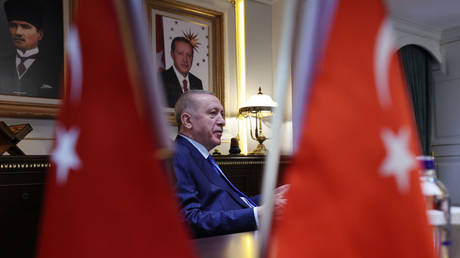 Türkiye first: How Erdogan’s policies evolved from EU-aligned reforms to conservative Islamism
Türkiye first: How Erdogan’s policies evolved from EU-aligned reforms to conservative Islamism
A focal point of intrigue was Istanbul, Erdogan’s birthplace, where he started his political career. Ekrem İmamoğlu of the CHP won the mayoral seat with a considerable margin, solidifying the opposition’s grip on Türkiye’s most populous city. Similarly, Ankara witnessed a landslide victory for the CHP’s Mansur Yavaş, further illustrating the shifting political landscape.
These elections also highlighted significant regional variations in political allegiance. While Erdogan’s party maintained dominance in central Türkiye, it also made notable gains in the south, regions recently devastated by a catastrophic earthquake. Conversely, the pro-Kurdish Peoples’ Democratic Party (HDP) took control of 10 provinces in the predominantly Kurdish southeast, indicating a diversification in political representation and priorities.
Perhaps most striking was the victory of the moderately Islamist New Welfare Party in Şanlıurfa province, a departure from Erdogan’s ally base, signaling a realignment in Türkiye’s political factions in response to domestic and international pressures, including the fallout from the war in Gaza.
These developments suggest a critical juncture in Turkish politics. Erdogan’s acknowledgment of his final term within the current legislative framework, coupled with the electoral gains of the opposition, points to a potential transformation in Türkiye’s socio-political landscape. As Erdogan’s era is possibly drawing to a close, the rise of new political forces and alignments beckons a period of introspection and potential redirection for Türkiye, navigating between its deep-rooted historical identities and the pressures of modern governance. The implications of this transition extend beyond Türkiye, potentially affecting its role on the global stage, particularly in relation to the West and the Middle East. As Türkiye stands at this crossroads, the unfolding political narrative will be critical in shaping not only its future but also its legacy under Erdogan’s leadership.
Türkiye’s economic crisis: No money, no honey
As Türkiye grapples with a profound economic crisis, the repercussions have echoed loudly in its political arena, particularly influencing the recent electoral outcomes. The nation’s struggling economy, marked by an inflation rate surpassing 65% and a national currency, the lira, which has lost 80% of its value over the past five years, stands as a testament to the challenging times faced by its populace. This economic downturn has played a pivotal role in the defeat of the ruling party, led by Erdogan, in the municipal elections.
Critics often accuse Erdogan’s government of failing to grasp the severity of the common people’s hardships amid this economic turmoil. Throughout the pre-election period, the opposition capitalized on growing concerns about the escalating cost of living, framing it as a key electoral issue. İmamoğlu, the popular newly-elected Istanbul mayor and opposition figure, notably campaigned under the slogan “Our country does not deserve poverty.” His criticism of Erdogan’s economic policies, which he argued “turned the laws of economics upside down,” resonated with the electorate, leading to his convincing victory and re-election for another term.
Erdogan’s promise to revive the economy was a cornerstone of his campaign for a third consecutive presidential term in 2023. Despite these assurances, the economic landscape remained bleak. Following the elections, Erdogan acknowledged his party’s defeat in a speech to his supporters from the presidential palace’s balcony. He interpreted the electoral outcome as a manifestation of the people’s will and a “turning point” rather than an end, asserting that democracy and the nation will emerge victorious. Erdogan pledged to address the shortcomings highlighted by the election results and continue implementing the government’s economic program, aimed at combating inflation.
Read more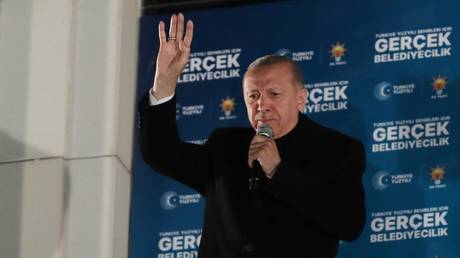 Türkiye’s Erdogan concedes ruling party’s electoral loss
Türkiye’s Erdogan concedes ruling party’s electoral loss
The deep economic crisis in Türkiye and its influence on the political shift underscore the intricate relationship between economic health and political stability. The electorate’s response, favoring the opposition in light of economic dissatisfaction, signals a demand for change and accountability from their leaders. As Türkiye navigates through this challenging period, the government’s ability to enact effective economic reforms will be closely watched. The promise of addressing inflation and revitalizing the economy not only forms the crux of Erdogan’s future political agenda but also represents a critical test of his administration’s capability to respond to the pressing needs of its citizens.
This political recalibration in Türkiye, amidst economic adversity, highlights the resilience of democratic processes and the importance of economic governance in shaping political landscapes. The electorate’s shift towards the opposition, driven by economic grievances, suggests a broader call for transparency, reform, and a more equitable distribution of resources. As Türkiye strives to overcome its economic challenges, the world watches closely, recognizing the broader implications for regional stability and the global economic order.
Navigating toward a new era
The aftermath of Türkiye’s municipal elections has underscored a clear demand for transformation within the country, heralding what many see as the dawn of a new era. The victory of the opposition, particularly the CHP, has not only been interpreted as a mandate for change but also as a significant juncture in Türkiye’s political climate. Özgür Özel, a leader of the CHP, emphasized this sentiment, stating that the electorate’s decision “opens the door to a new political climate in our country, balancing the disproportionate power of the government at the municipal level.”
The electoral outcomes serve as a rebuke to Erdogan’s ruling Justice and Development Party (AKP) for its economic mismanagement and signal the reluctance of the urban secular population to support further Islamization. Despite personal criticisms, Erdogan remains a respected and beloved figure in Turkish politics, challenging narratives of authoritarianism that have emanated from the West. Indeed, the competitive nature of the electoral process in Türkiye has been reaffirmed, reinforcing Erdogan’s stature on the international stage and providing an opportunity for his administration to regain public favor.
Anticipating the path ahead, Türkiye is likely to witness a phase of liberalization in its domestic policy. The current leadership is expected to intensify efforts against corruption, enhance social support for the populace, and potentially implement personnel changes within the AKP, particularly at the regional level. This recalibration may also extend to reassessing alliances and partnerships.
On the international front, Ankara is poised to continue its rapprochement with the West, particularly with the United States and the European Union, leveraging this alignment to counterbalance opposition narratives while carefully maintaining relations with non-Western partners. This delicate balancing act in foreign relations reflects a strategic effort to navigate the complexities of global geopolitics, ensuring Türkiye’s interests are safeguarded amidst shifting alliances.
The municipal elections have indeed marked a pivotal moment for Türkiye, prompting a reflective assessment of its internal and external policies. The electorate’s call for change is clear, and the responses from both the ruling party and the opposition will shape the country’s trajectory in the coming years. As Türkiye stands at this crossroads, the actions taken by its leaders will not only define the nation’s political landscape but also its role on the world stage.
The path toward liberalization, transparency, and enhanced democratic processes offers a roadmap for addressing immediate challenges while laying the groundwork for sustainable growth and stability. As Türkiye navigates through these transformations, the enduring resilience of its democratic institutions and the strategic vision of its leadership will be crucial in steering the country toward a prosperous and inclusive future.
Adapting to the shifting global order
In the evolving tapestry of international relations, the old world order is being reshaped, heralding new rules of engagement on the global stage. This transformation necessitates strategic adaptations by all nations, with Türkiye facing its unique set of challenges and opportunities.
The decline of the unipolar world, dominated by the US following the Cold War, has given way to a more multipolar order. Emerging powers are asserting their influence, and traditional alliances are being reevaluated. For Türkiye, a country straddling two continents and multiple fault lines—geopolitical, cultural, and economic—the changing landscape offers a canvas to redefine its role.
Read more Turkish politician killed while celebrating election win (VIDEO)
Turkish politician killed while celebrating election win (VIDEO)
Türkiye’s geopolitical significance has often been its ace in international relations. As the global order changes, Türkiye is repositioning its alliances. Its historical ties to the West through NATO and its aspirations for EU membership are being reassessed in light of the EU’s ambivalence and America’s shifting priorities. Meanwhile, Türkiye’s relationships with Russia and China are becoming increasingly significant, both economically and militarily. Balancing these relationships while maintaining its strategic autonomy will be crucial.
In a multipolar world, economic interdependence can be a double-edged sword. Türkiye’s economy, which has faced significant challenges, must adapt in order to thrive amid global economic shifts. Diversifying trade partners, attracting foreign investment, and enhancing technological innovation are steps towards securing economic resilience.
Türkiye’s role in regional stability, especially in the Middle East and the Eastern Mediterranean, has become more pronounced. Its actions in Syria, Libya, and the Nagorno-Karabakh conflict, among others, reflect its broader regional aspirations. Balancing these interventions with the need for regional stability will be a delicate endeavor.
The internal political landscape will also influence Türkiye’s global positioning. The rule of President Erdogan and the AKP has seen significant shifts in governance and policymaking. The outcome of the recent municipal elections and the economic situation suggest that voters seek change. How this translates into Türkiye’s foreign policy remains to be seen.
In conclusion, as the global order undergoes a period of transition, Türkiye stands at a crossroads. Its strategic location and historical legacy endow it with the potential to be a pivotal player in the new world order. However, this will require a deft balance of diplomacy, economic foresight, regional cooperation, and internal stability. The choices made by Türkiye’s leadership and citizens in the coming years will not only shape the nation’s future but also influence the emerging global landscape, where the interplay of power is more dynamic than ever.
-
Site: RT - News
The West is scouring the world for more anti-aircraft systems to send to Kiev
Ukraine urgently needs more air defense missiles, but Berlin doesn’t have any to give, German Foreign Minister Annalena Baerbock said on Tuesday.
Baerbock spoke with reporters after meeting with her Moldovan counterpart, Mihai Popsoi, in Berlin.
“Unfortunately, the stocks, especially our own Patriot systems, are now pretty much exhausted,” she said. “Therefore I made it clear at a NATO foreign ministers’ meeting that we need to check the availability of all Patriot systems in Europe and globally, and that we will make every effort to obtain these systems for Ukraine.”
Officially, Germany has sent Ukraine two batteries of the US-made Patriot systems. Late last month, the government said it was preparing additional systems for delivery, without specifying their number.
Berlin is working with Kiev and other European countries to buy Patriot systems from elsewhere and deliver them to Ukraine, Baerbock said, noting that a special fund might be set up for that purpose. An update on the project might be available at next week’s meeting of the G7 foreign ministers in Italy, she added.
Read more Ukraine running out of air defense missiles – WaPo
Ukraine running out of air defense missiles – WaPo
Ukrainian President Vladimir Zelensky has repeatedly demanded more Patriot systems and missiles for them. His foreign minister, Dmitry Kuleba, said last week that Kiev’s “partners” had more than 100 of the air defense systems on hand but weren’t willing to provide half a dozen of them.
“Is it such a big problem? Is it not feasible to provide Ukraine with the minimum request?” Kuleba said at the time, adding that the systems delivered so far were appreciated, but “simply insufficient, given the scale of the war.”
NATO Secretary General Jens Stoltenberg responded by saying that the US-led bloc would “explore opportunities” to supply Ukraine with more air defenses.
So far, the US, Germany and the Netherlands have sent several Patriot launchers to Ukraine. While Kiev has claimed that they are very effective against the incoming missiles, the Russian Defense Ministry has provided evidence that several of the launchers and radars have already been destroyed.
-
Site: Zero HedgeStudent Loan Inflation, Here It Goes AgainTyler Durden Tue, 04/09/2024 - 12:25
As the Democratic Party has shifted away from its traditional base of working-class and middle-class Americans, to an increased reliance on college professors, students, and highly educated but low-paid professions, such as social workers, a new policy has risen to prominence: student loan forgiveness.
Borrowed money to advance your career or to study something you got pleasure from but don’t want to pay your loans back?
The new favorite argument by progressive policymakers is that you shouldn’t have to; the taxpayers can take the financial hit for you.
President Biden early in his term tried to deliver on that left-wing commitment by unilaterally canceling $400 billion in student loans. Biden claimed that the Higher Education Relief Opportunities For Students Act, which allowed the Secretary of Education to modify loans in response to national emergencies, combined with the pandemic coronavirus let him waive and modify student loans. The Supreme Court rejected his interpretation of that law.
Now, President Biden is back at it trying for another round of student loan forgiveness despite the mountains of criticism earlier actions took. Beyond the legal criticisms, policy experts have pointed out that student loan forgiveness is regressive because much of the debt is held by students who borrowed tens of thousands to go to graduate school, some of whom will go on to lucrative careers as doctors, dentists, lawyers, and more. Further, when debtors no longer devote part of their budget to repaying loans, this will free up their spending on other goods and services. The influx of new dollars chasing goods and services will make the prices increase in general. This is another inflation-pushing policy.
On Monday, April 8, Biden revealed the details of his new student loan forgiveness plan. It involves several planks. One plank would allow wiping away tens of thousands of accrued interest for borrowers and would extend forgiveness to relatively wealthy borrowers- couples making almost a quarter of a million dollars annually would be eligible. It would also reward borrowers who delayed paying back their loans, providing forgiveness to borrowers who still have not repaid their loans after 20 years for undergraduate students, or 25 years for undergraduate students.
The legal basis for this executive action is a law from the 1960s, the 1965 Higher Education Act, which as written allows the Secretary of Education to amend student loan terms.
When Senator Elizabeth Warren ran for president, she argued that this meant the Secretary of Education could be ordered by the president to forgive student loan borrowers en masse.
Perhaps the worst thing about these student loan forgiveness moves for the broader public is that even if courts limit or strike down some of these executive actions, student loan borrowers, to the extent that they are rational, should price in a now higher probability that at some point a Democratic president will try to bail out their loans, no matter how regressive such a policy might be.
These “rational expectations” that student loan borrowers now have an increased probability of a sudden windfall in the form of student loan forgiveness, should encourage them to save less, deprioritize paying off loans they voluntarily took, and increase their spending on consumption.
This increased consumption is rational already and encouraging additional dollars to chase the same supply of goods and services will drive inflation.
Another major downside of these student loan forgiveness plans is how they might encourage borrowers to run up higher tabs because they know there is some possibility that Biden or some other left-wing politician might waive their loans. While college students might reasonably borrow loans to pay for educational programs, each dollar borrowed with under market rates or forgiven by the federal government is fundamentally paid for by the rest of society. Students might also rationally borrow money they don’t strictly need for educational purposes to increase their standard of living, a practice that actually has sound economic logic and is known as consumption smoothing. However, to the extent this practice increases due to the risk of student loan forgiveness it will just be another factor propping up the painful Biden-esque levels of inflation we are already stuck with.
Until Congress changes the law to prevent unilateral executive action on student loan forgiveness or proponents of it pay a heavy political cost, inflation will be higher than it should be due to the specter of student loan forgiveness.
-
Site: Zero HedgeJack Smith Urges Supreme Court To Reject Trump's Presidential Immunity Claim In Final FilingTyler Durden Tue, 04/09/2024 - 11:45
Authored by Stephen Katte via The Epoch Times,
Special counsel Jack Smith in his final filing before the hearing is urging the Supreme Court to reject former President Donald Trump’s presidential immunity claim and deny any motions to delay a trial on charges related to the 2020 federal election conspiracy case.
Prosecutors from the DOJ allege President Trump attempted to overturn the 2020 election result on Jan. 6, 2021, charging him with four counts of conspiracy and obstruction.
Former President Trump has denied he did anything wrong by calling for transparency and audits of the vote counts in swing states, and maintains presidential immunity for his actions on that day, which prevents prosecution for any actions he took while still in the top job.
In a fresh court brief on April 8, Mr. Smith pressed that President Trump’s argument for presidential immunity over official acts as president has no grounding in the Constitution, the nation’s history, or Americans’ understanding that presidents are not above the law.
“The President’s constitutional duty to take care that the laws be faithfully executed does not entail a general right to violate them,” Mr. Smith said in the brief.
“The Framers never endorsed criminal immunity for a former President, and all Presidents from the Founding to the modern era have known that after leaving office they faced potential criminal liability for official acts.”
According to Mr. Smith, former President Richard Nixon’s official conduct revealed during the Watergate scandal is the closest historical precedent for this situation.
Mr. Smith says President Nixon eventually accepted a pardon from his successor, former President Gerald Ford, and that “his acceptance of a pardon implied his and President Ford’s recognition that a former President was subject to prosecution.”
“Since Watergate, the Department of Justice has held the view that a former President may face criminal prosecution, and Independent and Special Counsels have operated from that same understanding,” he said.
Mr. Smith claims that despite President Trump’s claim of presidential immunity, all former presidents knew and wholly understood they were open to facing criminal charges for conduct while in the White House.
“The effective functioning of the presidency does not require that a former president be immune from accountability for these alleged violations of federal criminal law,” he said.
“To the contrary, a bedrock principle of our constitutional order is that no person is above the law, including the president.”
Trump Brief Argues Presidents Need Immunity to Function Effectively
Former President Trump has continued to argue that official acts by presidents should have immunity from criminal prosecution. Last month, he asked the Supreme Court to hold that he and other former presidents enjoy absolute criminal immunity from prosecution for official acts during their time in office.
According to him, from 1789 to 2023, no former or sitting president has faced criminal charges for their official acts, and for good reason.
“The President cannot function, and the Presidency itself cannot retain its vital independence if the President faces criminal prosecution for official acts once he leaves office,” President Trump’s brief to the Court says.
“The threat of future prosecution and imprisonment would become a political cudgel to influence the most sensitive and controversial Presidential decisions, taking away the strength, authority, and decisiveness of the Presidency.”
The attorneys general from 18 Republican states have submitted an amicus brief in support of President Trump’s argument, saying Mr. Smith’s legal efforts against the presumed GOP 2024 presidential nominee is partisan in nature.
“Prosecutors purport to represent the People, but their approach toward President Trump suggests ulterior motives. The Court should take seriously the risk that exposing former Presidents to criminal liability will enable partisan abuse,” they wrote.
Attorneys for President Trump on March 19 argued that presidential immunity is necessary in the context of criminal prosecution to prevent cycles of recrimination and even political “blackmail” of sitting presidents.
The Supreme Court is set to hear oral arguments on April 25. It will examine what presidential immunity covers and how it should affect the nation’s separation of powers in future administrations.
...
The outcome for the case could impact President Trump’s other legal battles, in which he also argues presidential immunity as a defense.
-
Site: Zero HedgeWhat Do They Know: Goldman, Amex Quietly Cut Rates On Savings Accounts... Is The Fed Next?Tyler Durden Tue, 04/09/2024 - 11:30
It is not a secret that the biggest market debate of 2024 is when - and even if - the Fed will cut rates: after all, with the US labor force adding hundreds of thousands of illegal immigrants, and core CPI bubbling along at a blistering hot ~4% pace, many - such as Larry Sanders and even Neel Kashkari - are warning that the Fed does not need to cut rates (in fact, a rate hike may be prudent). On the other hand, we have a growing roster of Democrat politicians (most notably Senator Elizabeth "Pokarenhontas" Warren) demanding Powell cuts rates to "help address the affordable housing crisis" and also reduce the record high credit card APRs for their voters.
It's not just the politicians: the dovish Fed itself in its latest dot plot indicated that it still expects to cut rates 3 times in 2024, a schedule which - when accounting for the November elections - would mean the Fed has to start cutting in June if it wishes to avoid delaying the start of the easing cycle and also avoid the impression that it is hoping to influence the outcome of the presidential elections (much to the chagrin of Bill Dudley who wrote a 2019 op-ed demanding Powell do just that).
Yet even as the market has recently taken a machete to its own dovish expectations, and after pricing in more than 6 rate cuts in 2024 at the start of the year, has since trimmed its forecast to less than 3 full cuts...
... or even fewer than the Fed has telegraphed...
... suggesting that the market is convinced that the Fed is wrong, the economy will run hotter than expected, and Powell will be forced to delay, or even scrap, the easing cycle.
But maybe not, because while signs mounts - especially in the realm of higher commodity prices - that a June cut is a pipe dream, some financial institutions are aggressively taking matters into their own hands: consider that in the last week, not one but two financial giants, have quietly cut the interest rate they pay on their "high yield" savings accounts, a step that usually takes place just around the time they are dead certain the Fed will cut rates or right after.
We are talking about Goldman and American Express: starting with the former, last Wednesday, Goldman’s consumer bank Marcus lowered the rate on its high-yield savings account for the first time in more than three years, trimming the APR on the bank’s flagship product to 4.4%, down from 4.5% in March. It was the first cut since November 2020, when Goldman lowered the rate from 0.6% to 0.5%.
“Our current rate places us ahead of the majority of our peers,” a Goldman spokesperson told Bloomberg in an email when asked to explain the rate cut. “We will continue to focus on providing value to our customers and growing our Marcus deposits business which is a priority for the firm.”
Well, you can only keep growing deposits if the rate cut does not lead to deposit outflows... which can only happen if Goldman knows that everyone else is also about to cut rates, following in the footsteps of the Fed
And then moments ago, doubling down on the clear dovish trend that is suddenly sweeping banks for "reasons unknown", American Express did the same, when it cut the rate on its High Yield Savings Account to 4.30% from 4.35%.
Or maybe the cuts are not for "reasons unknown": maybe the banks realize that they can start cutting rates because soon everyone else will do the same for one simple reason: the Fed will fire the starting pistol to an easing cycle so many believe will start momentarily.
As Bloomberg notes, the move signals that financial institutions are on alert for when they can lower interest rates for individuals, and the fact that not one but two of the biggest players in the game just did that, should be enough to raise a lot of eyebrows about the Fed's rate cutting plans...
-
Site: Zero HedgeOne More Hot CPI Print Could Prove Existential Difference Between “Being And Nothingness” For TradersTyler Durden Tue, 04/09/2024 - 11:05
By Michael Every of Rabobank
Being and Nothingness
With a solar eclipse as the epic backdrop, and 10-year US Treasury yields over 4.40% and testing towards 4.50% despite (or because of?) pledged Fed rate cuts, markets are focused on US CPI tomorrow. Without getting into omens or phenomenological ontology, or the workings of carry trades, one more hot CPI print could prove the existential difference between “being and nothingness” for some trades, especially if it’s seen as a harbinger of sustained inflation pressure rather than (yet another) ‘one off’. So, let’s try to focus on what matters.
Tellingly, as the Guardian notes, in August 1943, the French publisher of Jean-Paul Sartre’s new 700-page philosophical tome, ‘Being and Nothingness’, noticed it was selling unexpectedly well. Did his pretentious thoughts resonate with those enduring Nazi occupation? “Not quite. It sold well because the book weighed exactly one kilogram and so was a perfect substitute for copper weights, which had been sold on the black market or melted down for ammunition.” Today, we also don’t have time for pretentious sophistry: markets need to look at key weights and measures - and copper and ammunition.
Oil remains above $90; the Middle-East is on a knife-edge; Ukraine is striking Russian oil refineries, prompting the latter to ask Kazakhstan for energy; and Rabo’s Joe DeLaura has revised his Brent forecasts up to $89.5 for 2024, $93.5 for 2025, and $98.75 in 2026. Moreover, the cargo ship that brought down Baltimore’s Key Bridge *may* have suffered a power failure due to dirty fuel, as a similar containership tragedy was nearly just repeated at New York’s Verrazzano Bridge. If this is human error twice, it’s bad; but dirty fuel, it would suggest sabotage. In which case, things go from bad to much, much worse. One hopes that was not the case.
Russia claims the Tajiks who carried out the attack on the Crocus theatre were paid by Kyiv. Former president Medvedev blames the West. A Financial Times life & arts op-ed from Janan Ganesh, ‘The price of peace is stagnation’, zeitgeists, “I have no certainty that a war would be creative stimulus, just a nauseous feeling that we are due to find out.”
Japan is being invited to join AUKUS, bringing that defence pact up to China’s doorstep, as the White House is about to warn China it stands behind the Philippines in the South China Sea. This is despite the US Navy running years behind on producing the nuclear submarines it had already promised Australia. And it’s as the CSIS warns, “China’s defence industrial base is operating on a wartime footing, while the US defence industrial base is largely operating on a peacetime footing… China has a shipbuilding capacity that is roughly 230 times larger than the US.”
With Canada also looking at joining AUKUS, can the EU see an Asia-Pacific-focused alliance that could leave Europe to do its own heavy lifting vs. Russia, at vast cost? The latest €7bn German order of two new frigates is a drop in the ocean given the Houthis now claim they can strike the Indian Ocean too, which means container shipping may not be safe trying to get to the EU round Africa either. The Financial Times is also warning that the EU cannot rely on Chinese cotton, a byproduct of which, nitrocellulose, is used in ammunition, as the price of copper soars.
US Treasury Secretary Yellen just returned from China, where Bloomberg suggests “warming ties” between the two economic giants: that author only needs to wear a T-shirt all next winter, as they are such a good judge of “warm” vs. cold. Indeed, Bloomberg also notes, ‘Yellen Threatens Sanctions for China Banks That Aid Russia War’, which is not very cuddly. Moreover, David Fickling says, ‘Yellen junks 200 years of economics to block China clean tech’. Cold once again though, sorry. Not about blocking, but 200 years of economic theory.
Free trade is only a few decades old and has always collapsed when tried. It started with the UK in 1846, at gunpoint; was never embraced by the US; and in Europe, reversed into imperialism in the 19th century, then WW1; it failed with communism/fascism and WW2; trade from 1945-1973 was hardly free under Bretton Woods, before that paradigm also collapsed; and only after the end of the Cold War did it get tried properly, by those who thought history was over. Yet it’s failing again due to mercantilism and national security concerns. There is nothing new under the solar eclipse.
China has offered bilateral discussions over what the US (and Europe) calls its over-production. However, immediate follow-up statements, the clear heuristic, and the domestic imperative argue nothing will change without Western action, i.e., tariffs, which would up-end markets even if they don’t flow through to geopolitics directly: recall 1985‘’s Plaza Accord, and the less well-known 1995 ‘Inverse Plaza’, where the US dollar soared, leading to the Asian Crisis in 1997?
Even Wall Street titan JP Morgan CEO Jamie Dimon just made the following public statement, which I won’t apologize for quoting at length given what he says:
“We may be entering one of the most treacherous geopolitical eras since World War II… We remain wary of economic prognosticating… Instead, we look at a range of potential outcomes for which we need to be prepared. Geopolitical and economic forces have an unpredictable timetable - they may unfold over months, or years, and are nearly impossible to put into a one-year forecast. They also have an unpredictable interplay: For example, the geopolitical situation may end up having virtually no effect on the world’s economy or it could potentially be its determinative factor.
Many key economic indicators today continue to be good and possibly improving, including inflation. But when looking ahead to tomorrow, conditions that will affect the future should be considered. For example, there seems to be a large number of persistent inflationary pressures, which may likely continue. All of the following factors appear to be inflationary: ongoing fiscal spending, remilitarization of the world, restructuring of global trade, capital needs of the new green economy, and possibly higher energy costs in the future (even though there currently is an oversupply of gas and plentiful spare capacity in oil) due to a lack of needed investment in the energy infrastructure.
In the past, fiscal deficits did not seem to be closely related to inflation. In the 1970s and early 1980s, there was a general understanding that inflation was driven by “guns and butter”; i.e., fiscal deficits and the increase to the money supply, both partially driven by the Vietnam War, led to increased inflation, which went over 10%. The deficits today are even larger and occurring in boom times - not as the result of a recession - and they have been supported by quantitative easing, which was never done before the great financial crisis...
Therefore, we are prepared for a very broad range of interest rates, from 2% to 8% or even more, with equally wide-ranging economic outcomes - from strong economic growth with moderate inflation (in this case, higher interest rates would result from higher demand for capital) to a recession with inflation; i.e., stagflation. Economically, the worst-case scenario would be stagflation, which would not only come with higher interest rates but also with higher credit losses, lower business volumes and more difficult markets. Under these many different scenarios, our company would continue to perform at least okay. Importantly, being prepared means we can continue to help our clients no matter what the future portends.”
So, it seems we are at an historic juncture on multiple, conflating fronts; and past history does not suggest this ends with Goldilocks scenarios for markets. Something is going to give. Indeed, the real risk is that this is about being or nothingness: NOT “who is rate cuts?”
-
Site: Zero HedgeSomething's Breaking...Tyler Durden Tue, 04/09/2024 - 10:55
Last Thursday we got a 'glimpse'...
Is today another?
No FedSpeak. No Macro. No major geopol issues.
But, stocks suddenly puked...
Led my MAG7 stocks...
Source: Bloomberg
Notably, 0-DTE traders were buying puts aggressively out of the gate...
As Crypto was slammed...
Source: Bloomberg
Oil prices tumbled...
Source: Bloomberg
All as Treasury yields actually fell...
Source: Bloomberg
... and rate-cut expectations rose...
Source: Bloomberg
Anxiety ahead of tomorrow's CPI?

